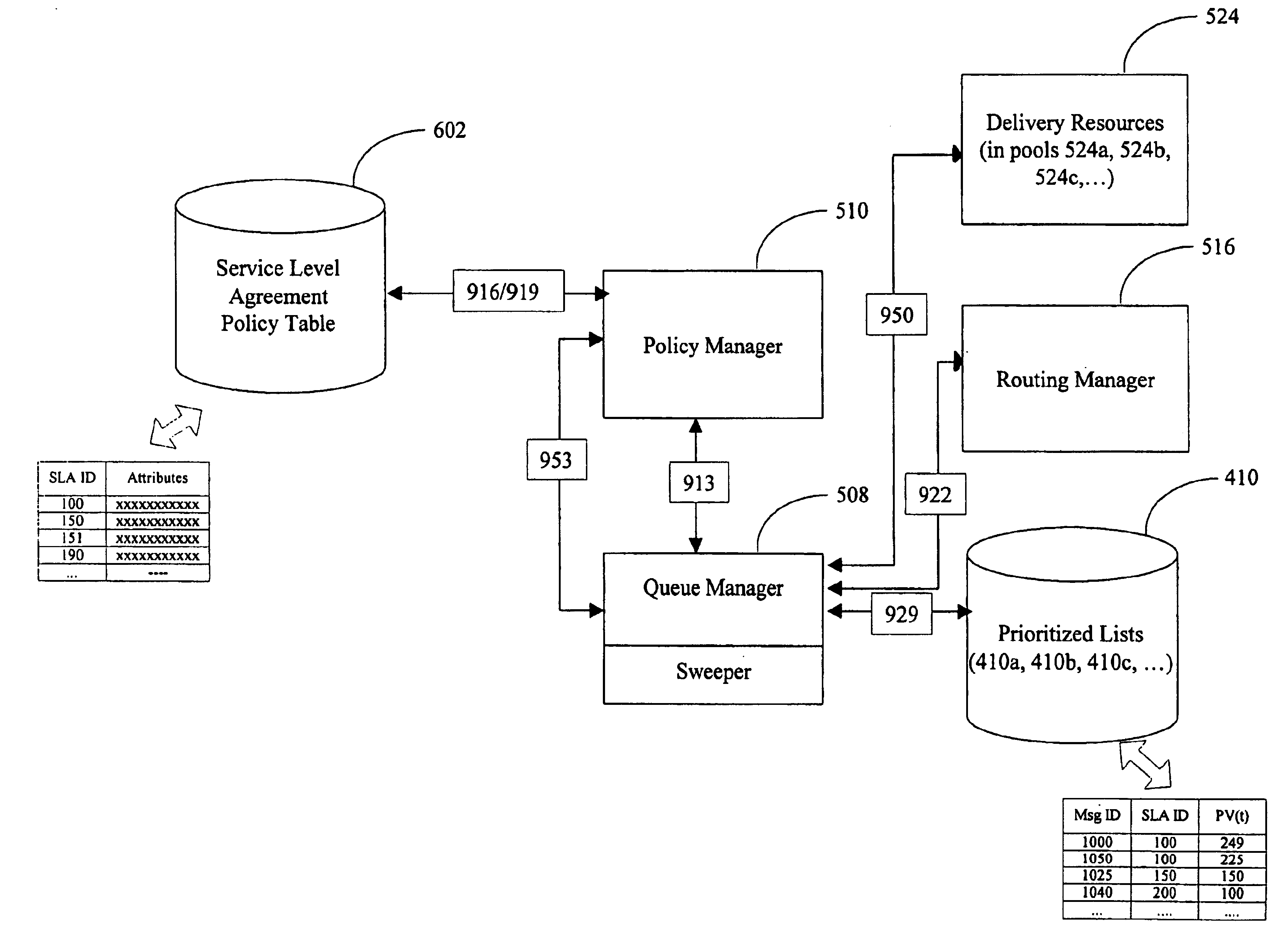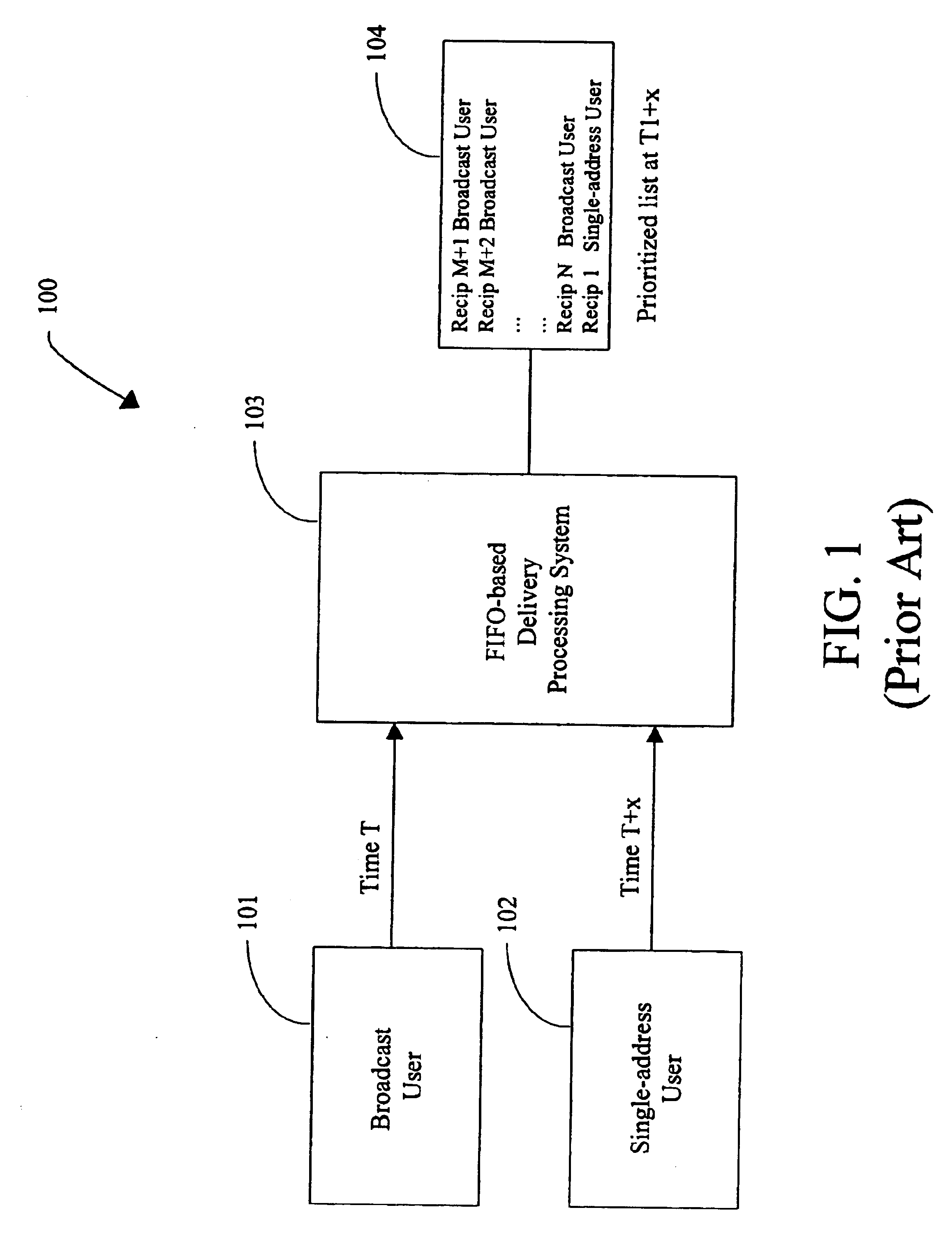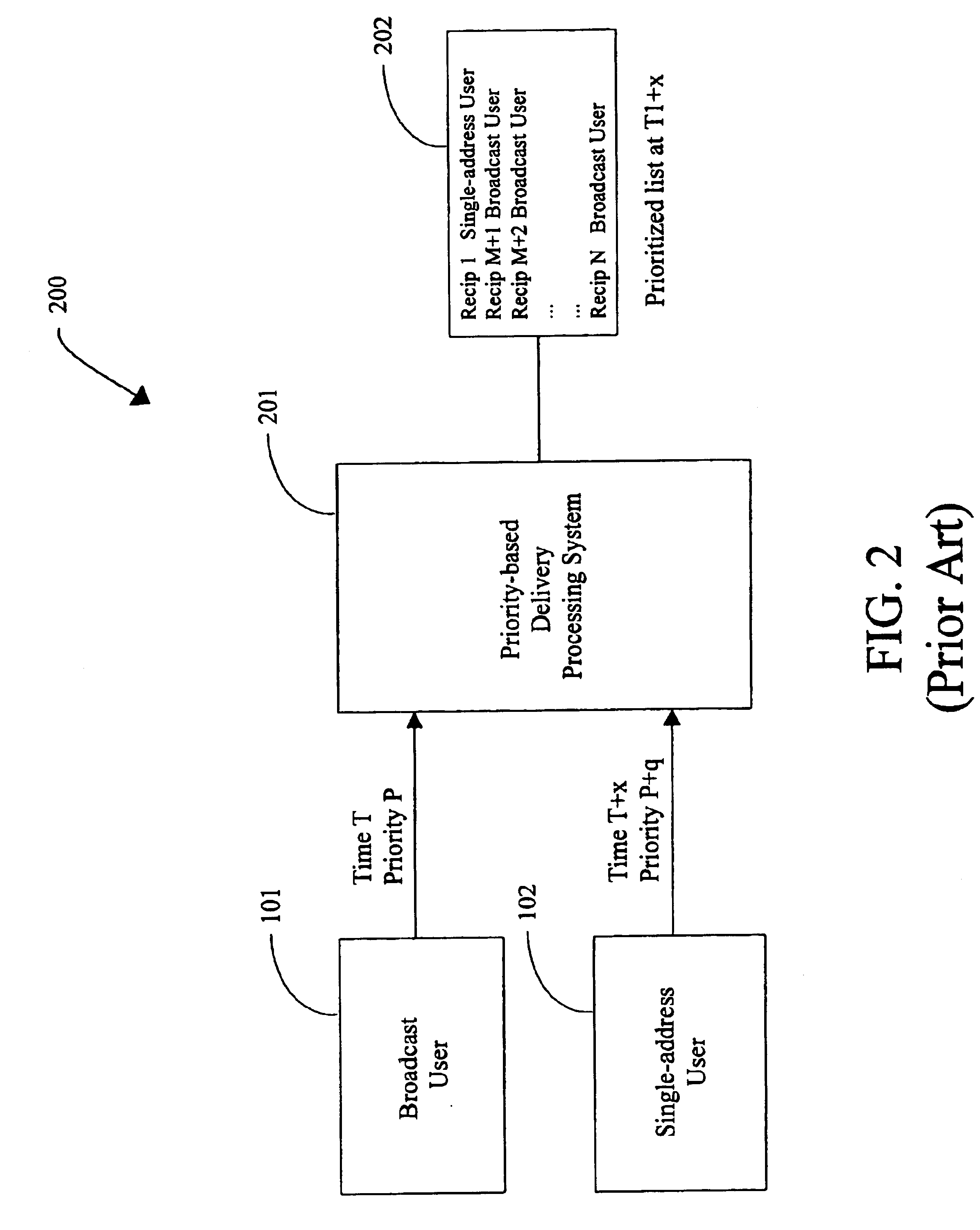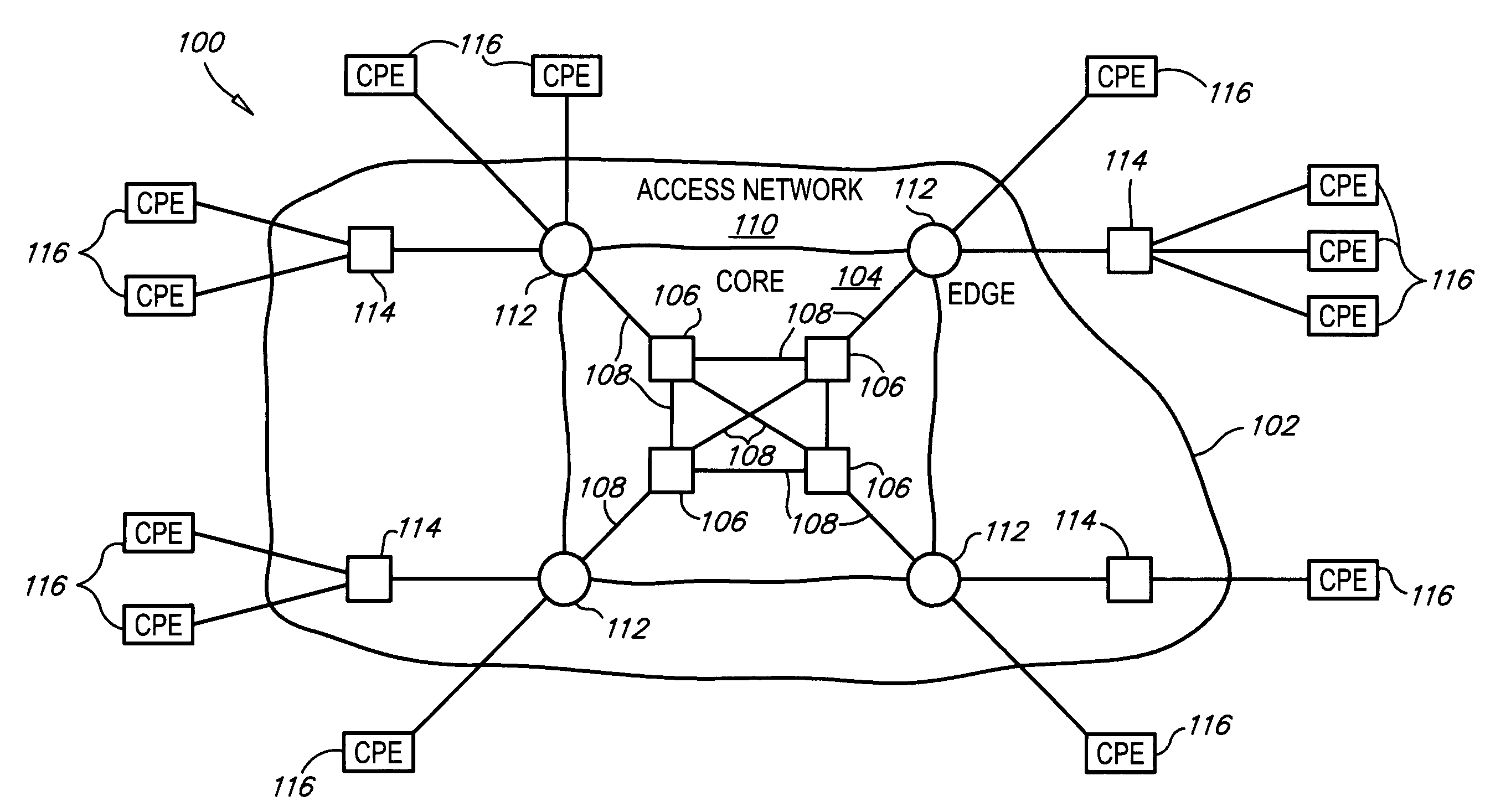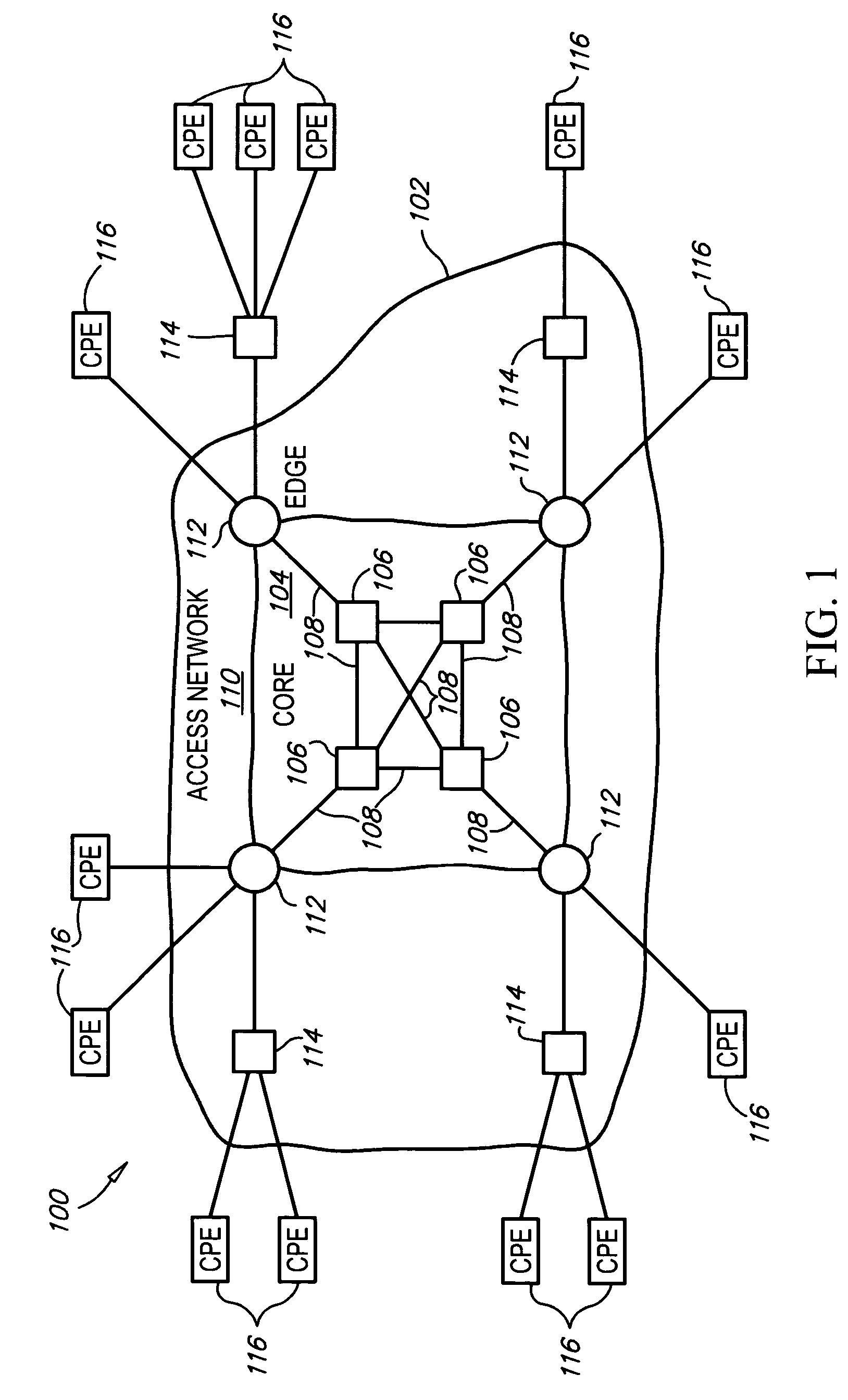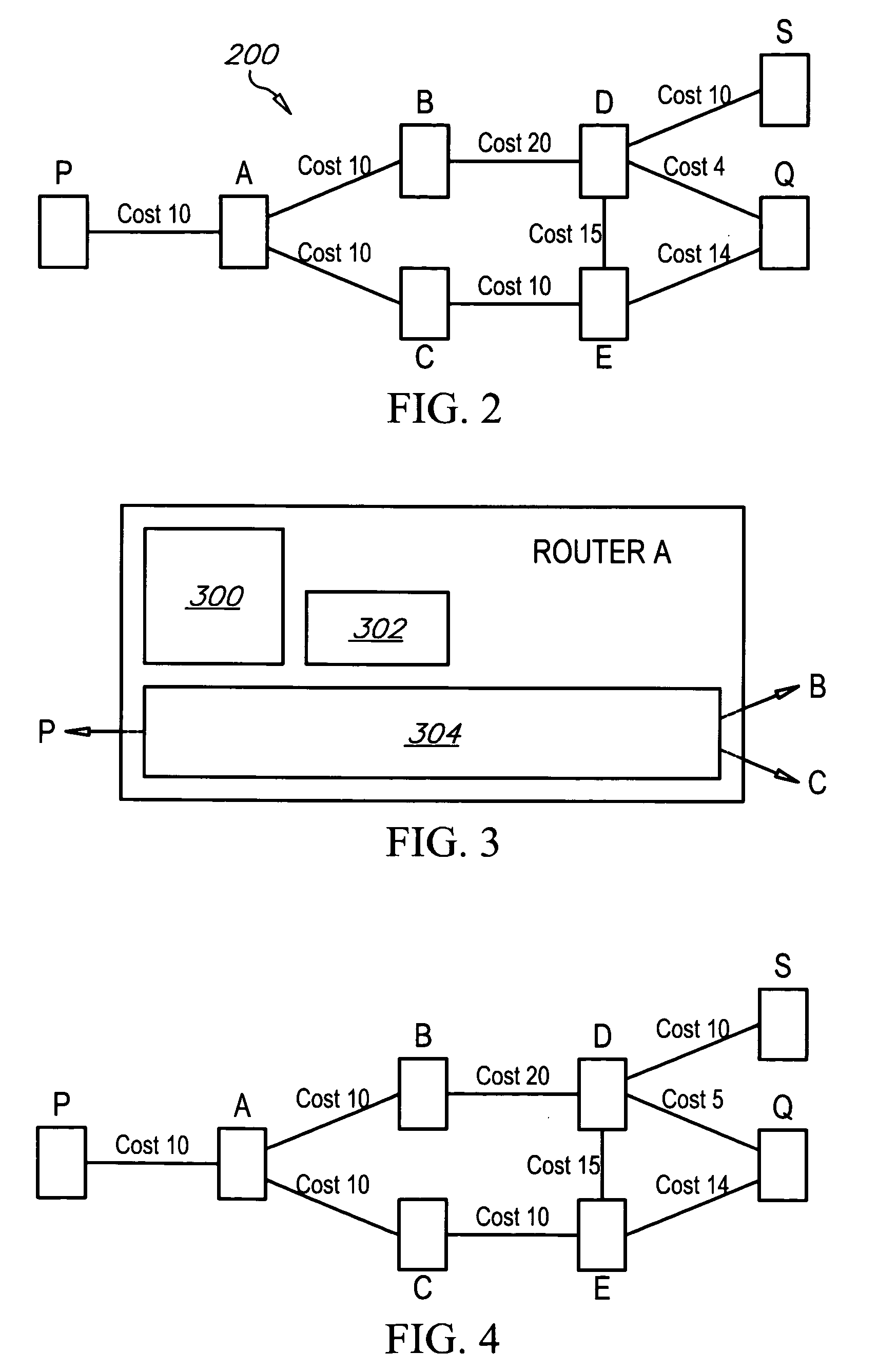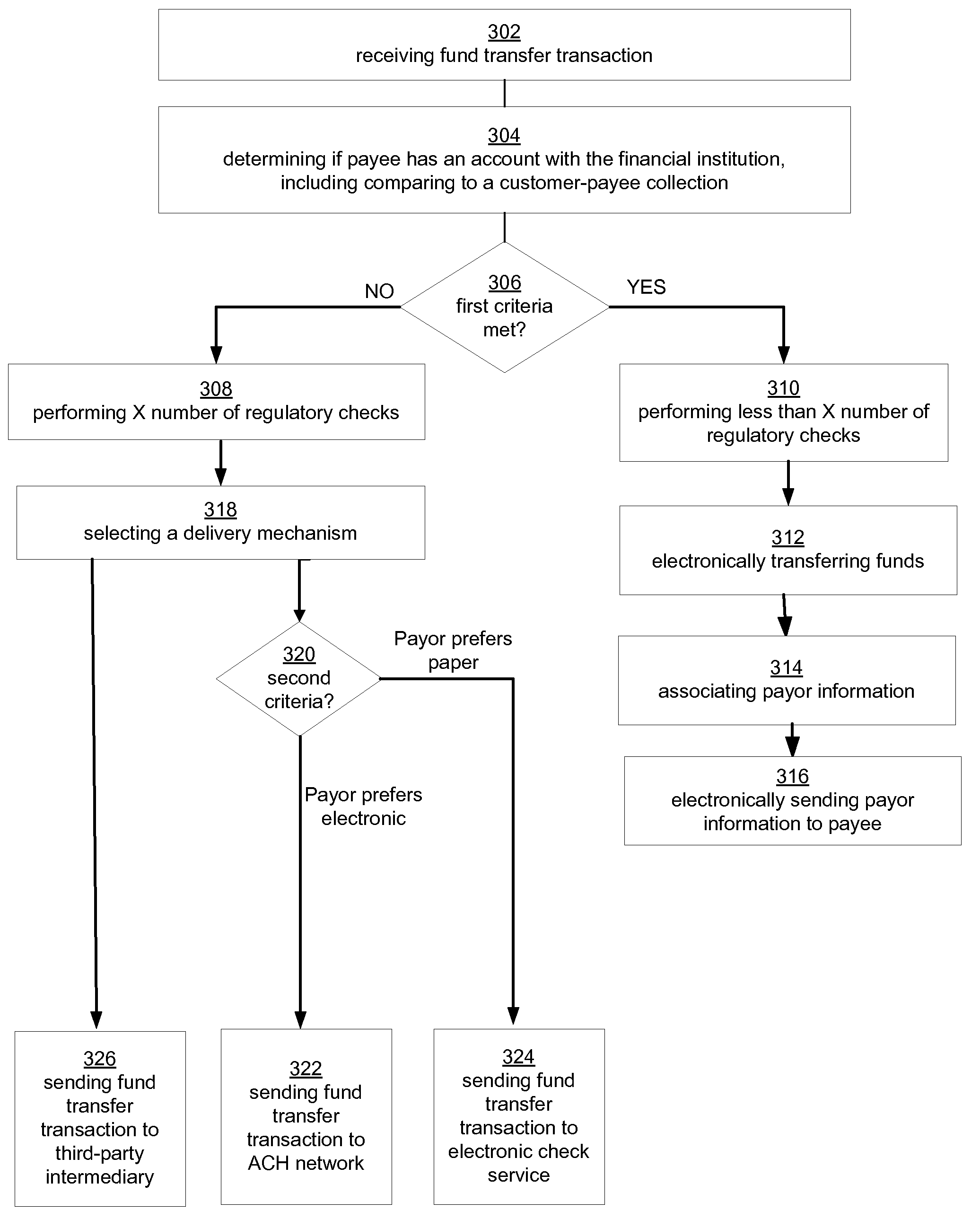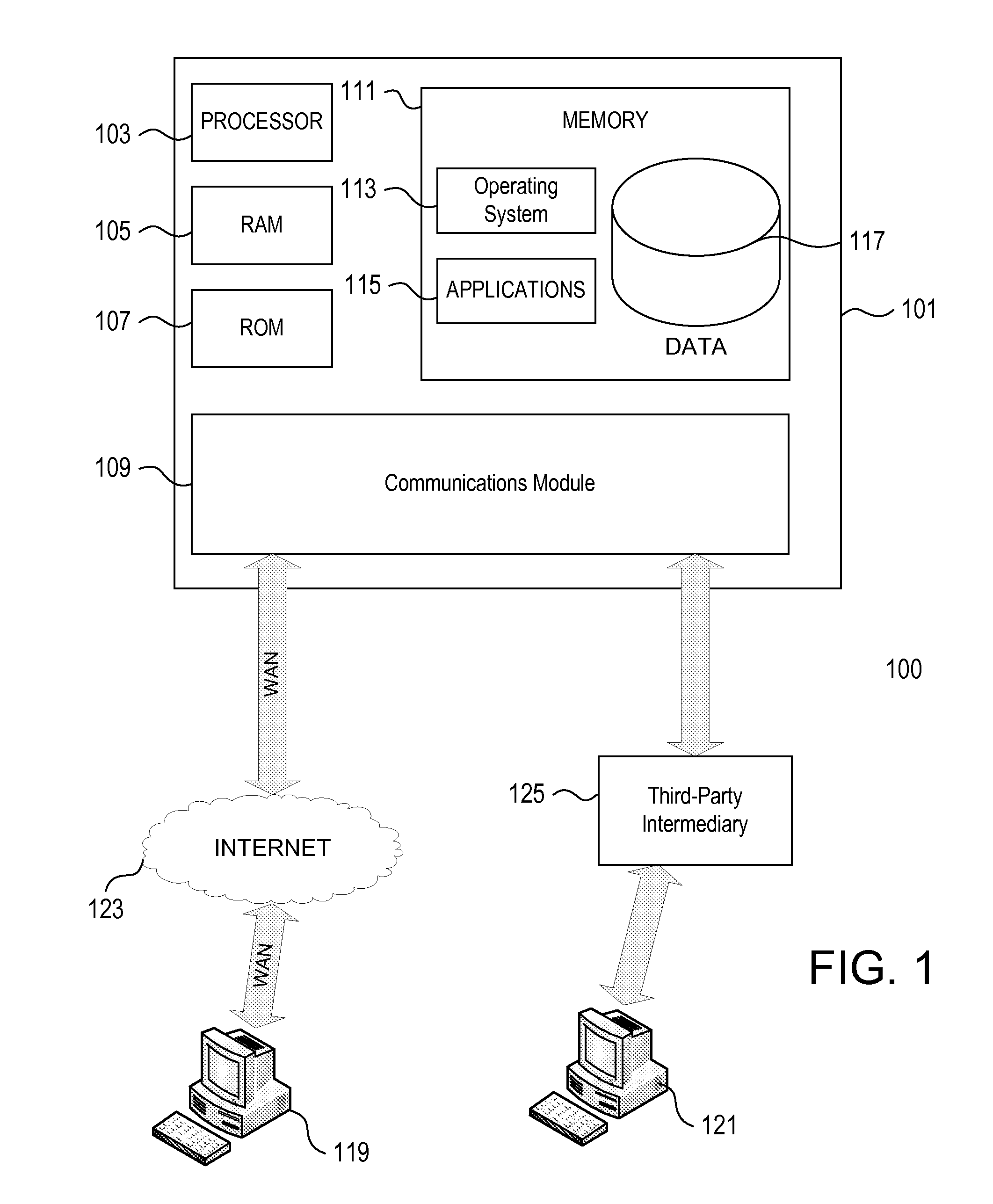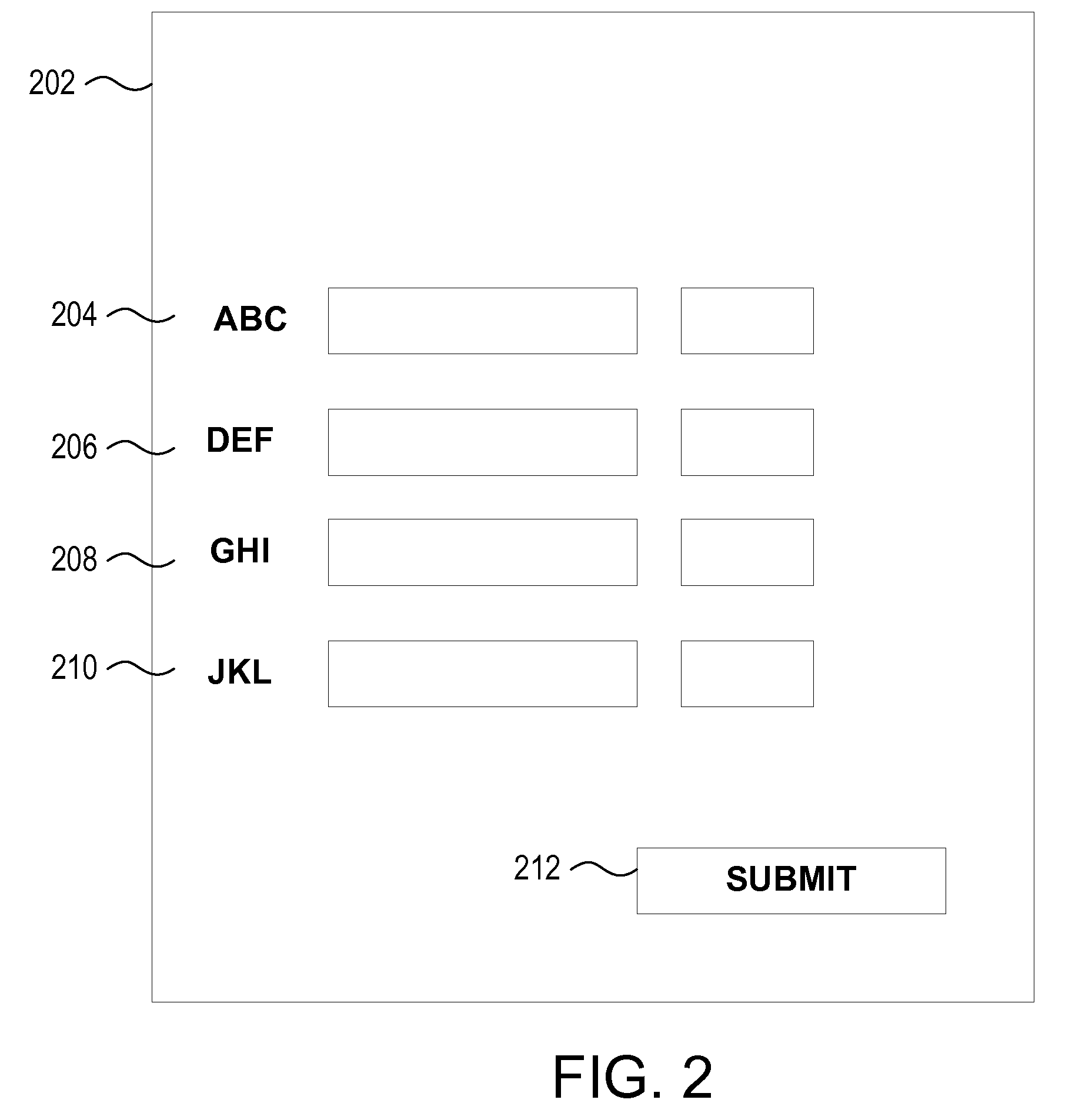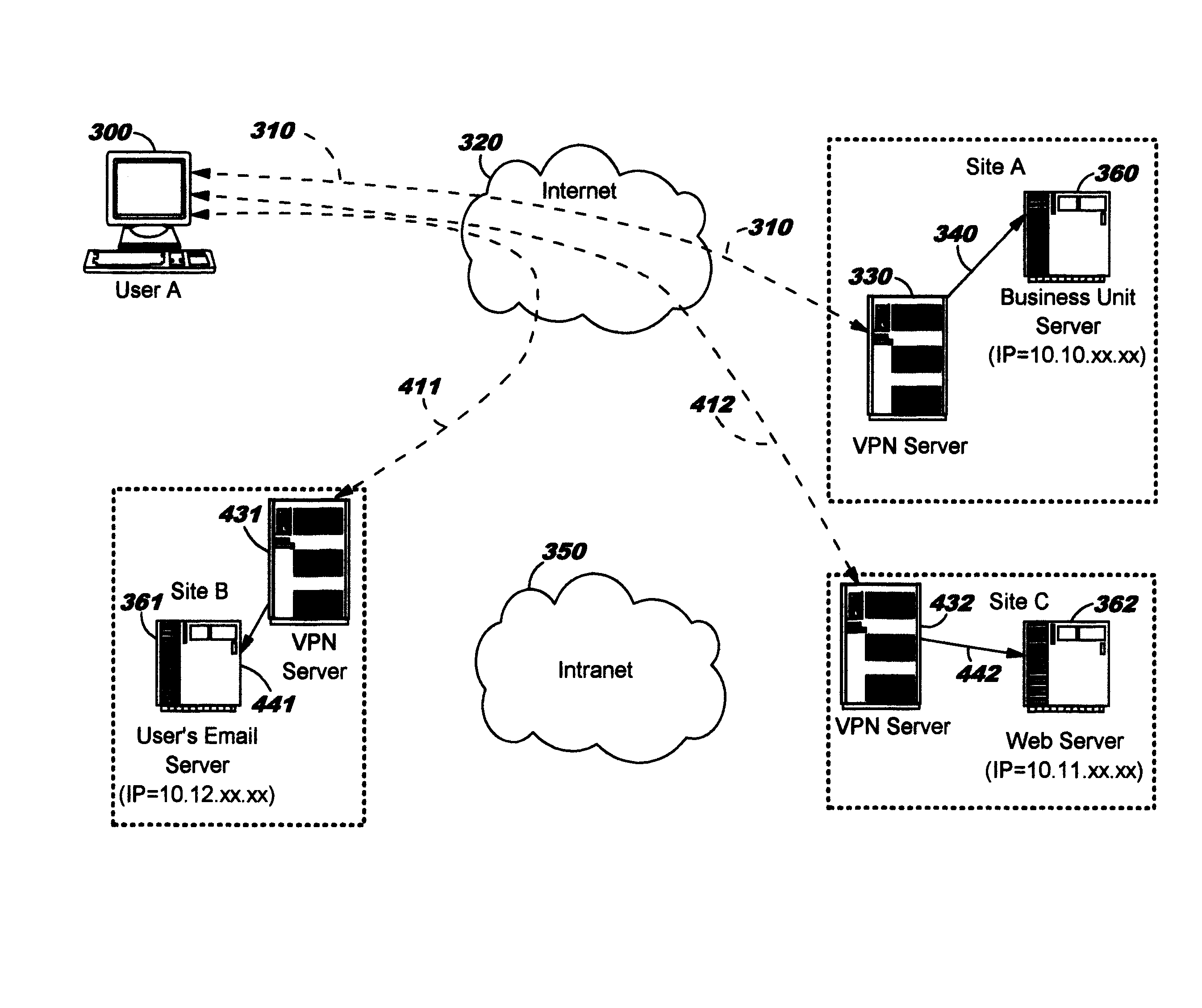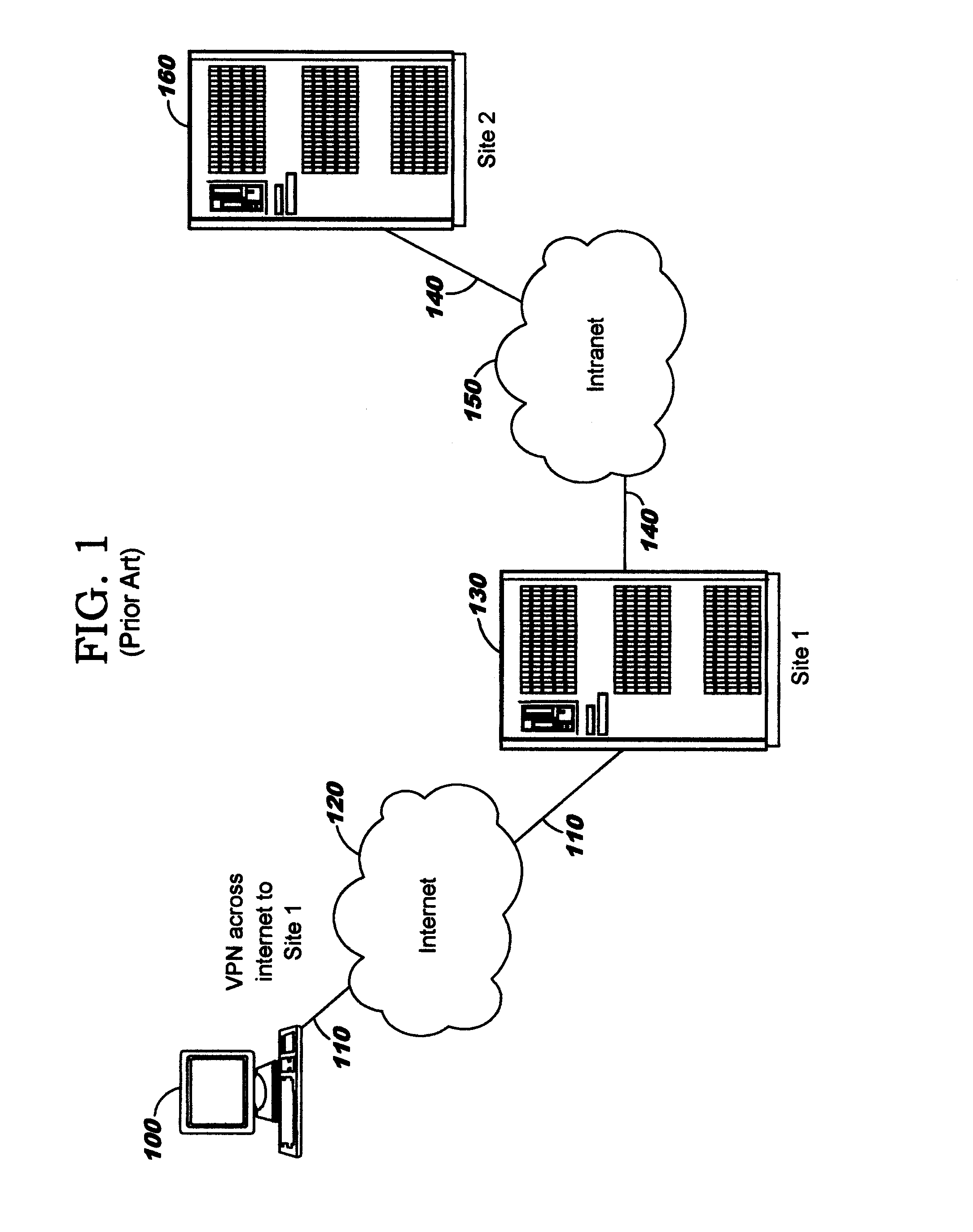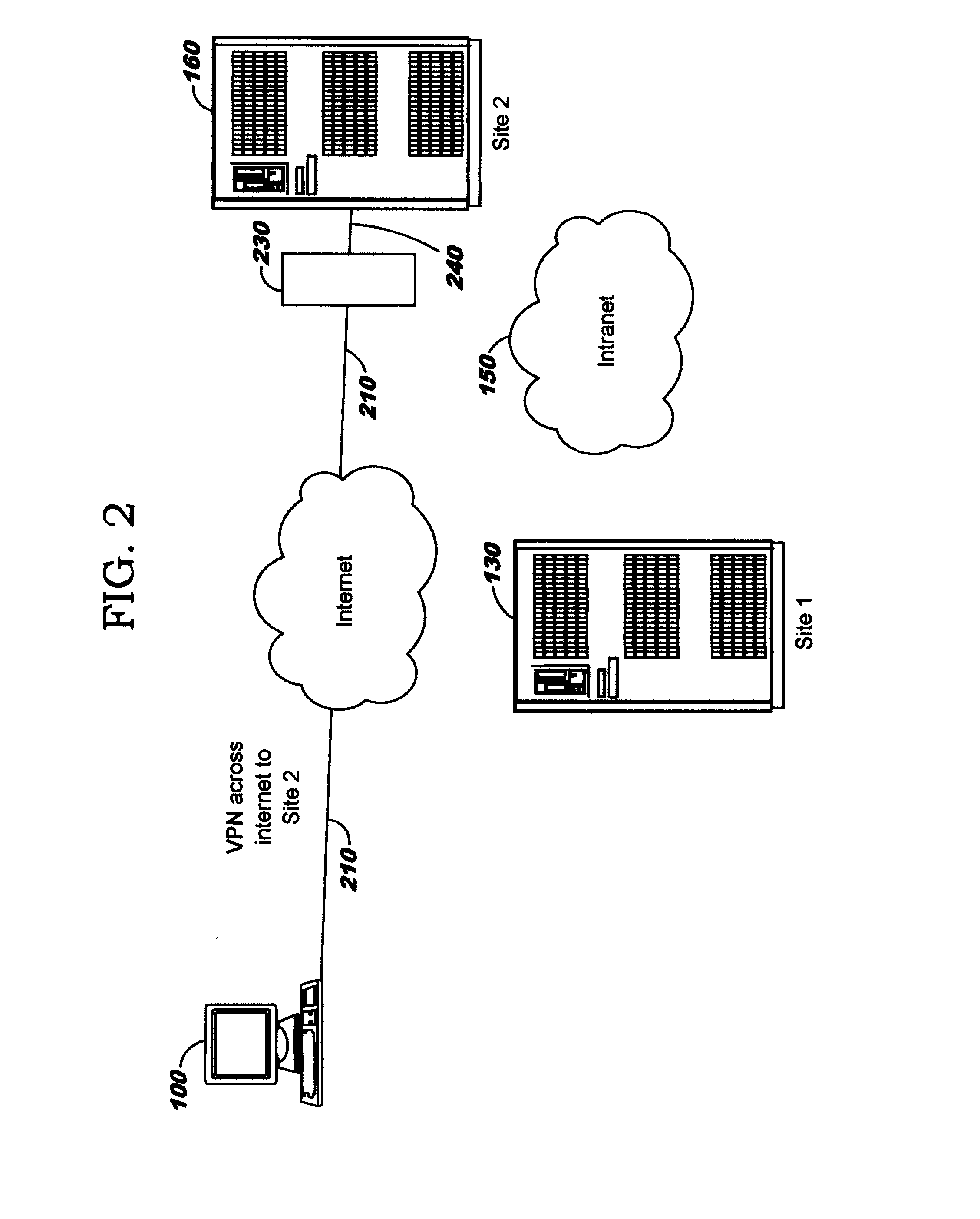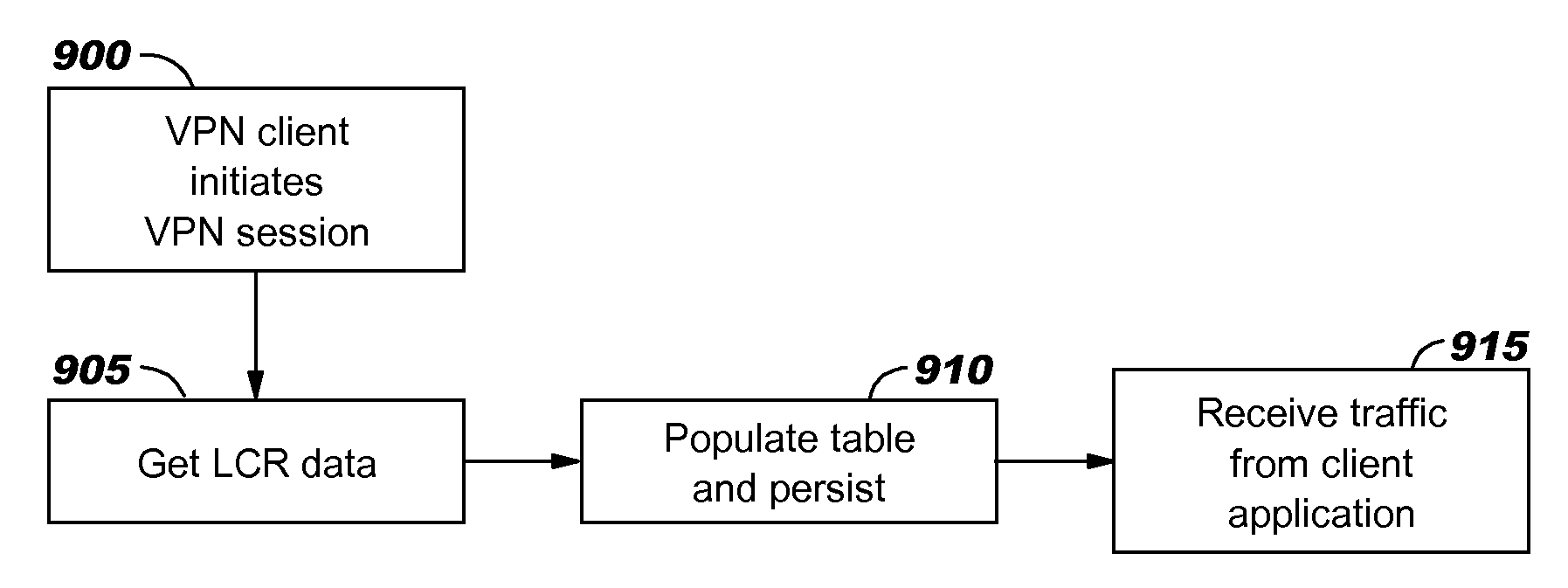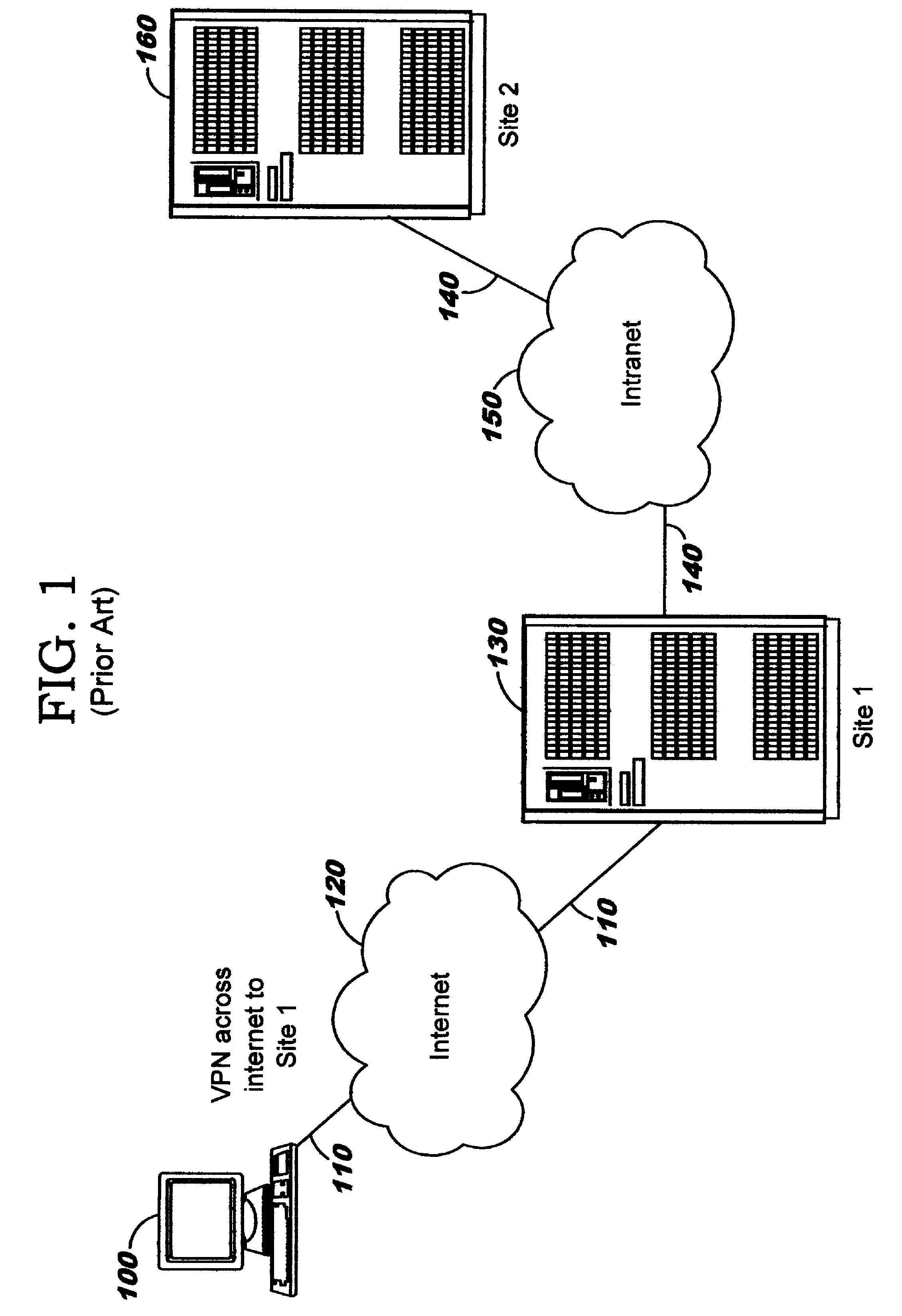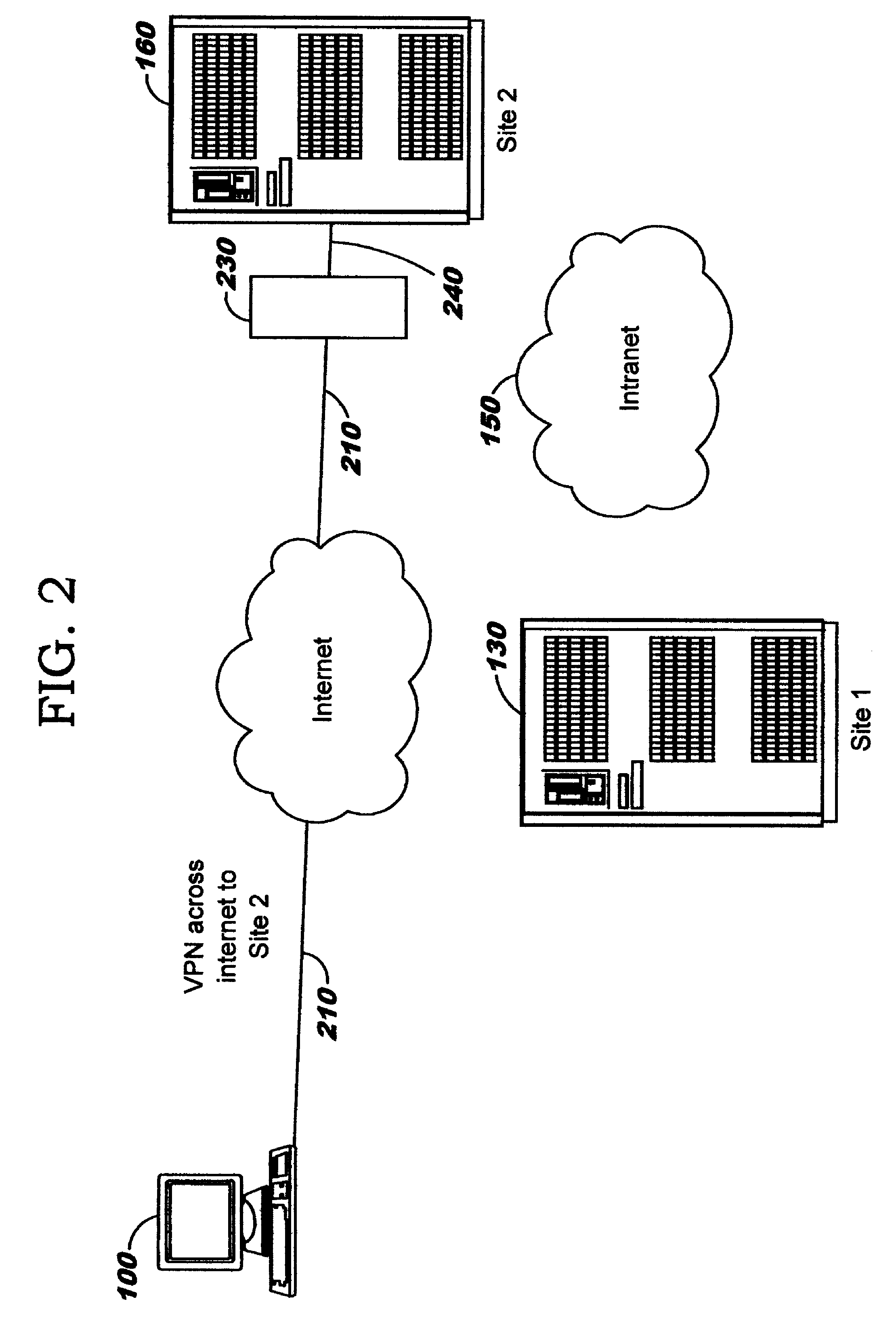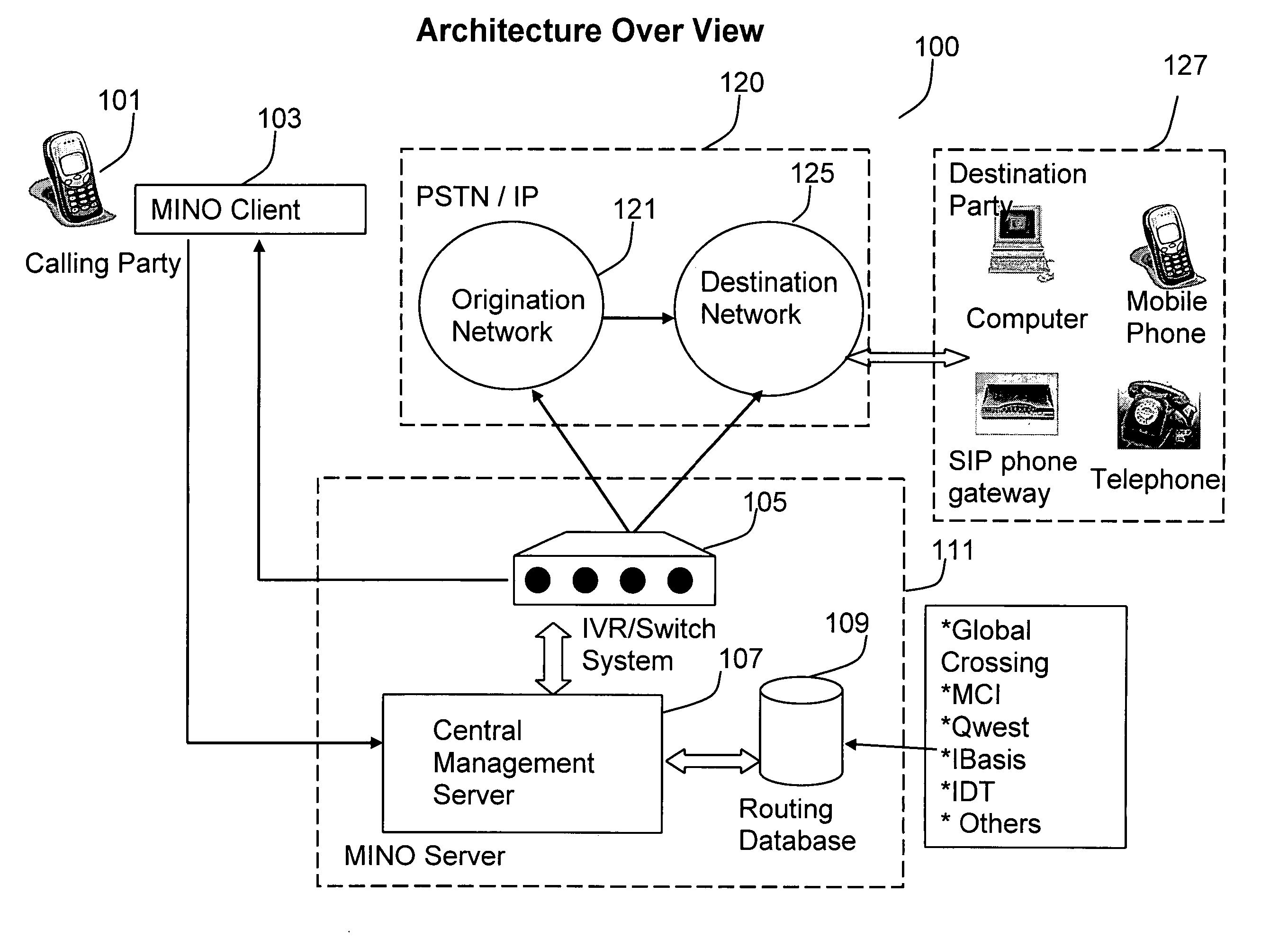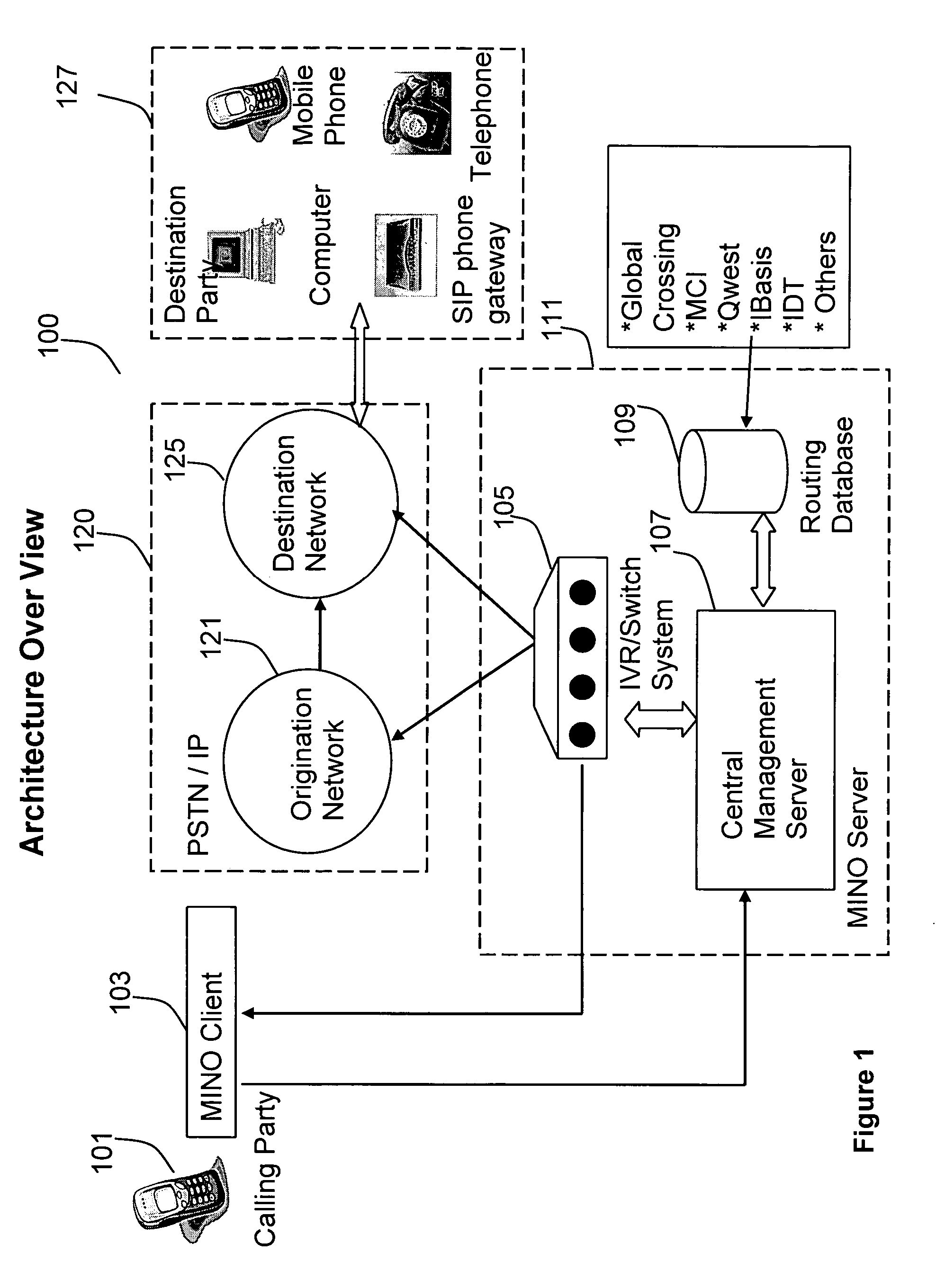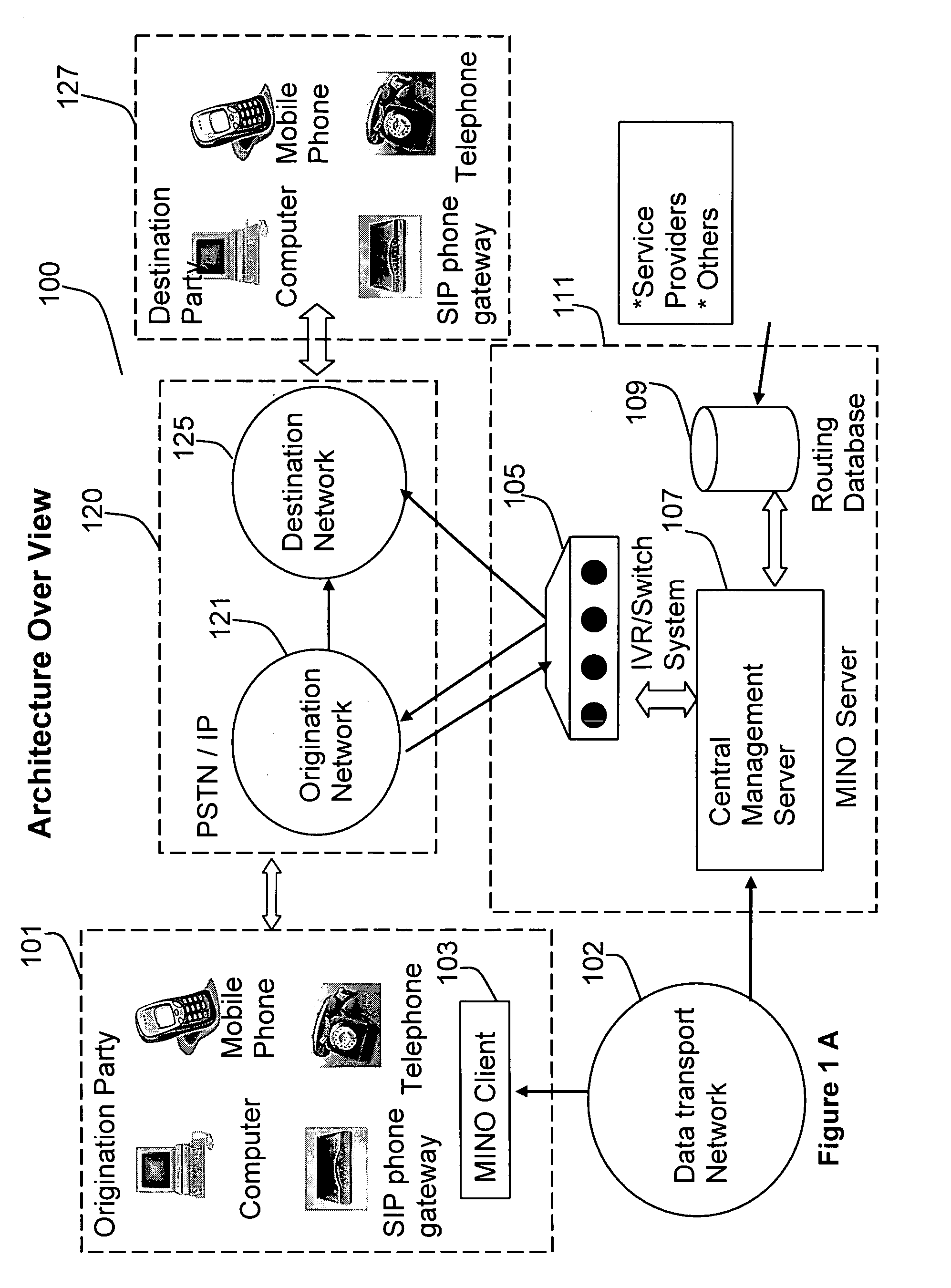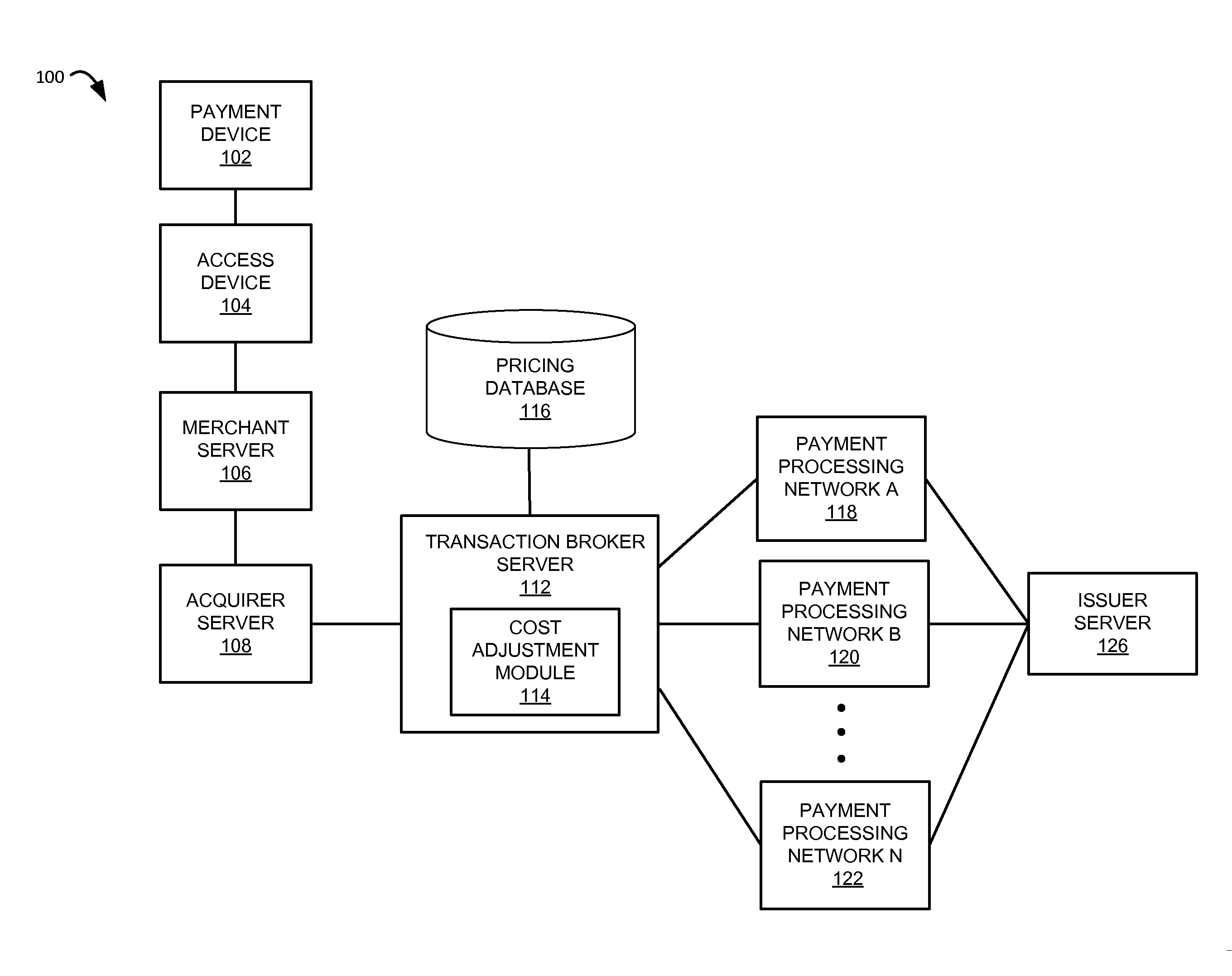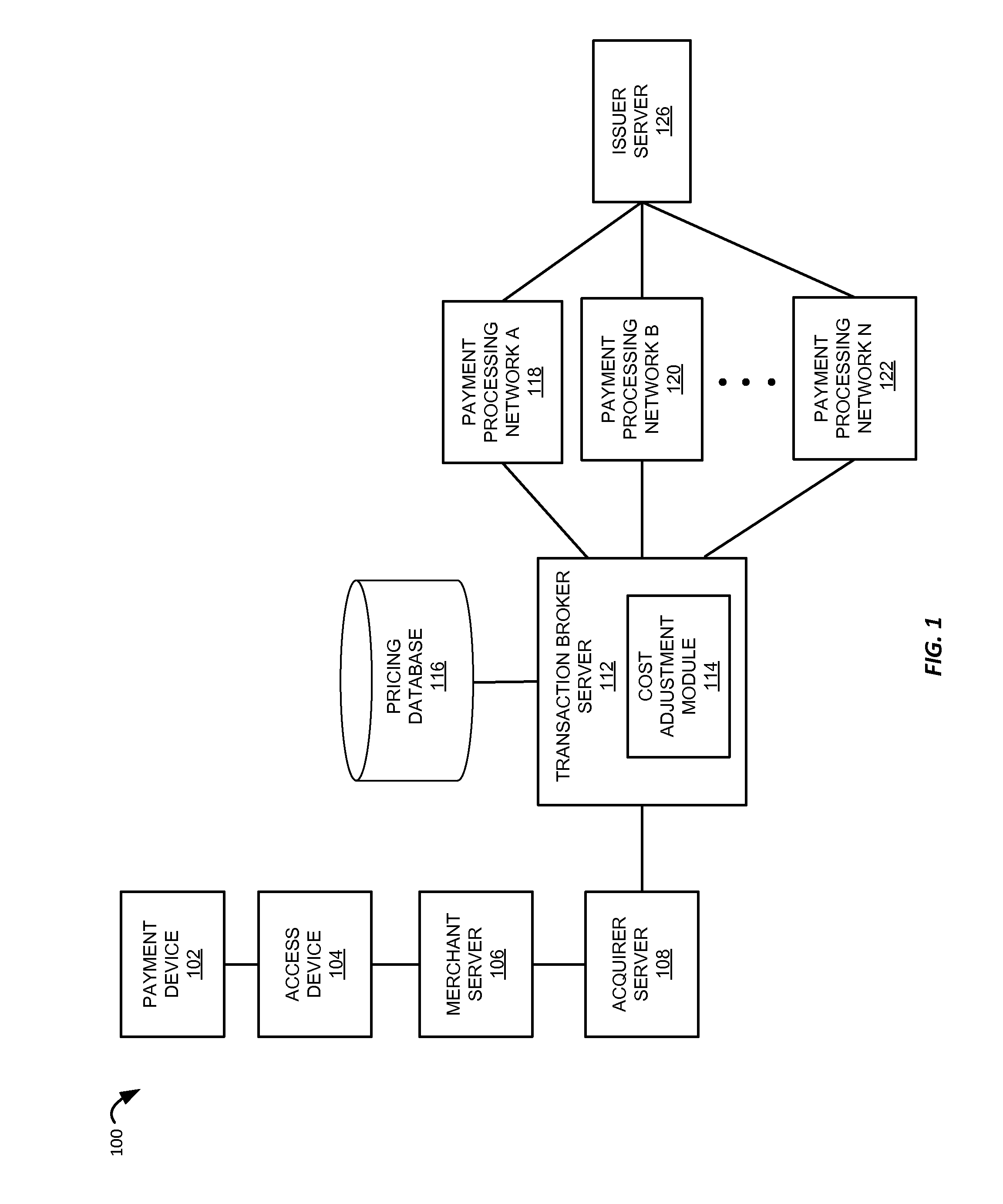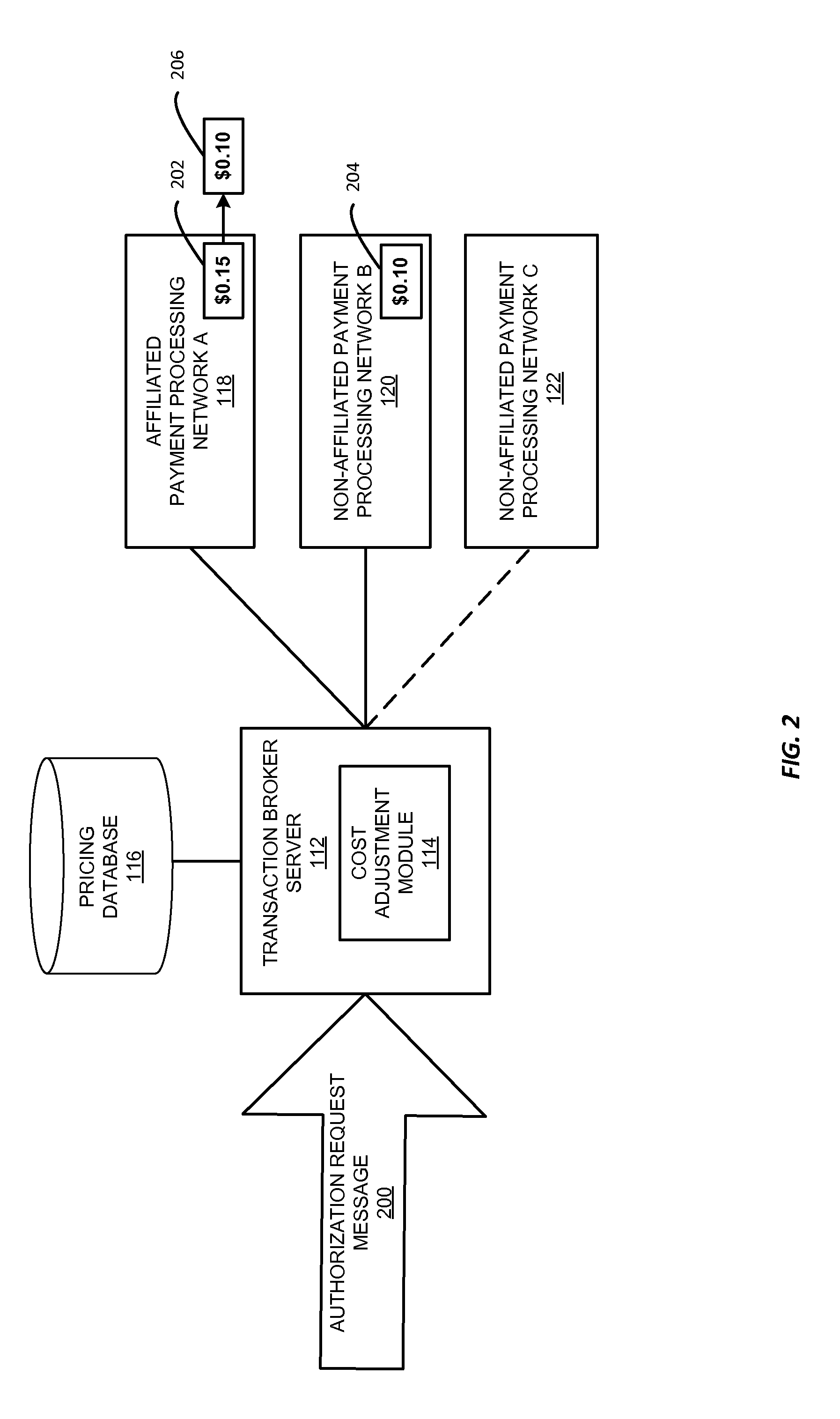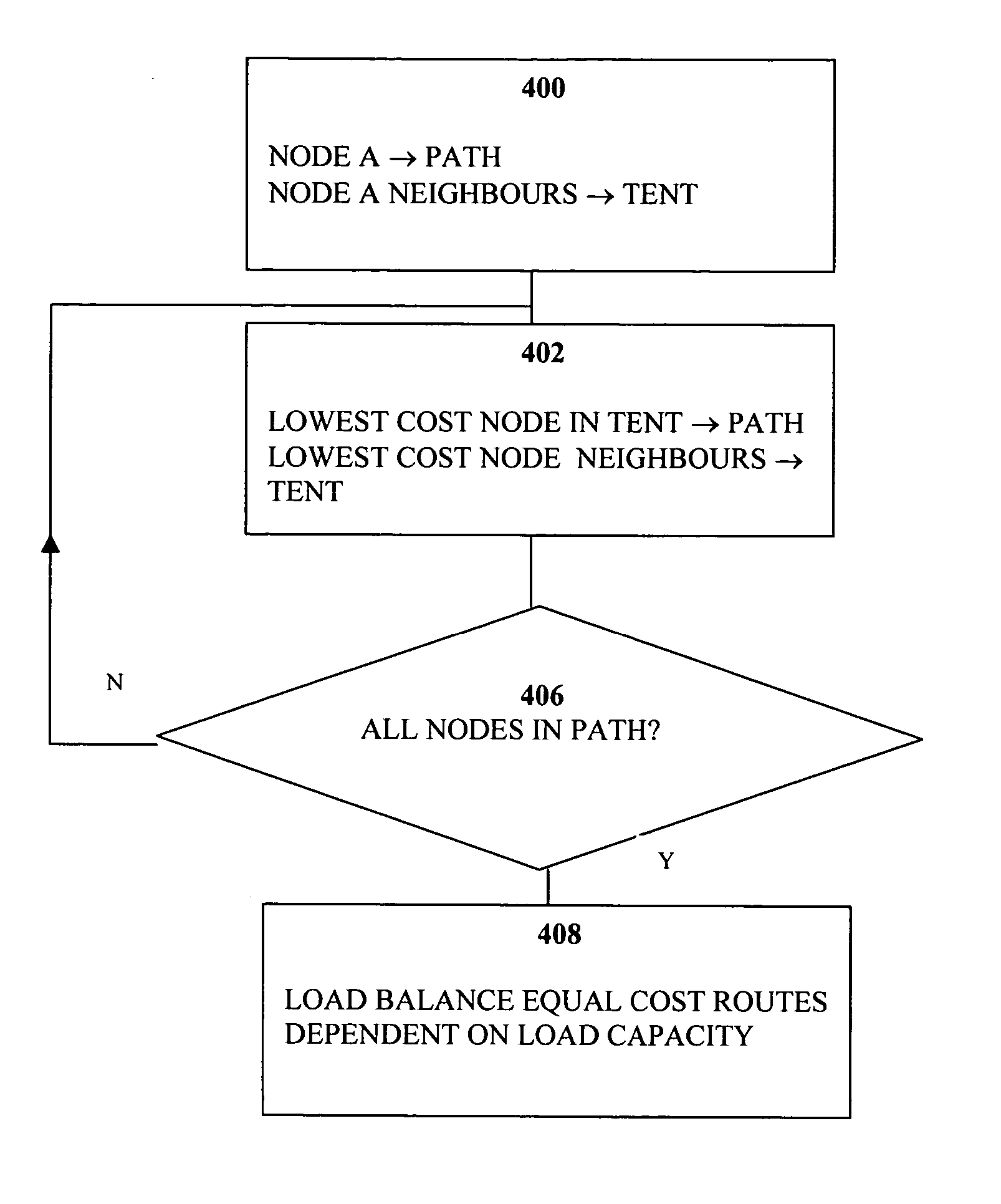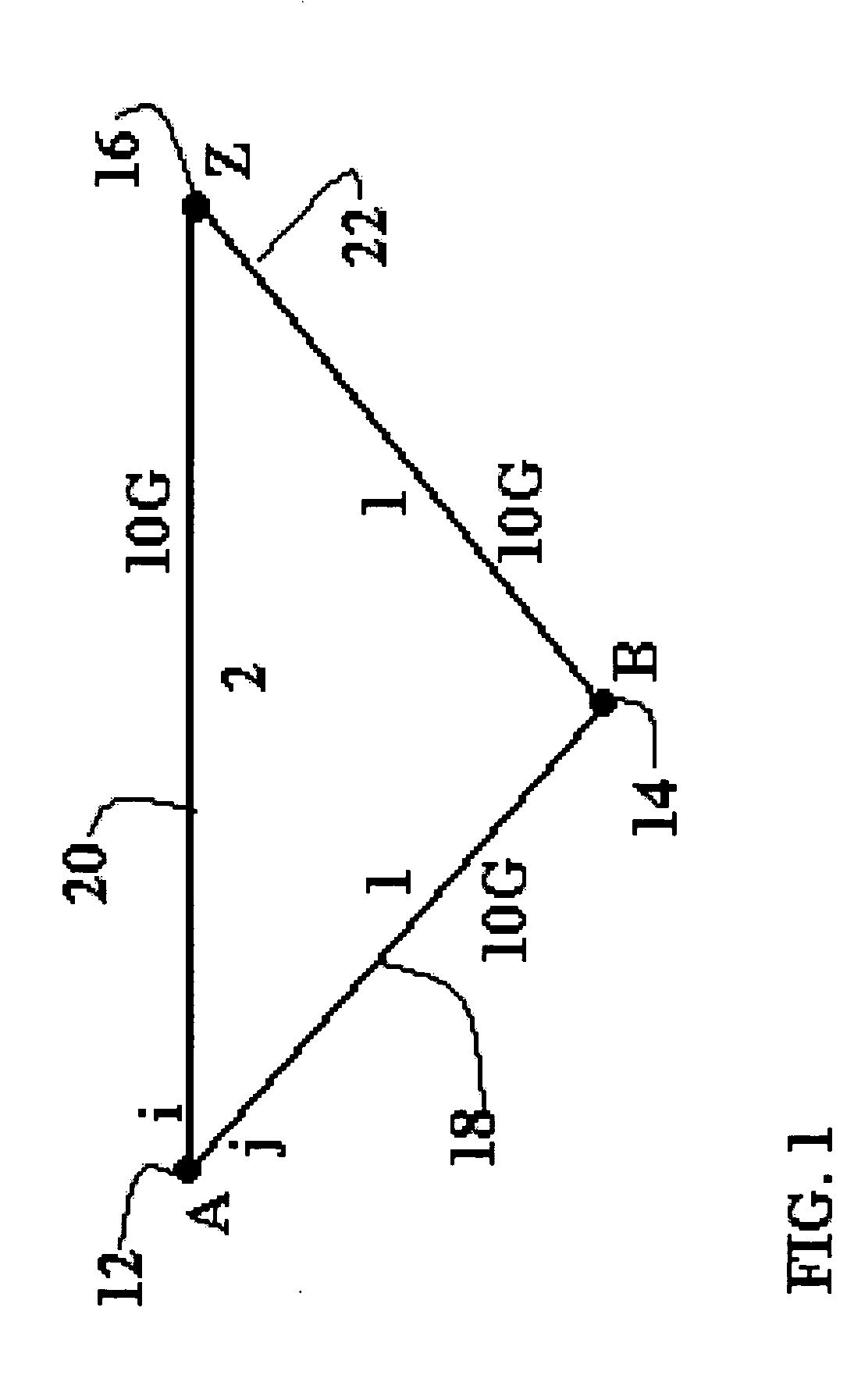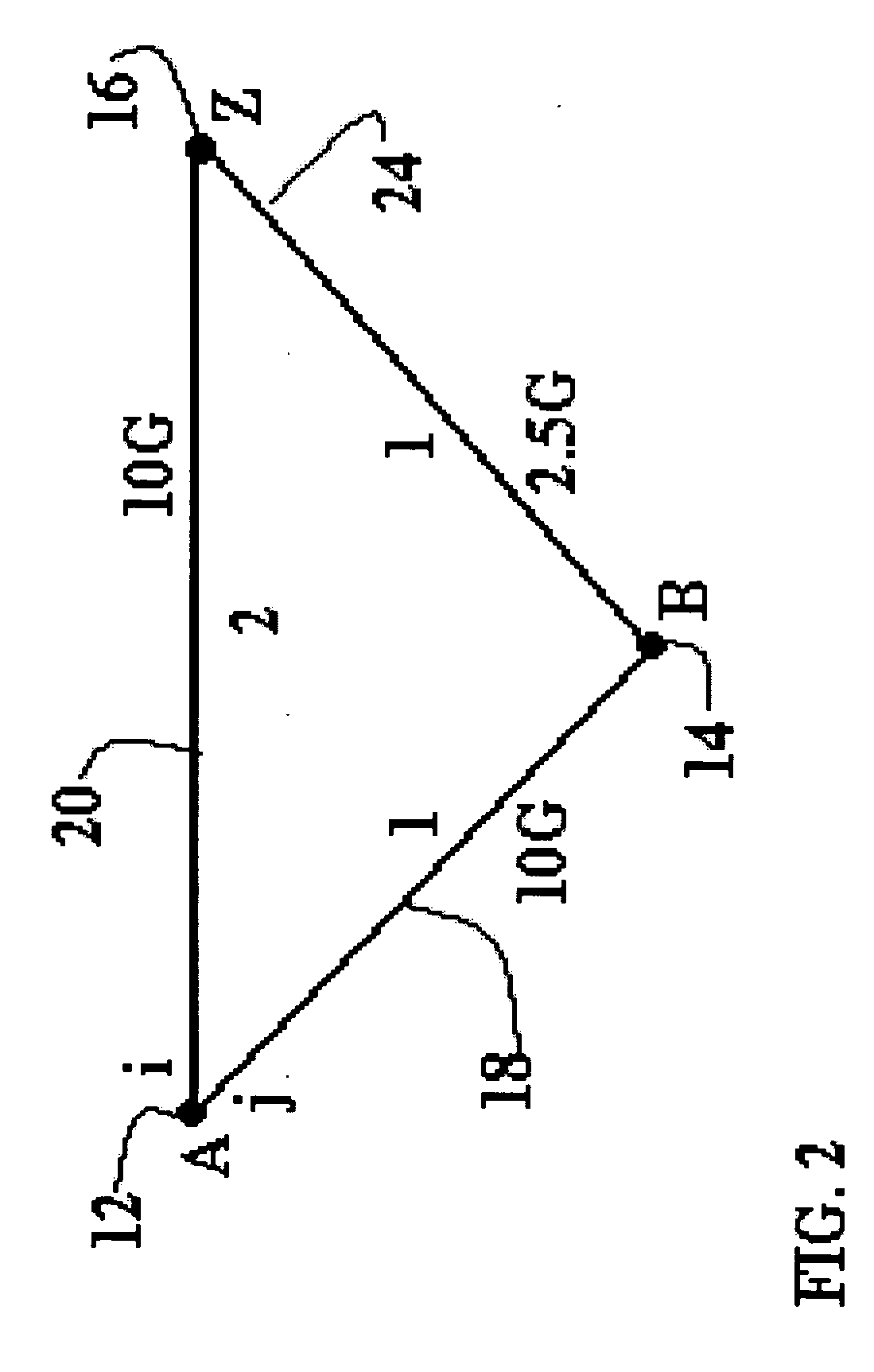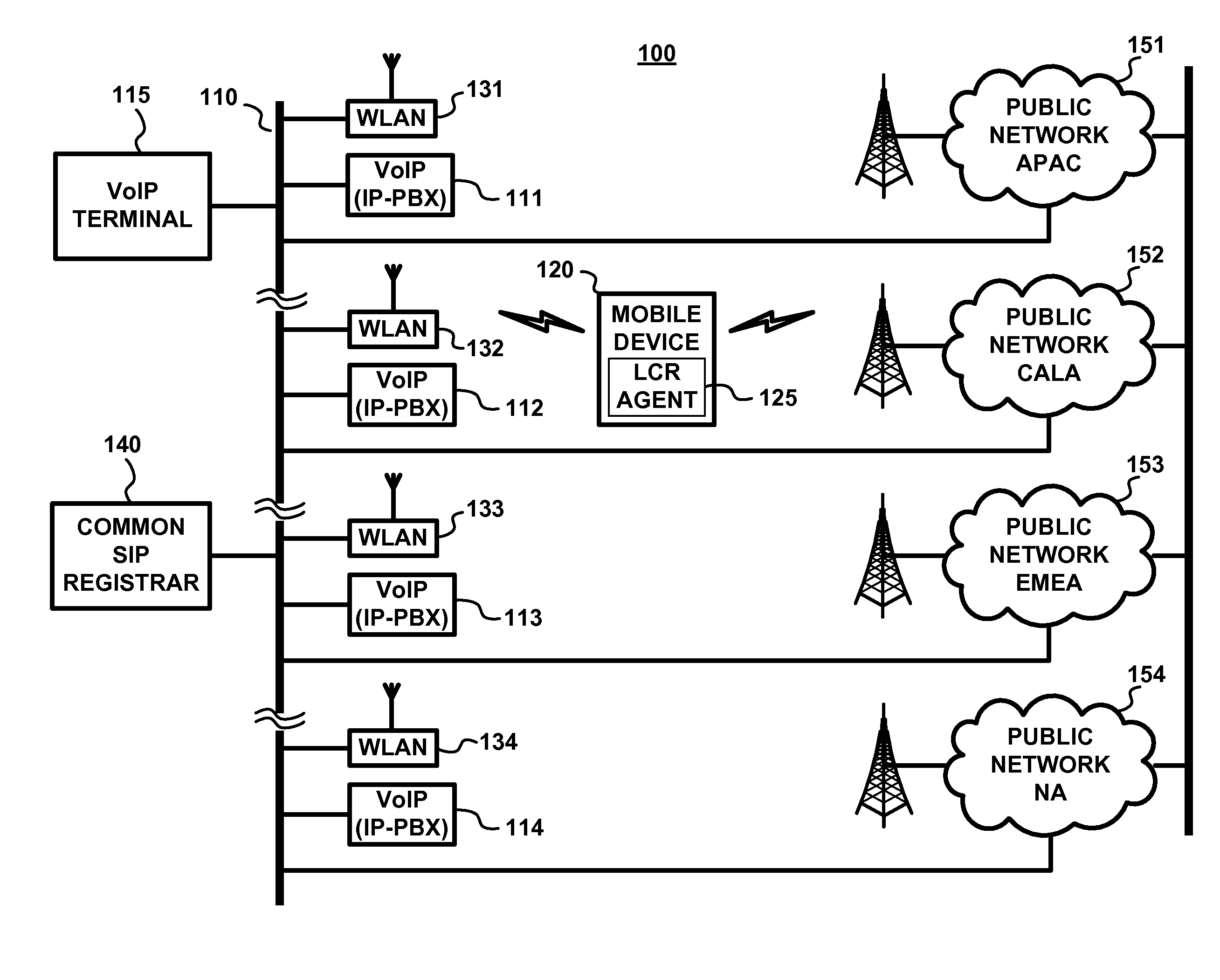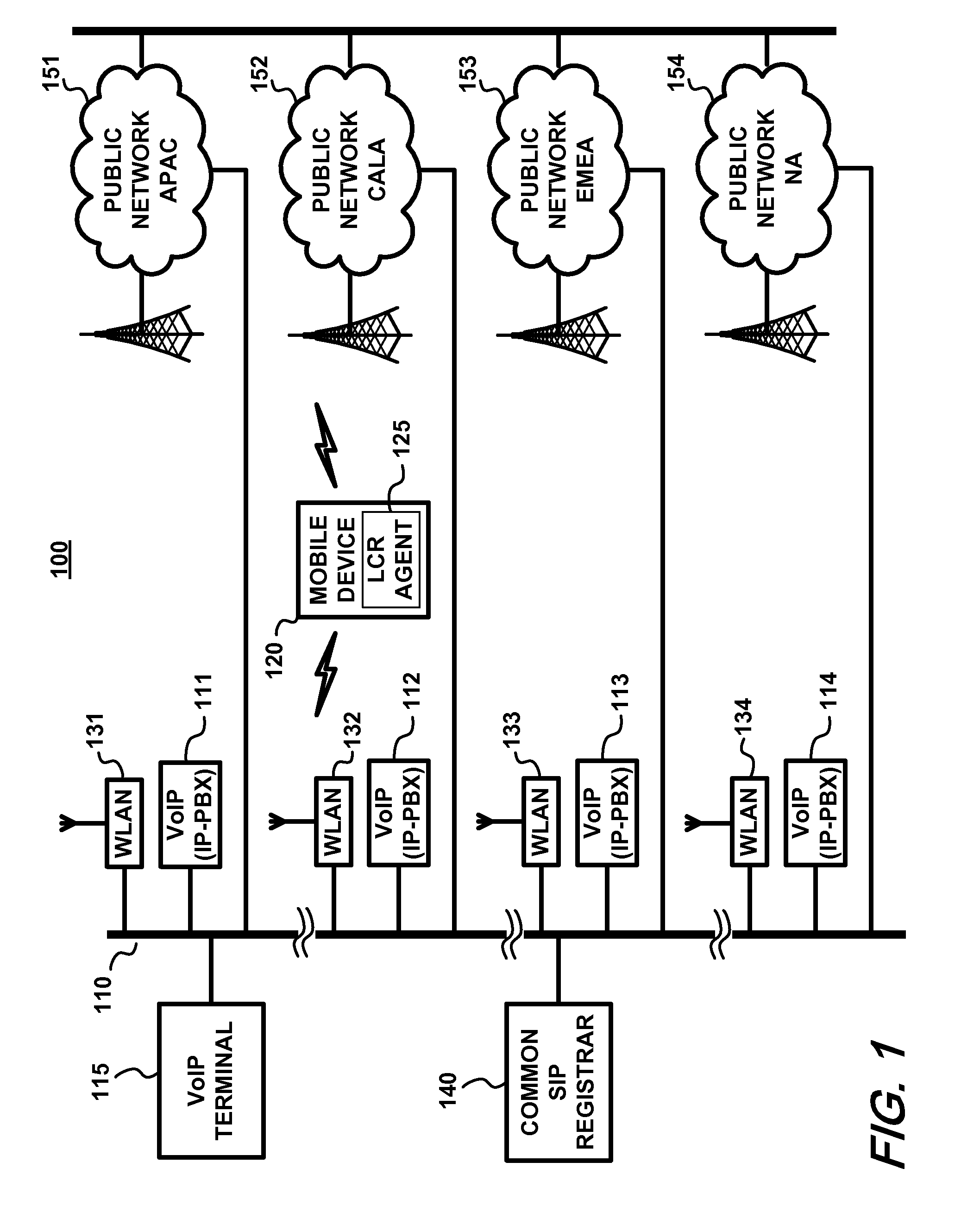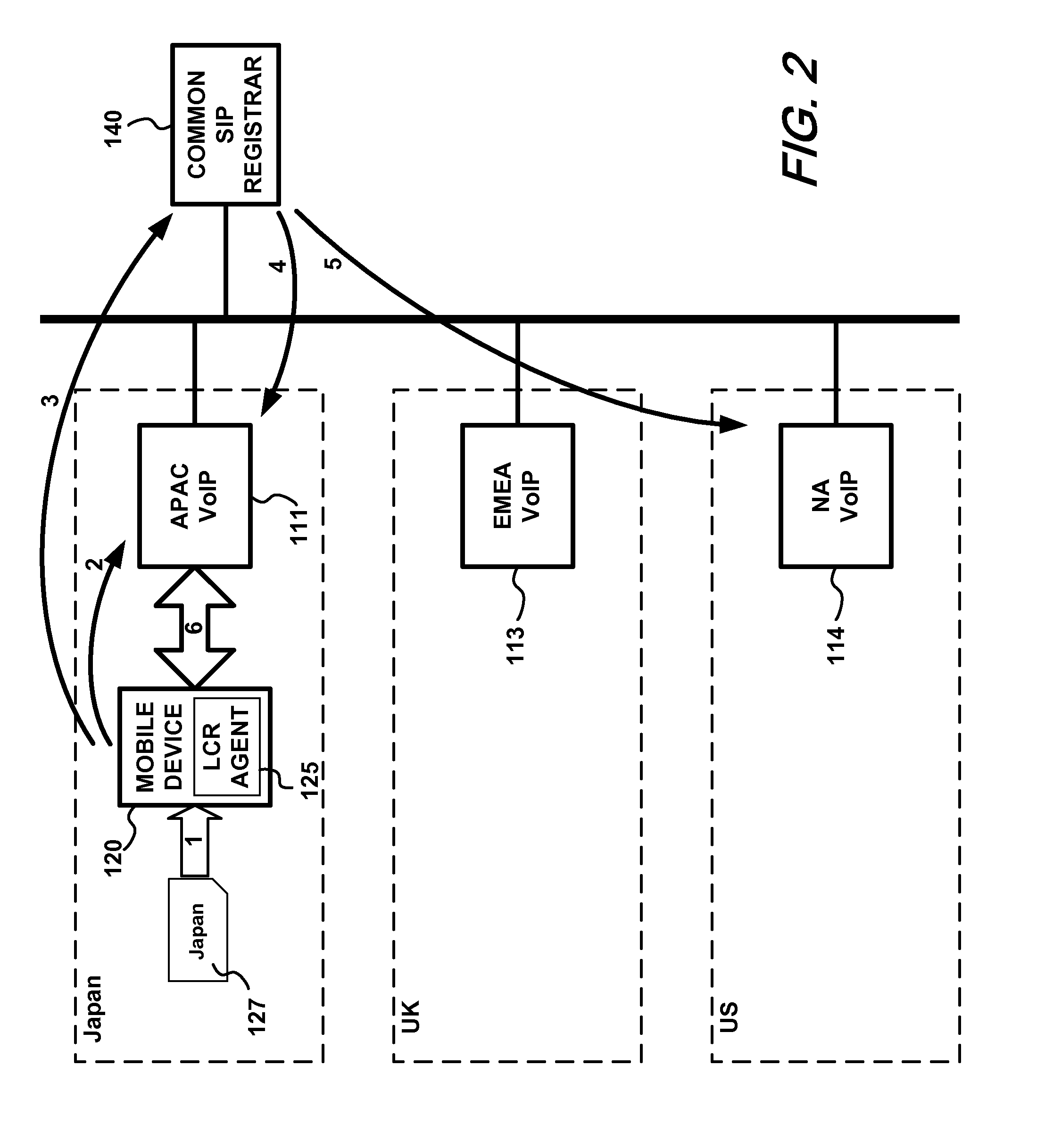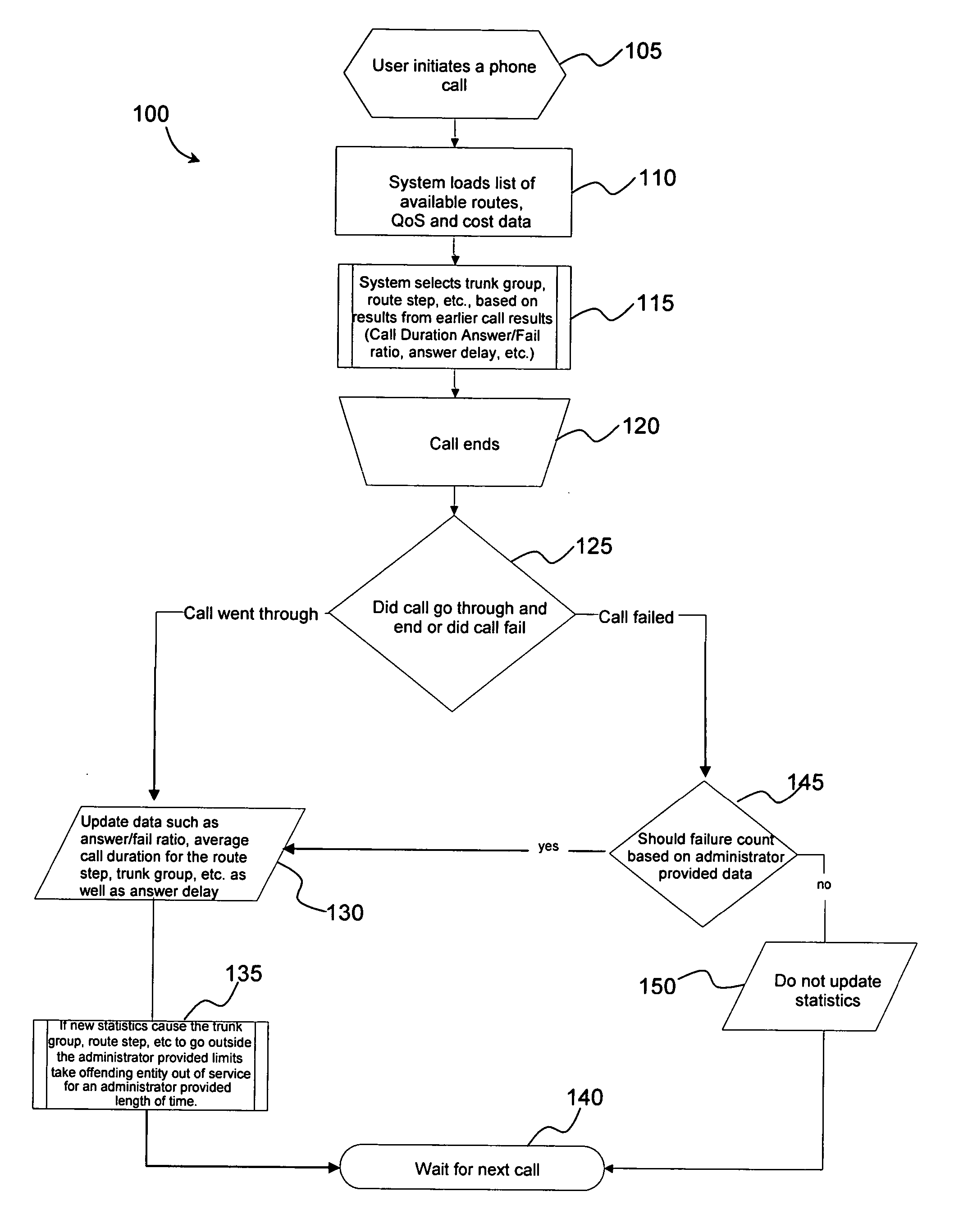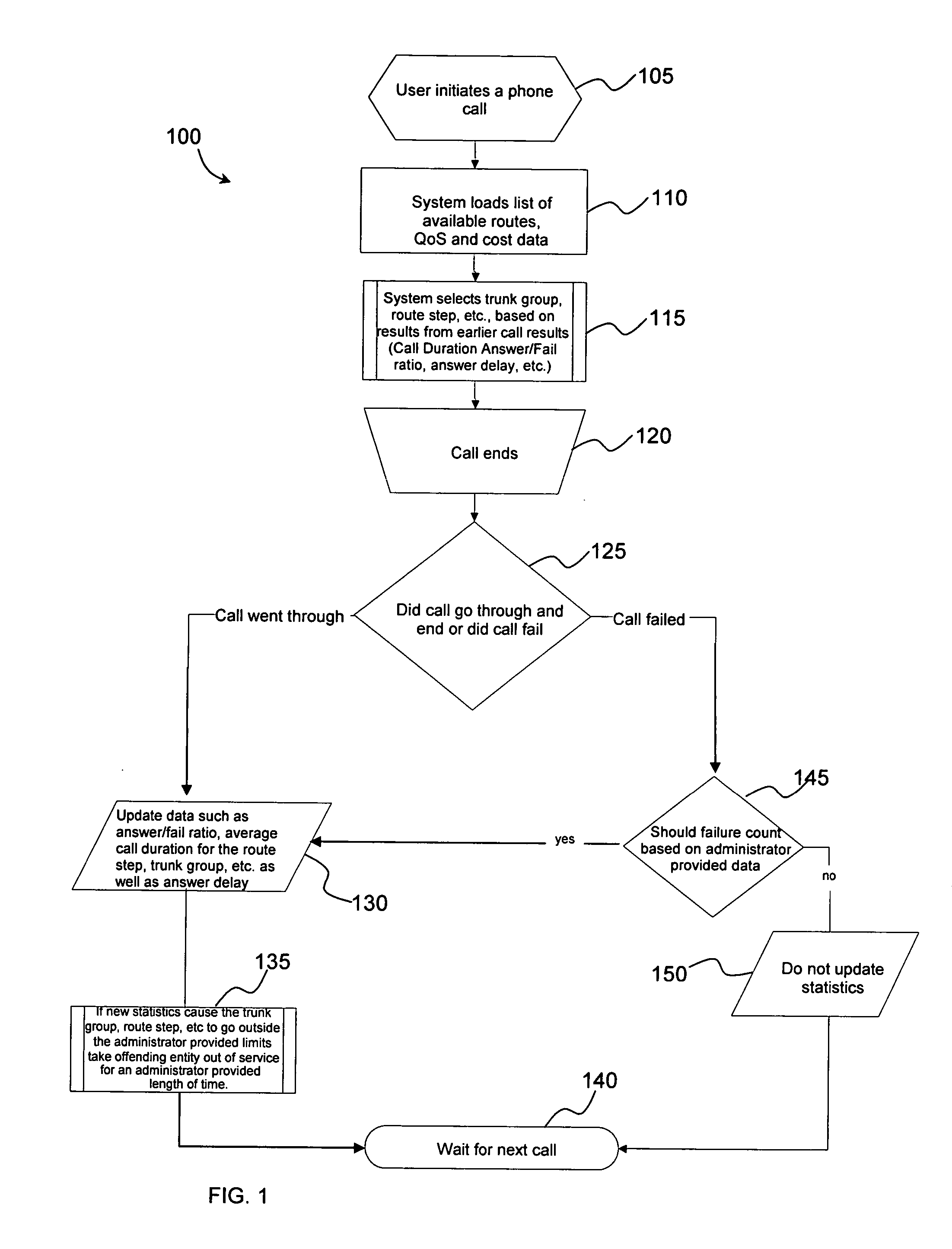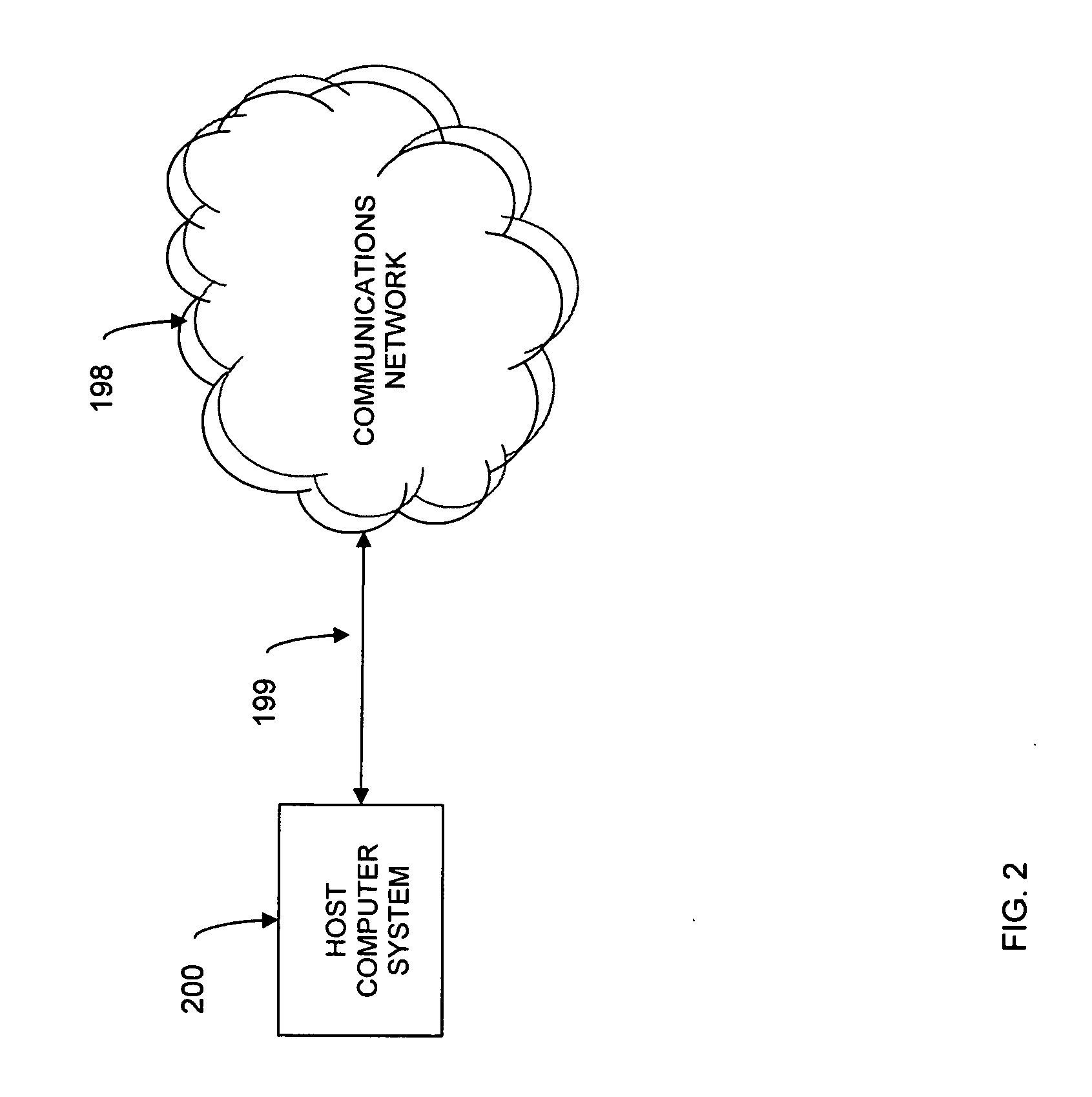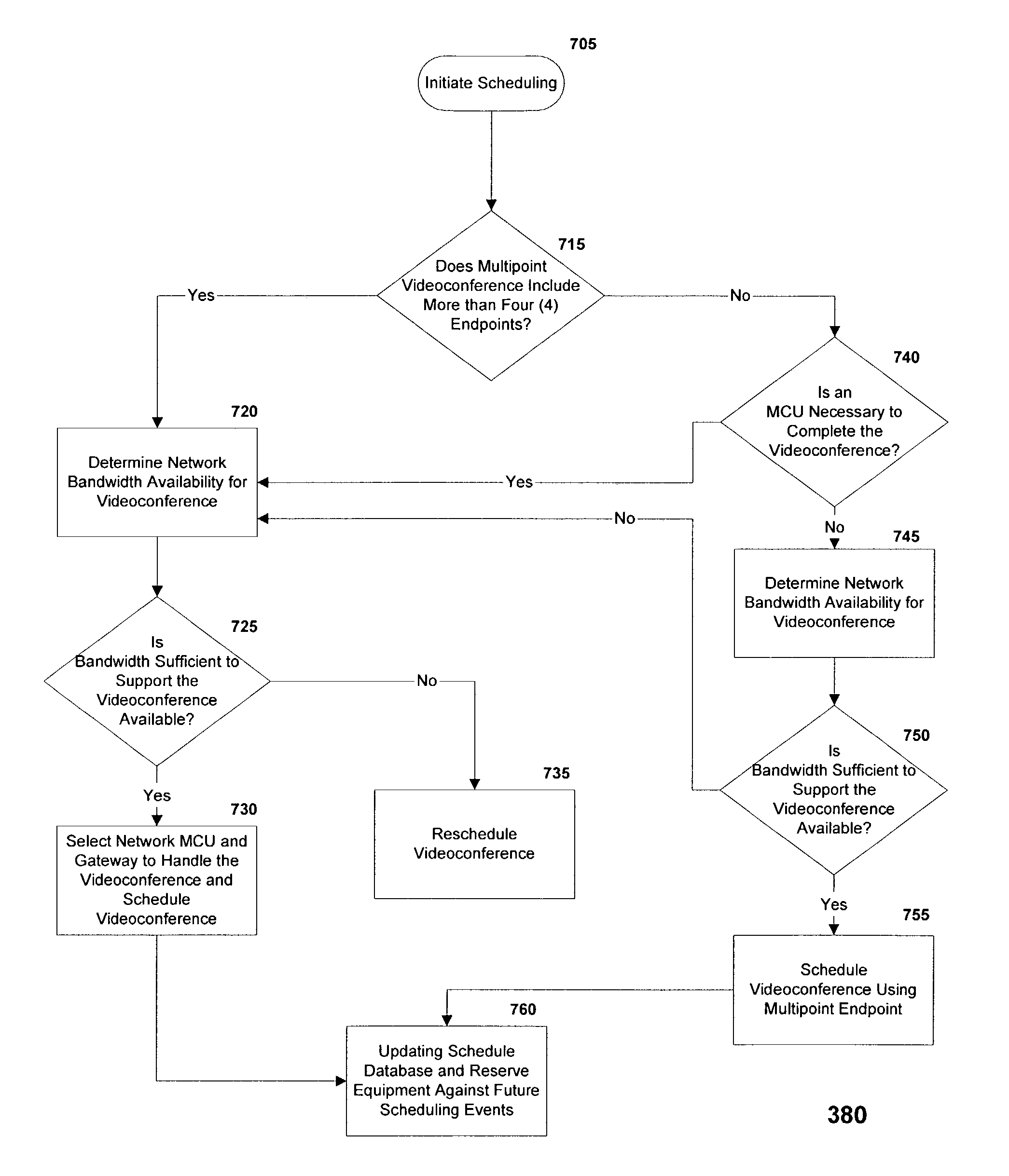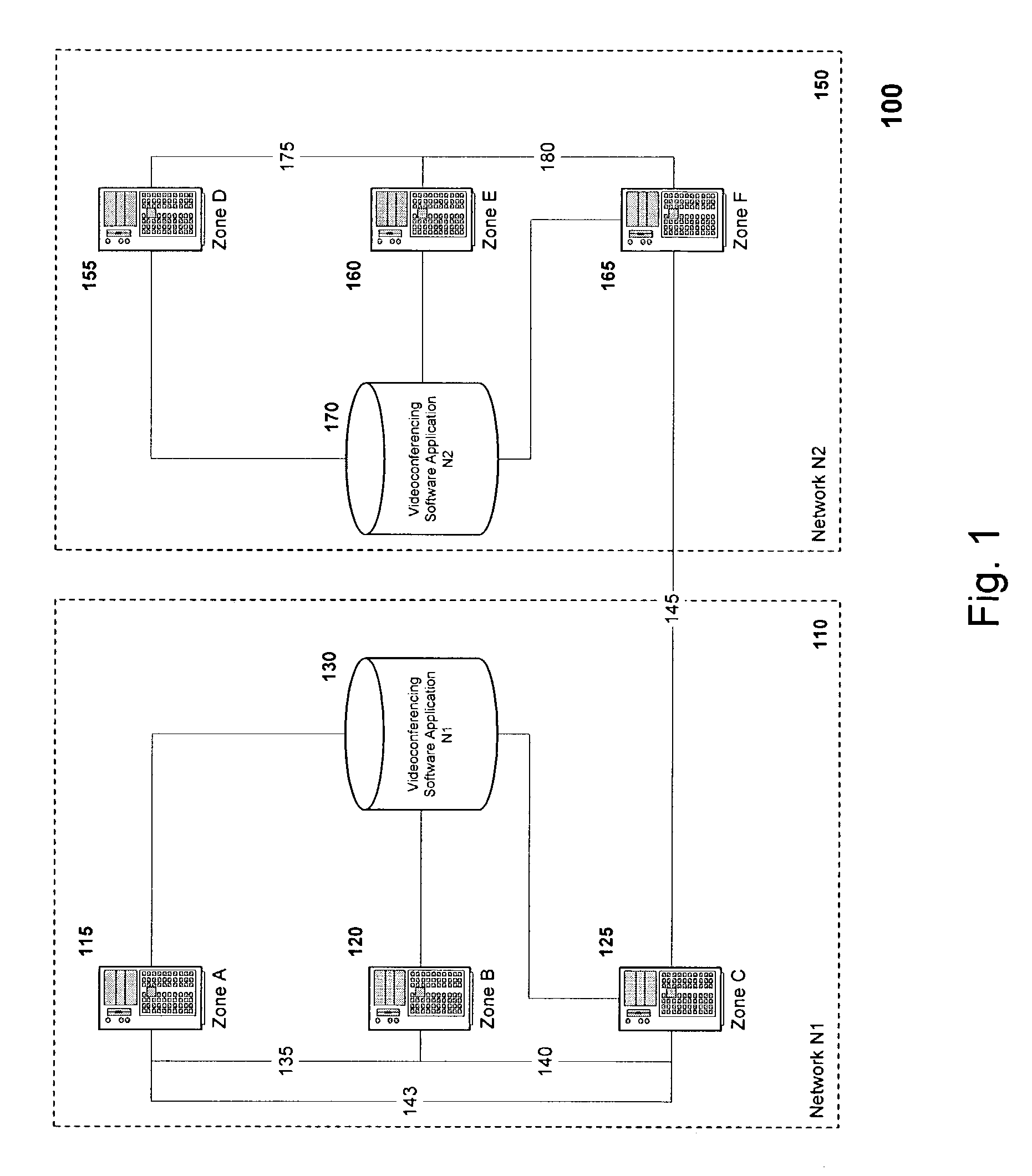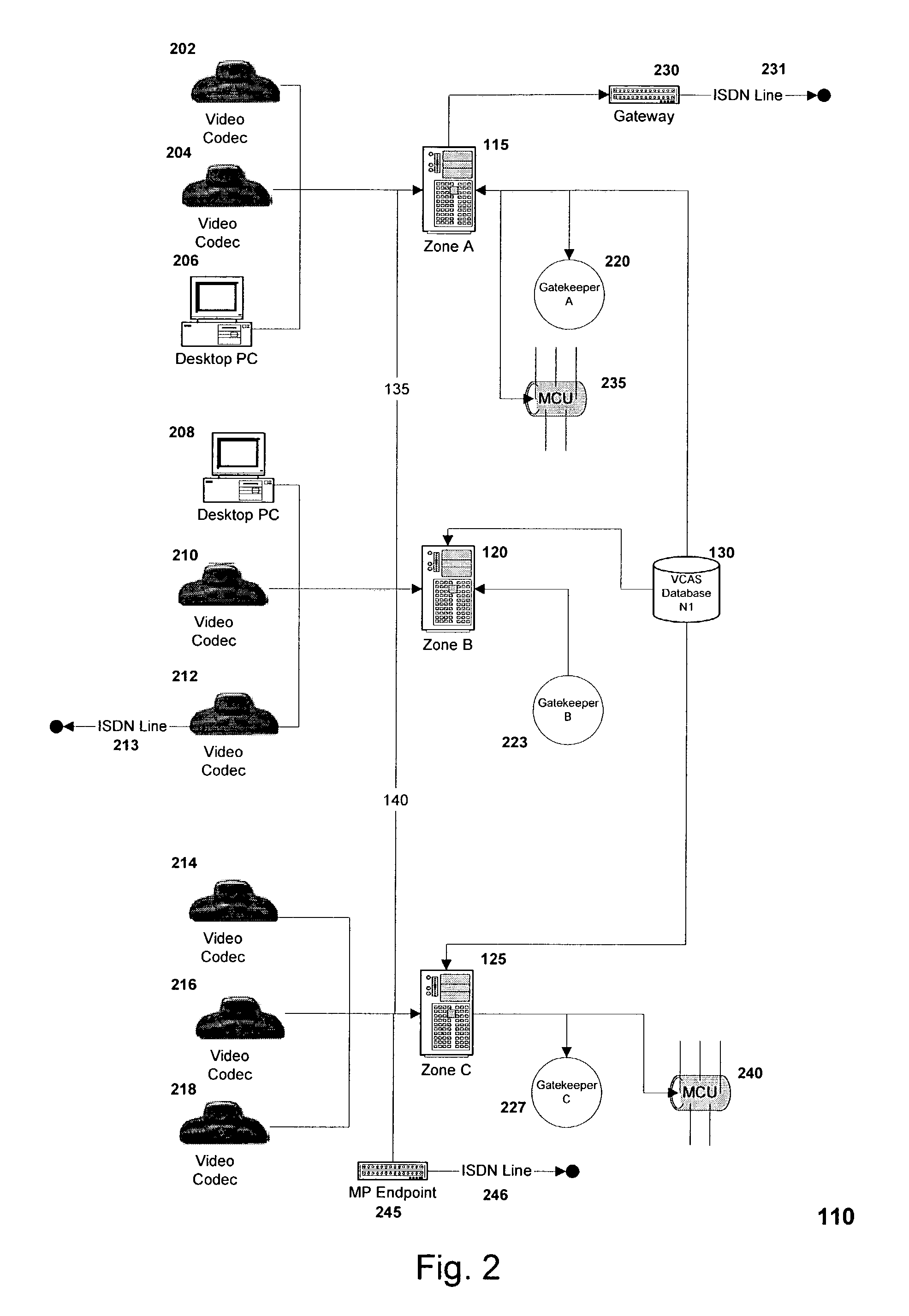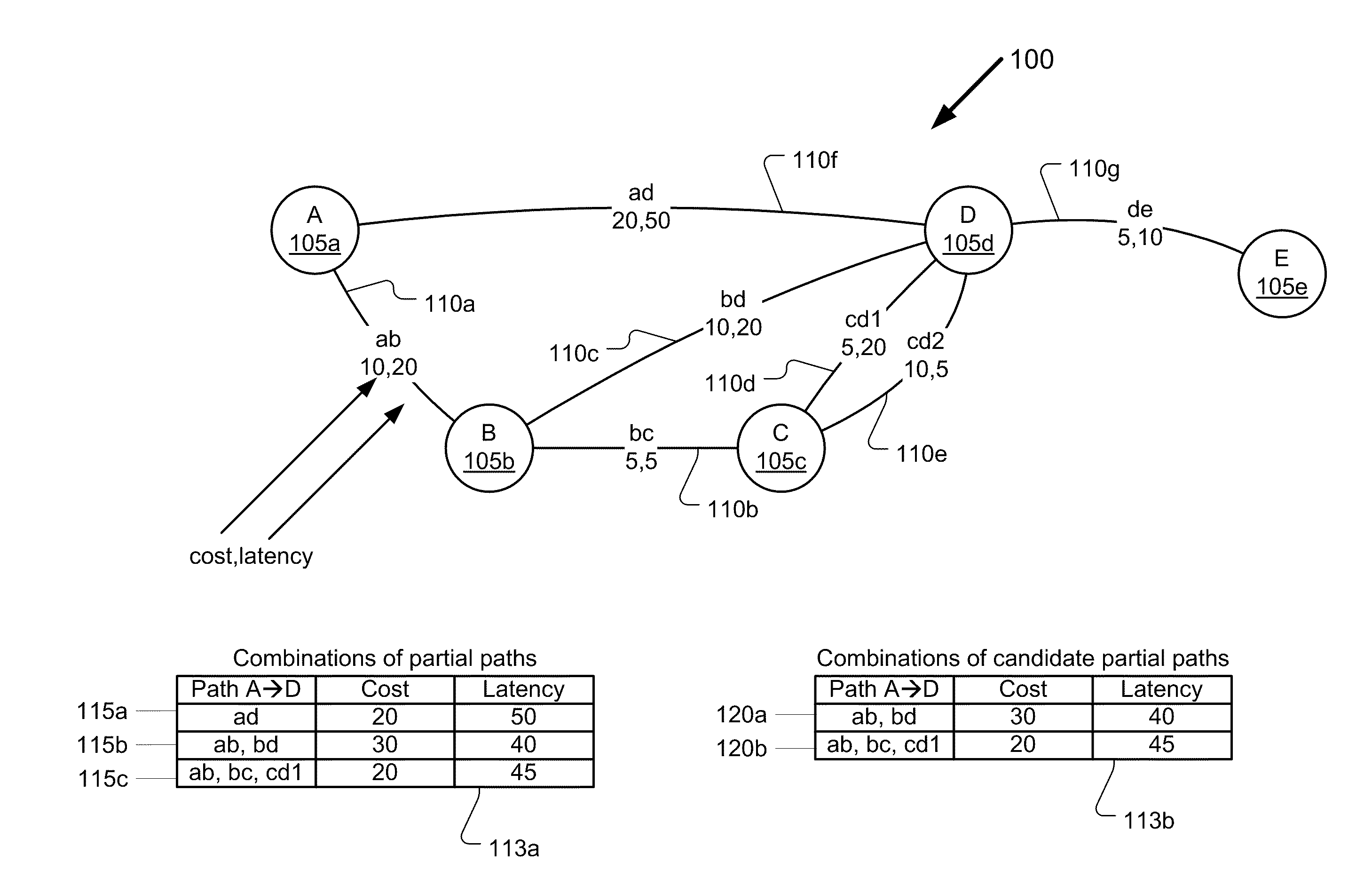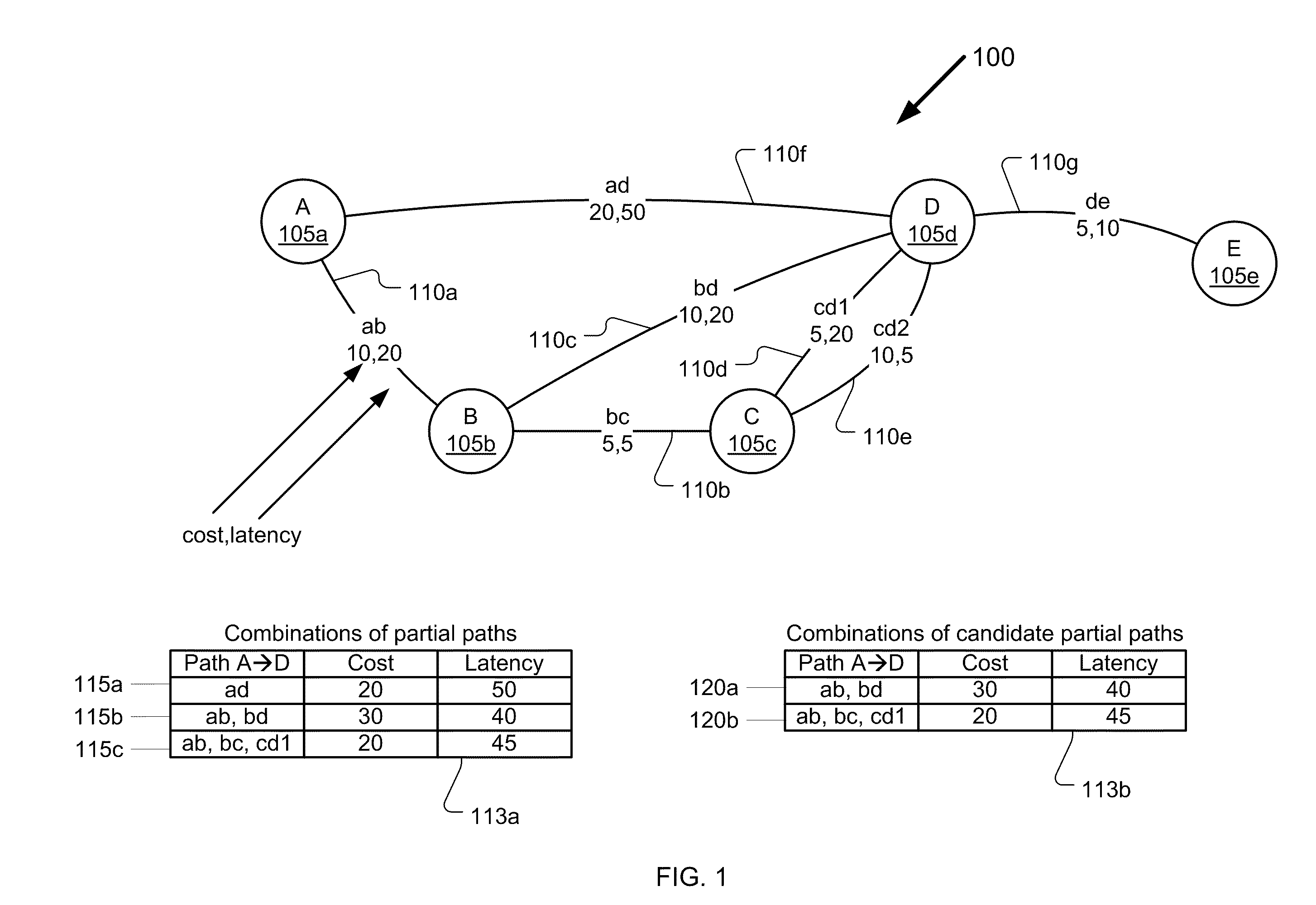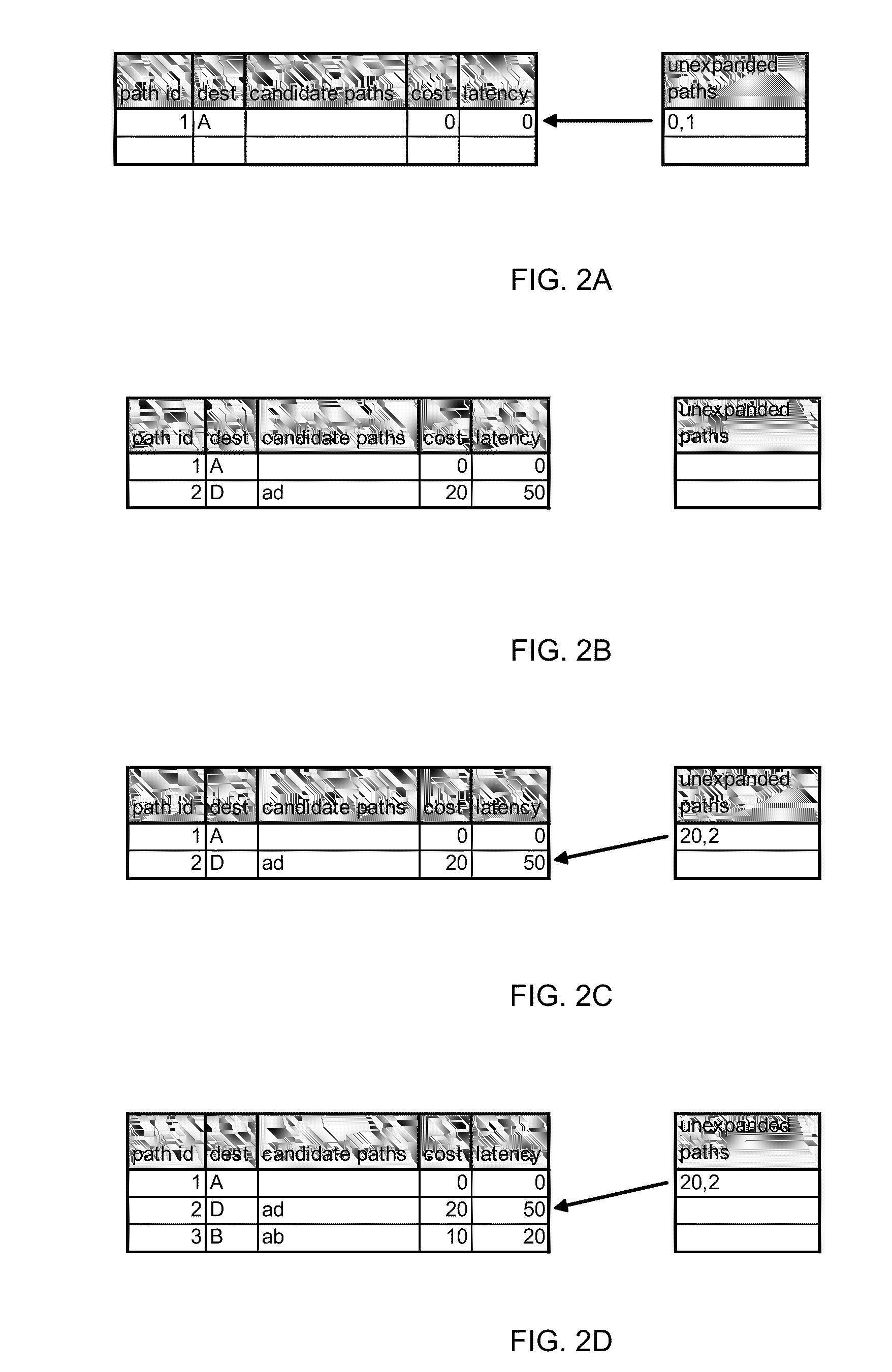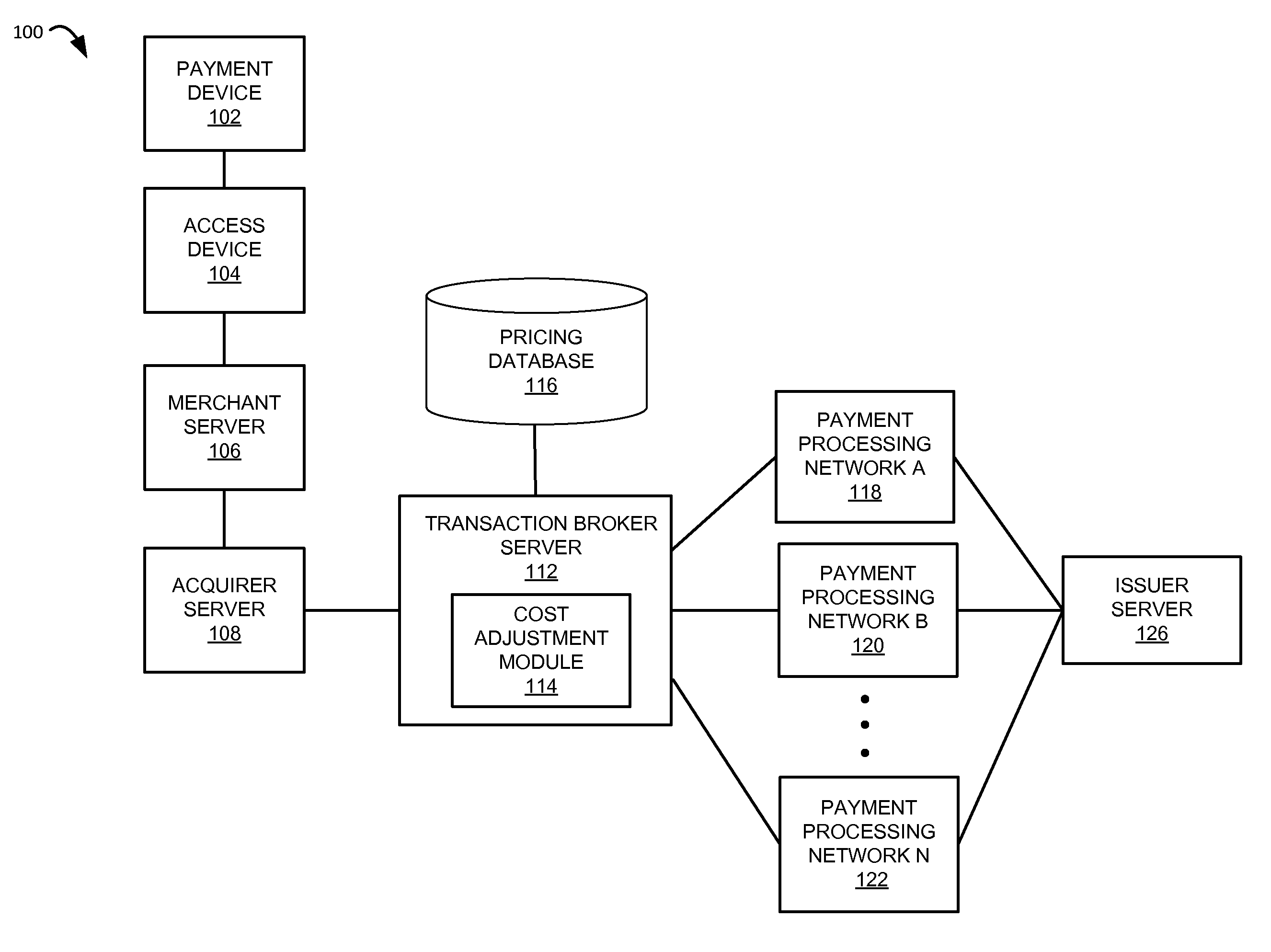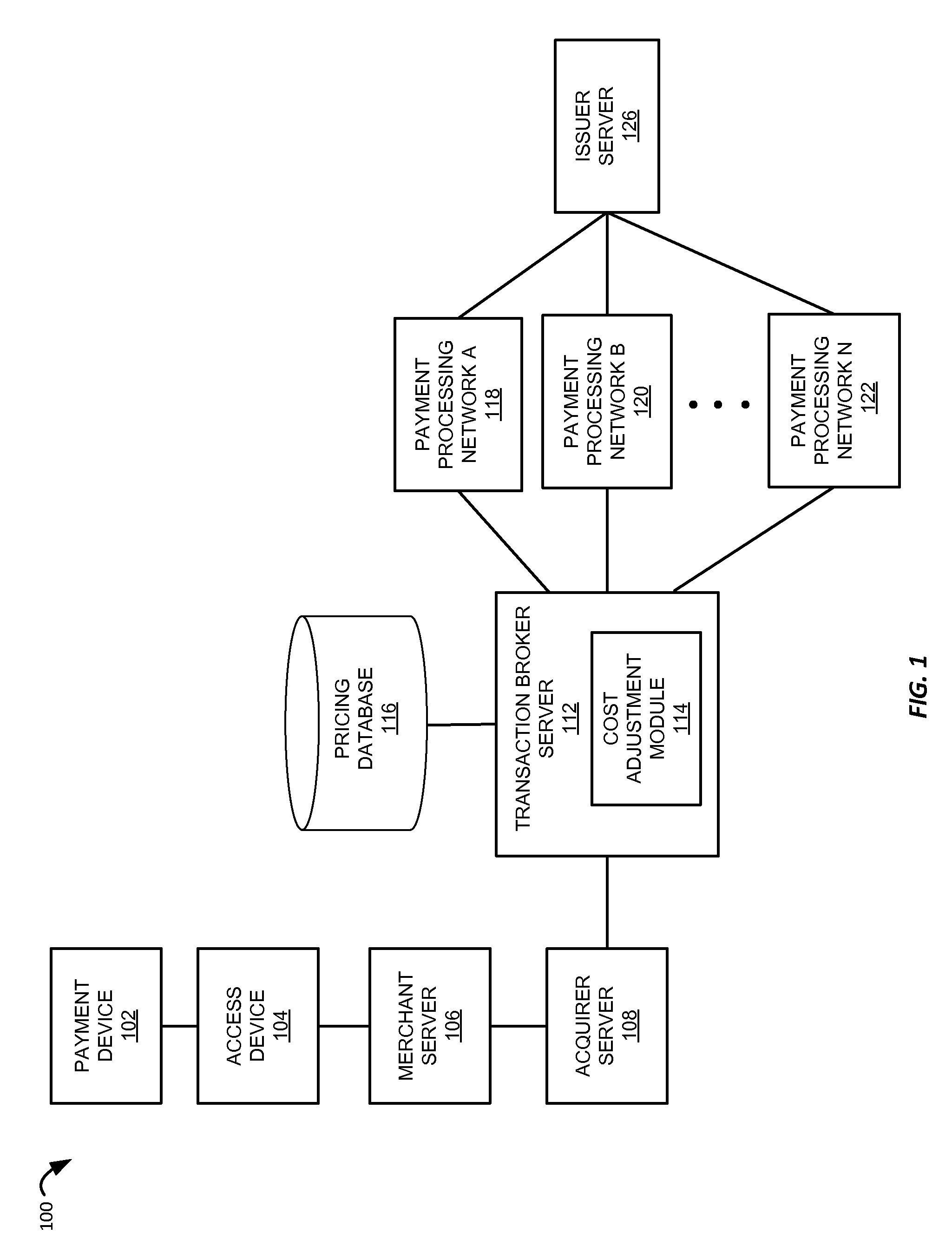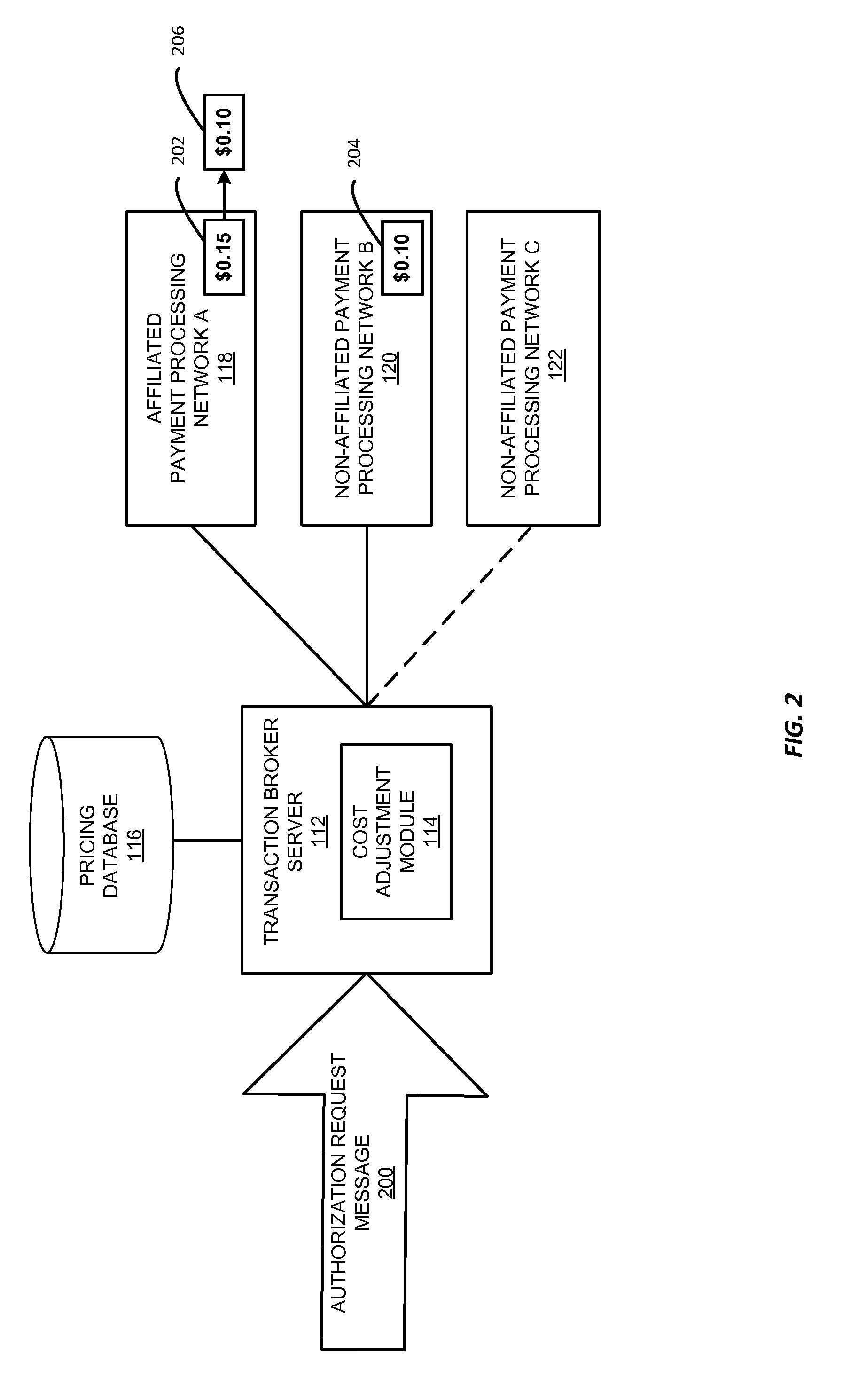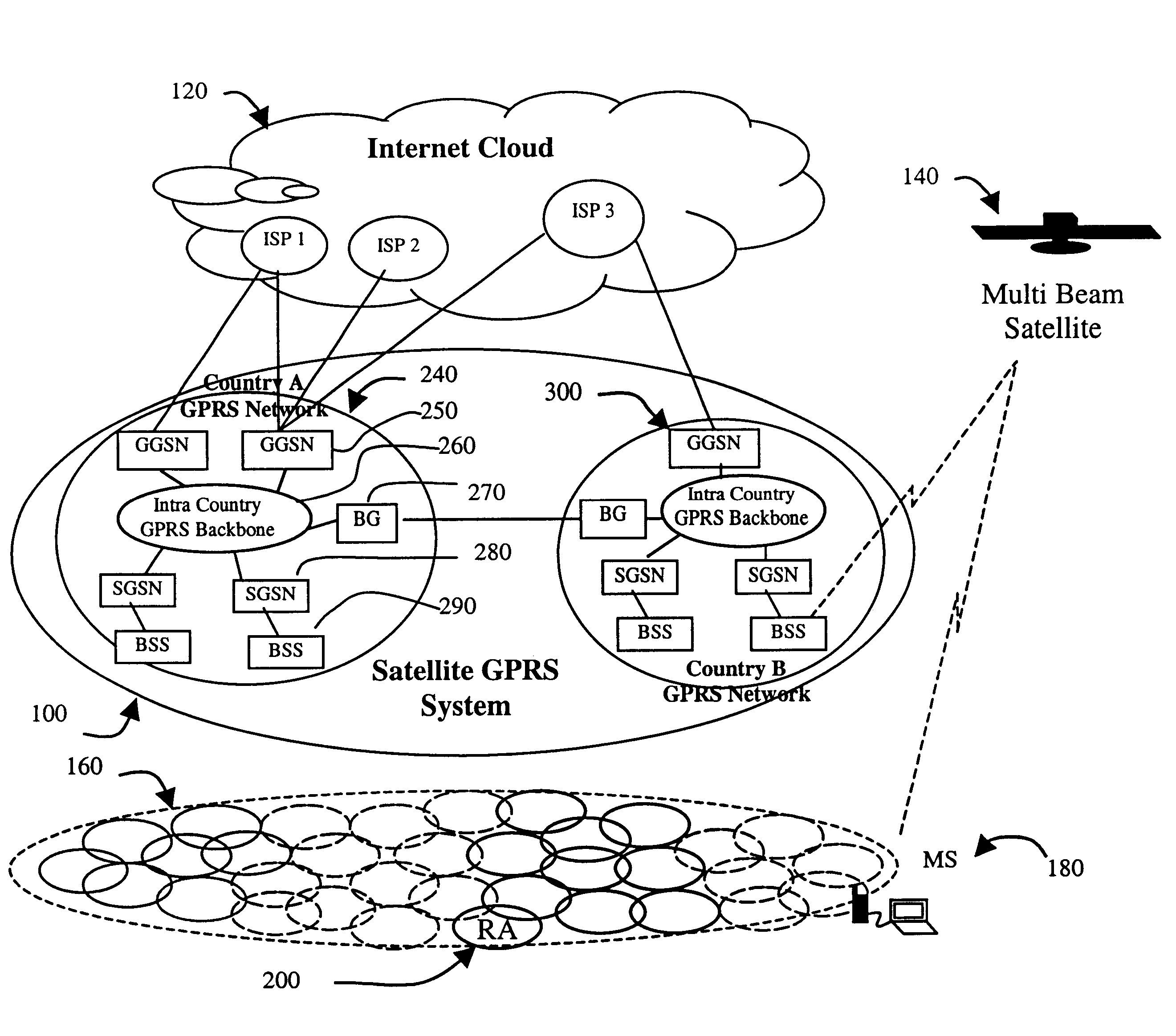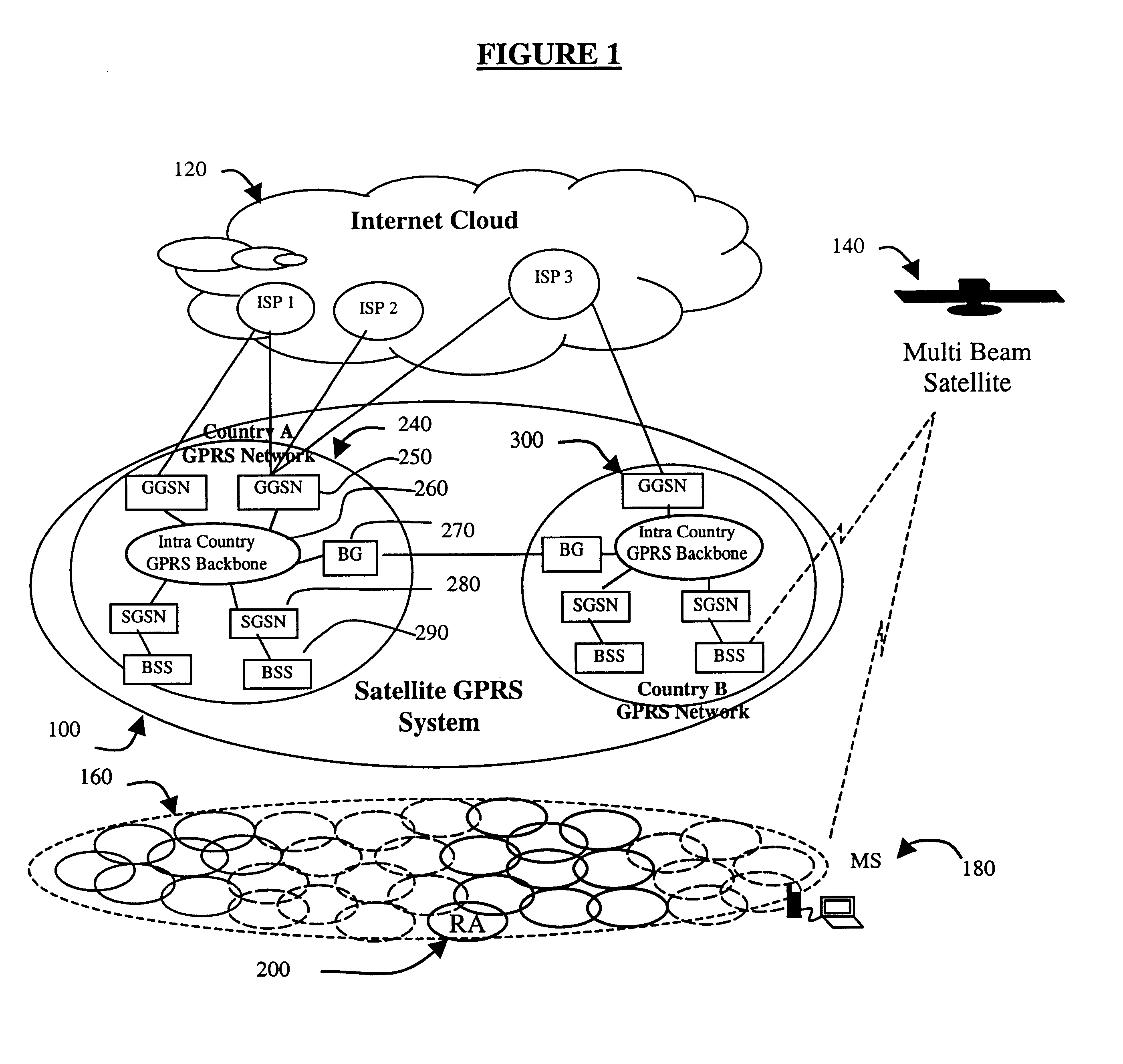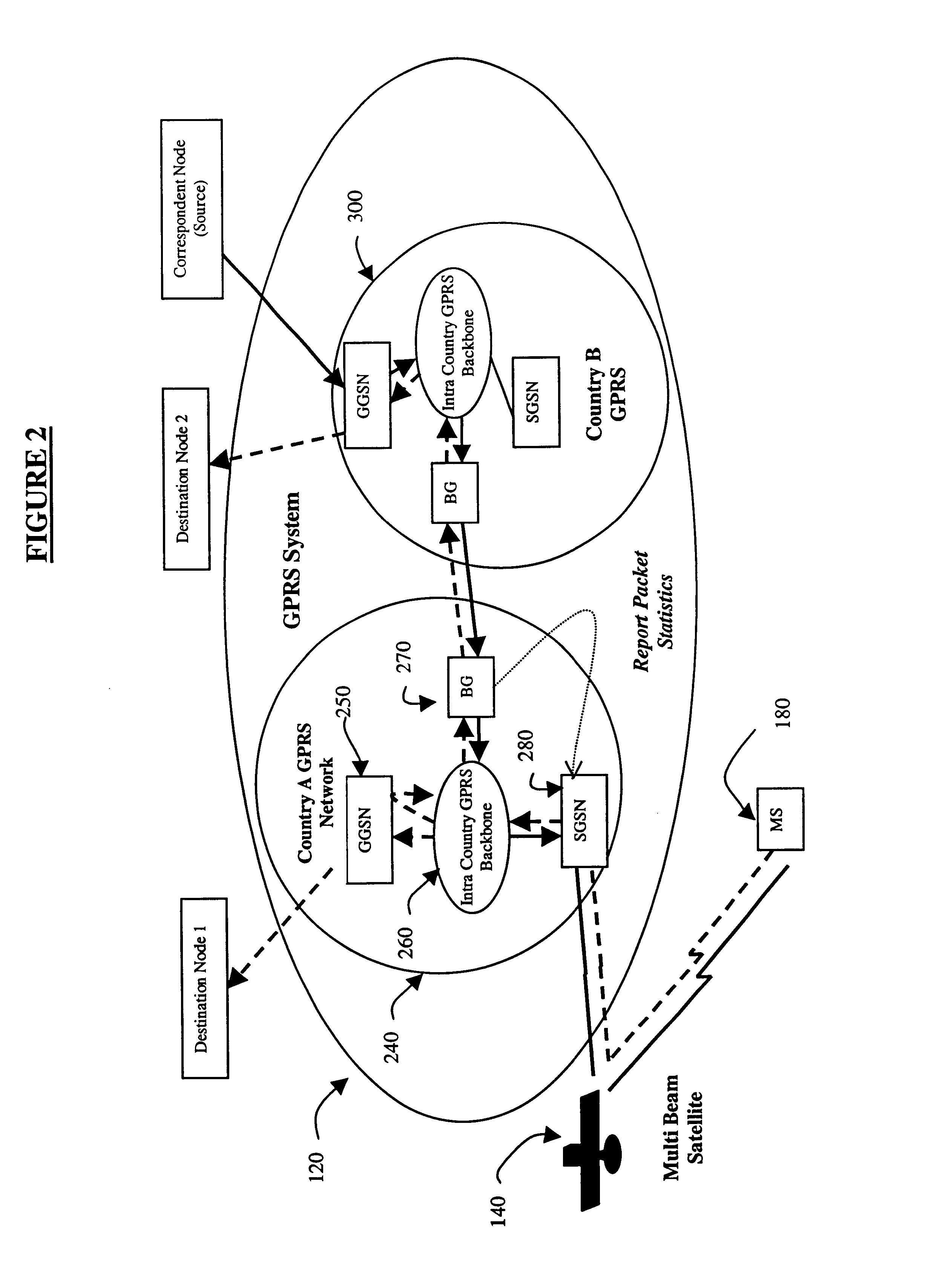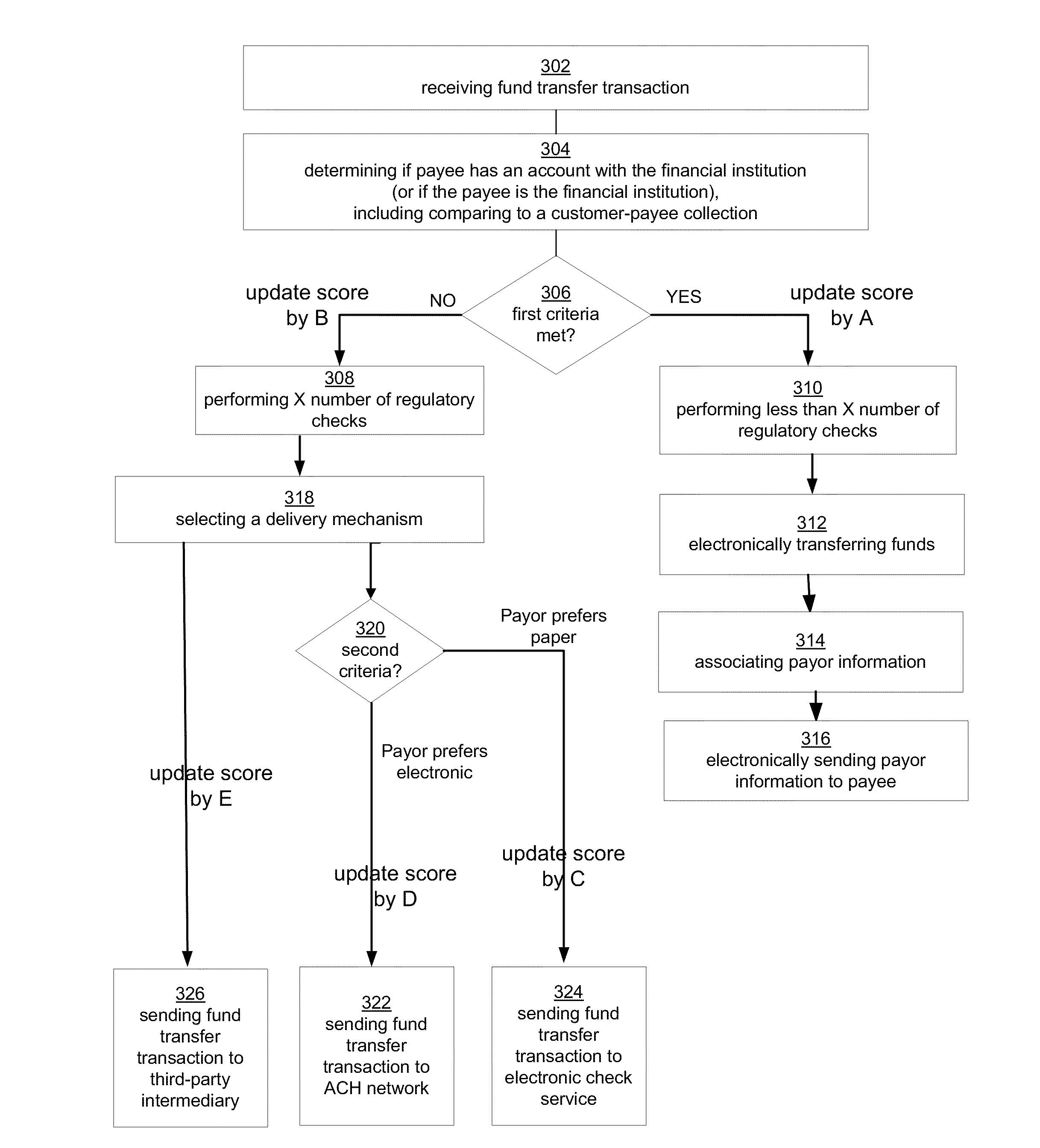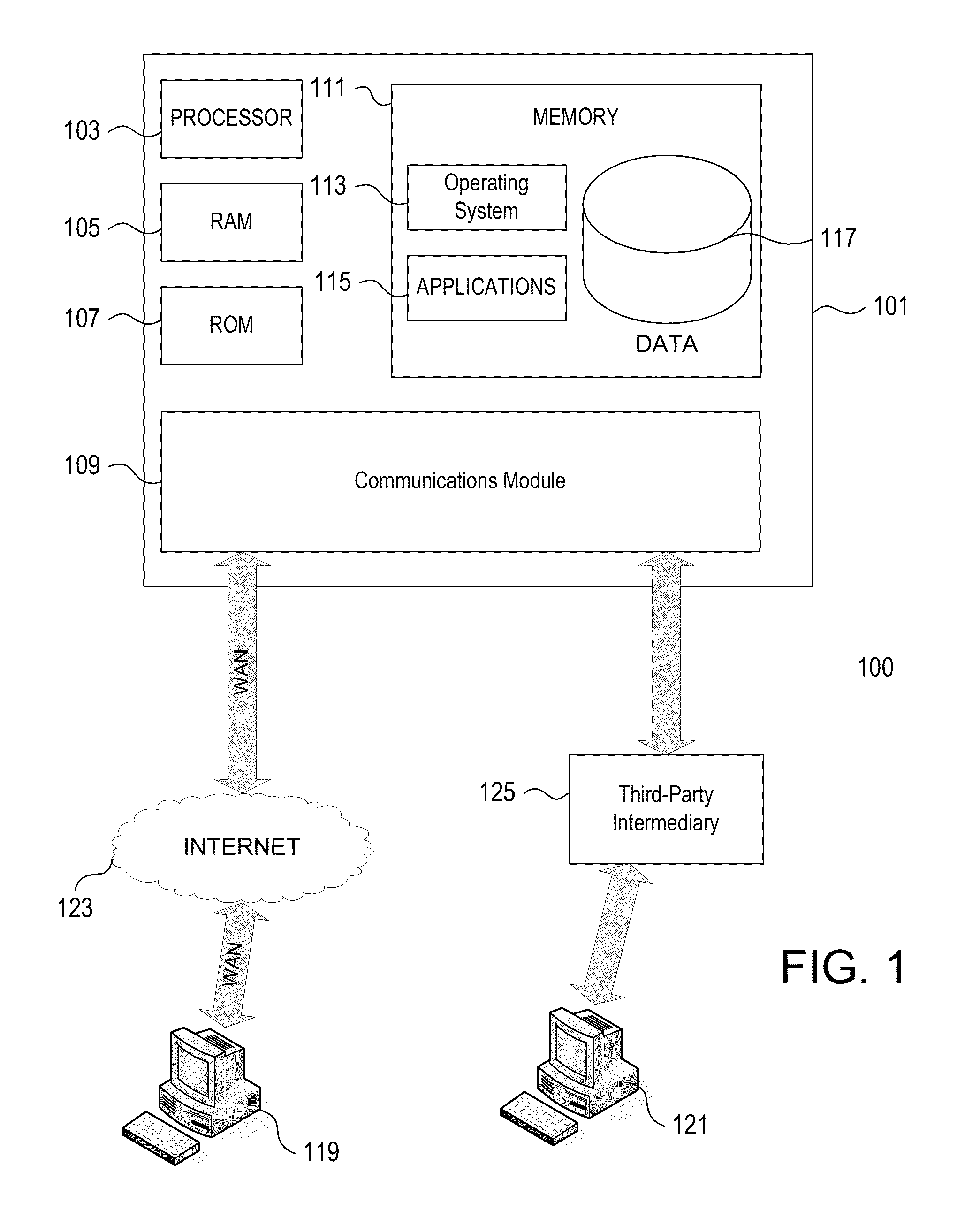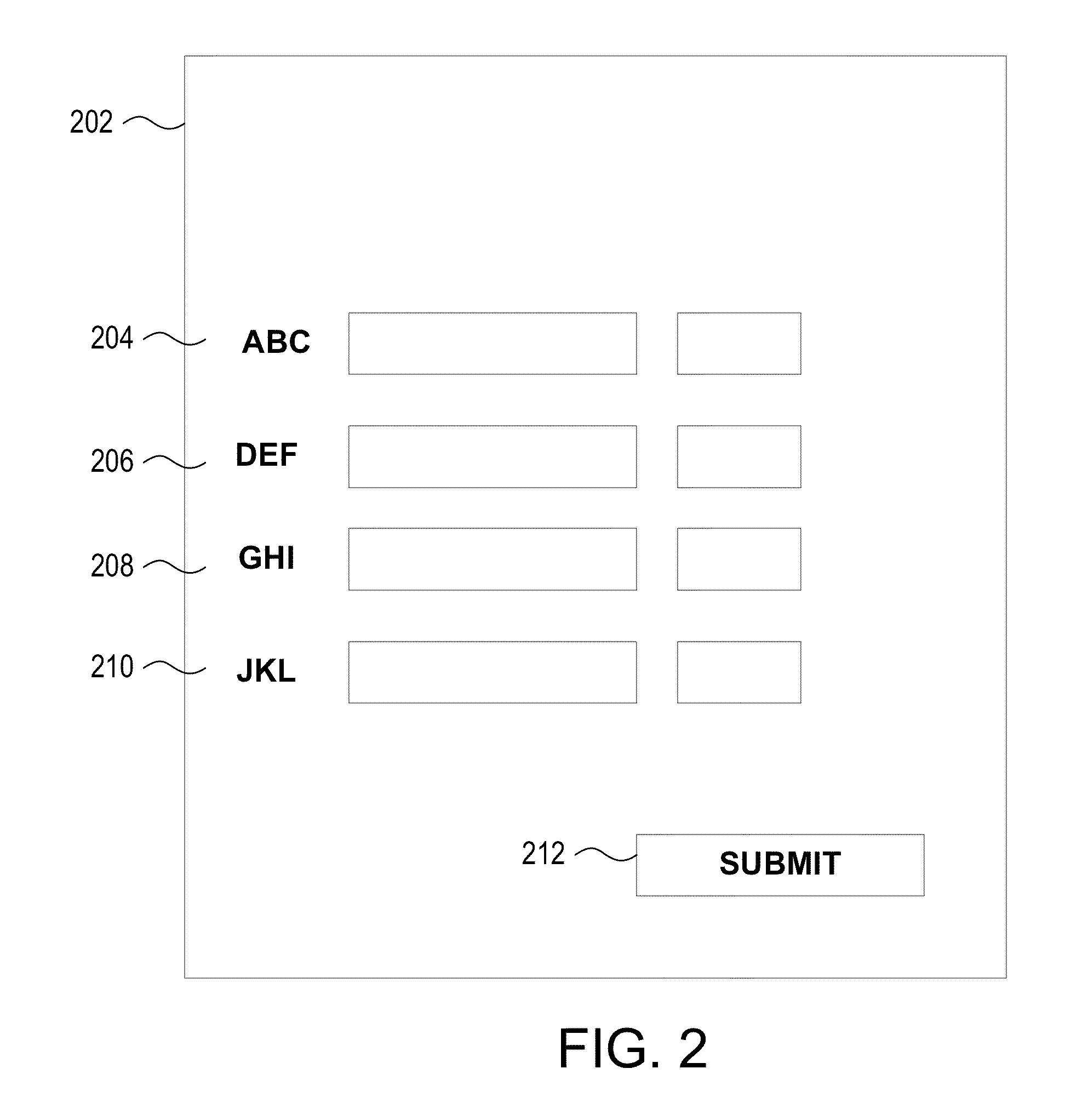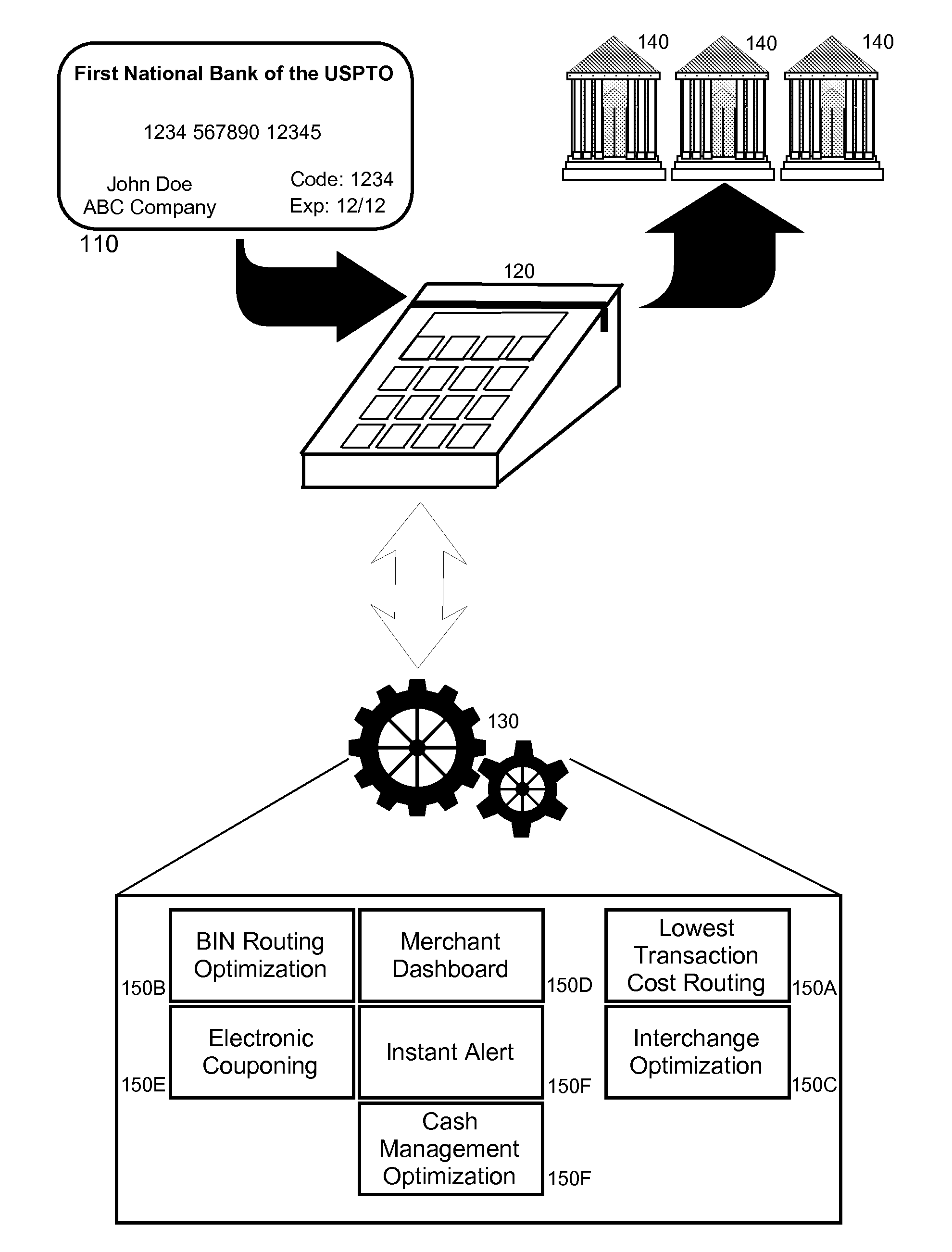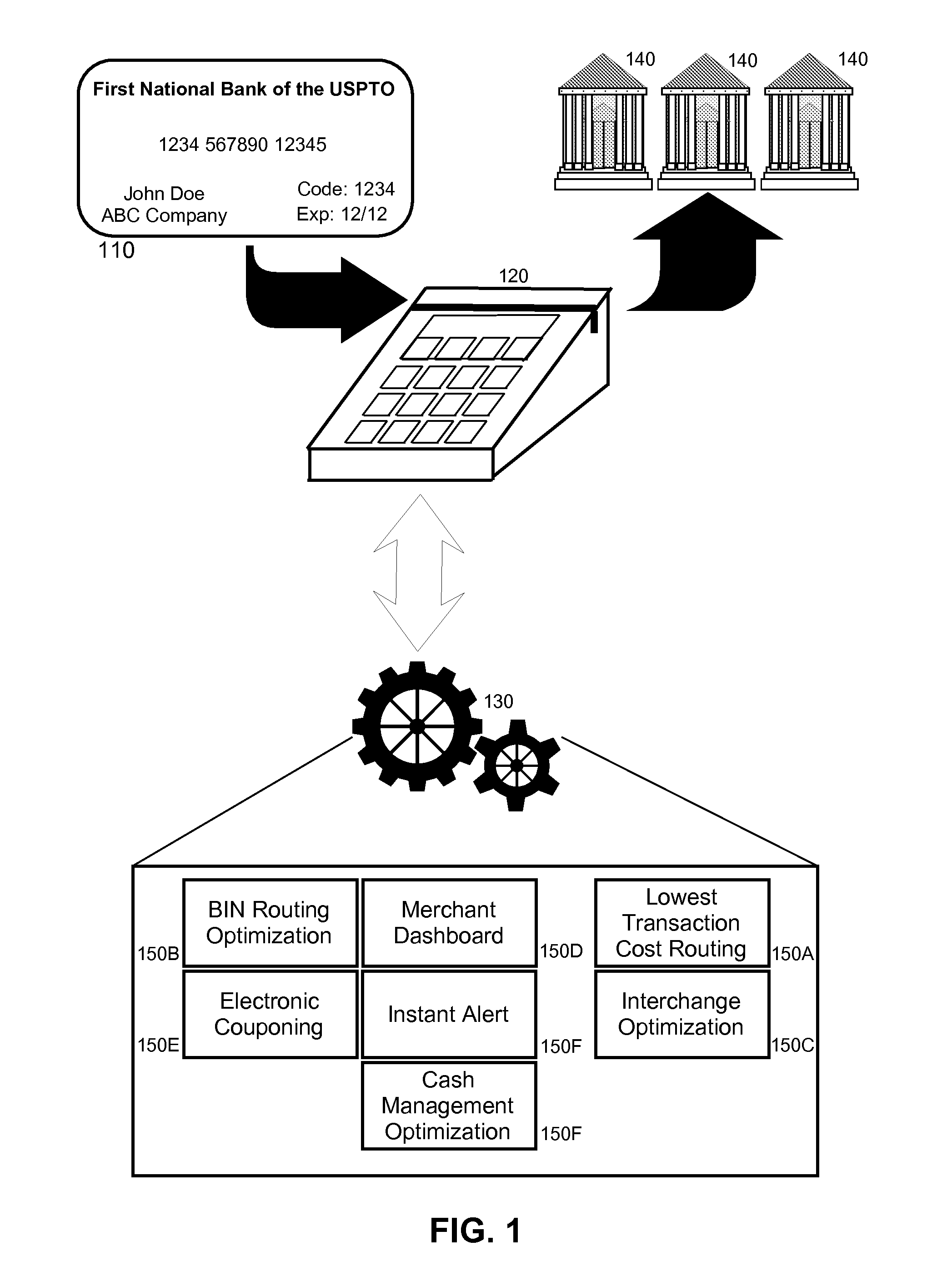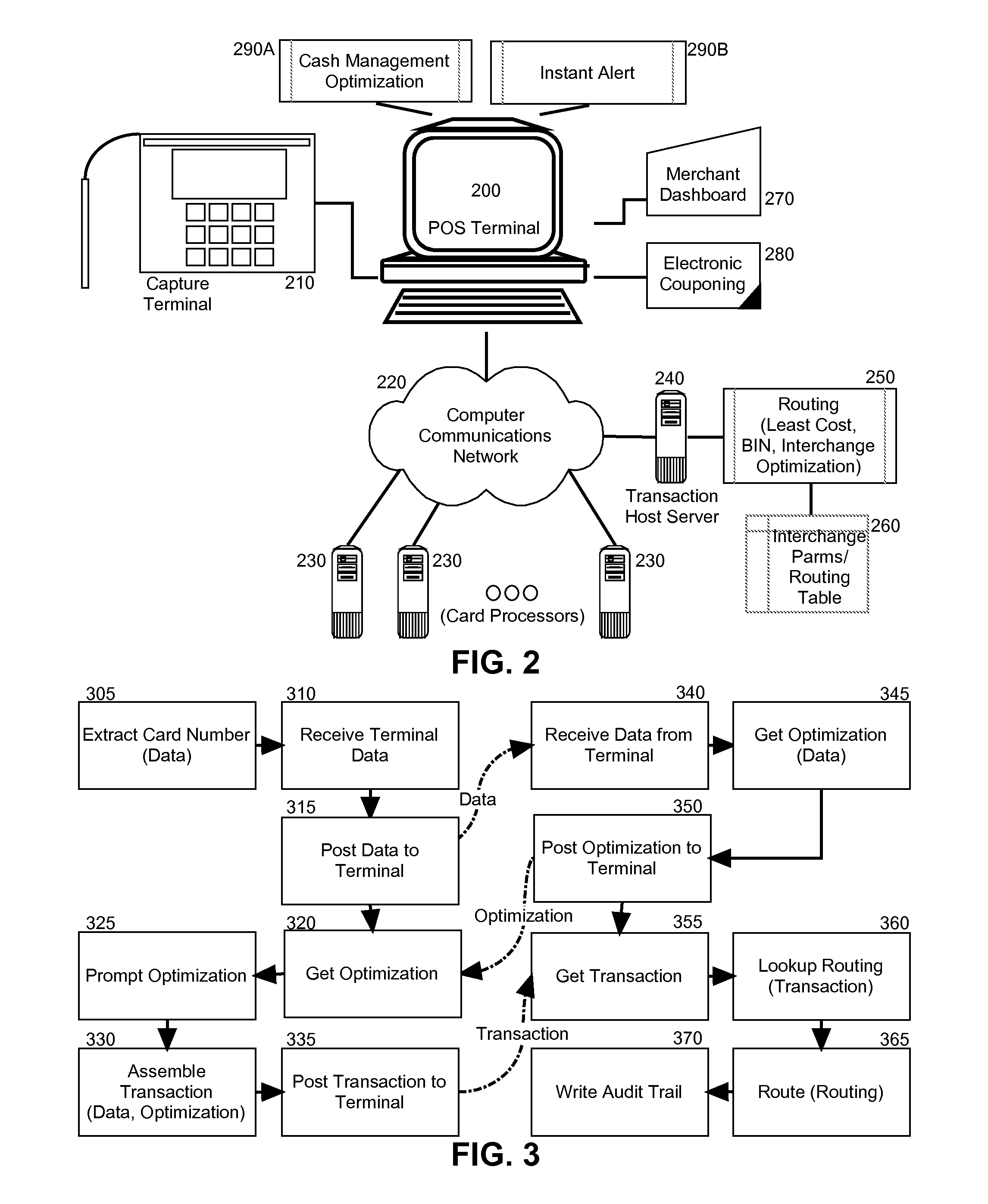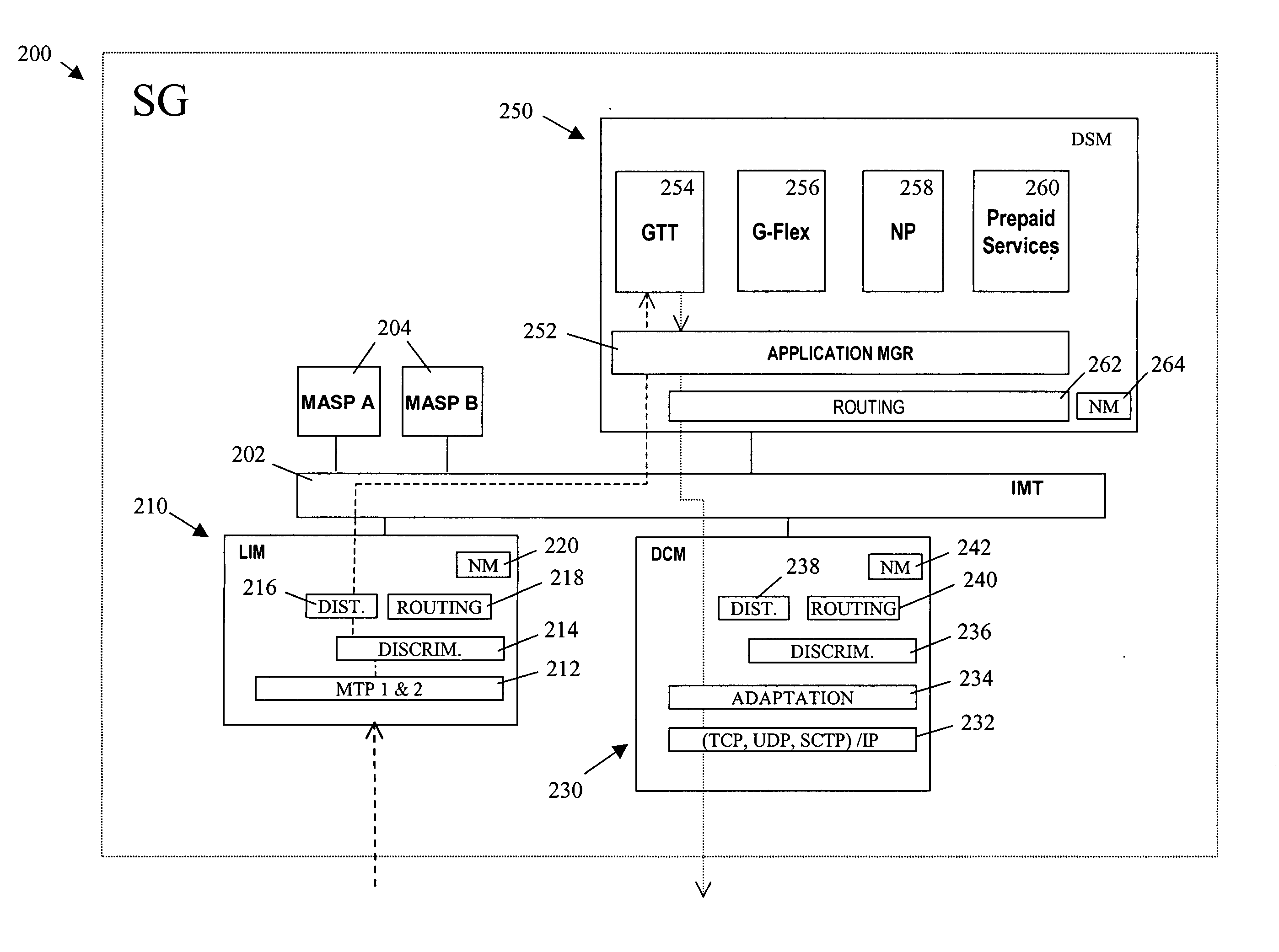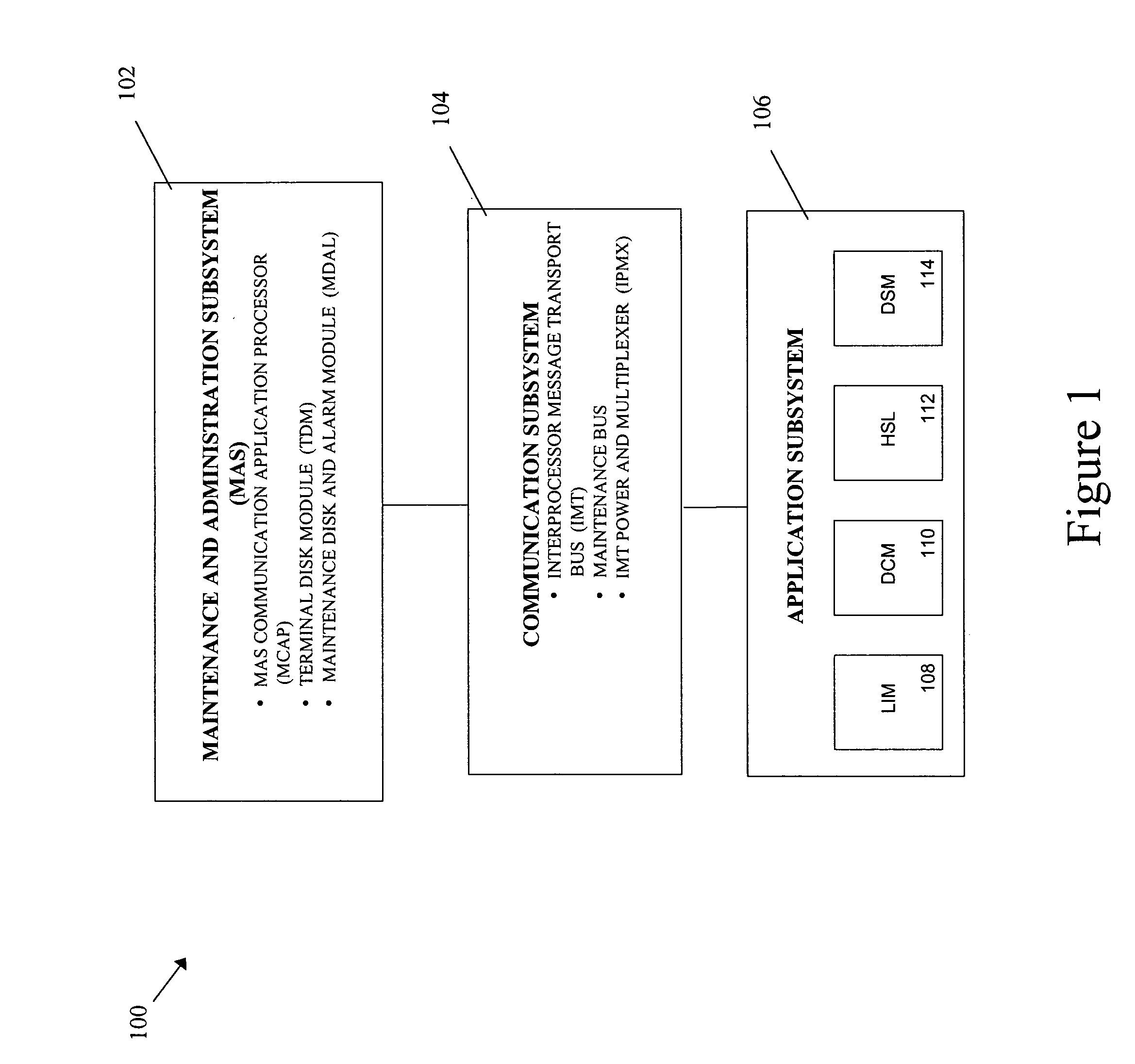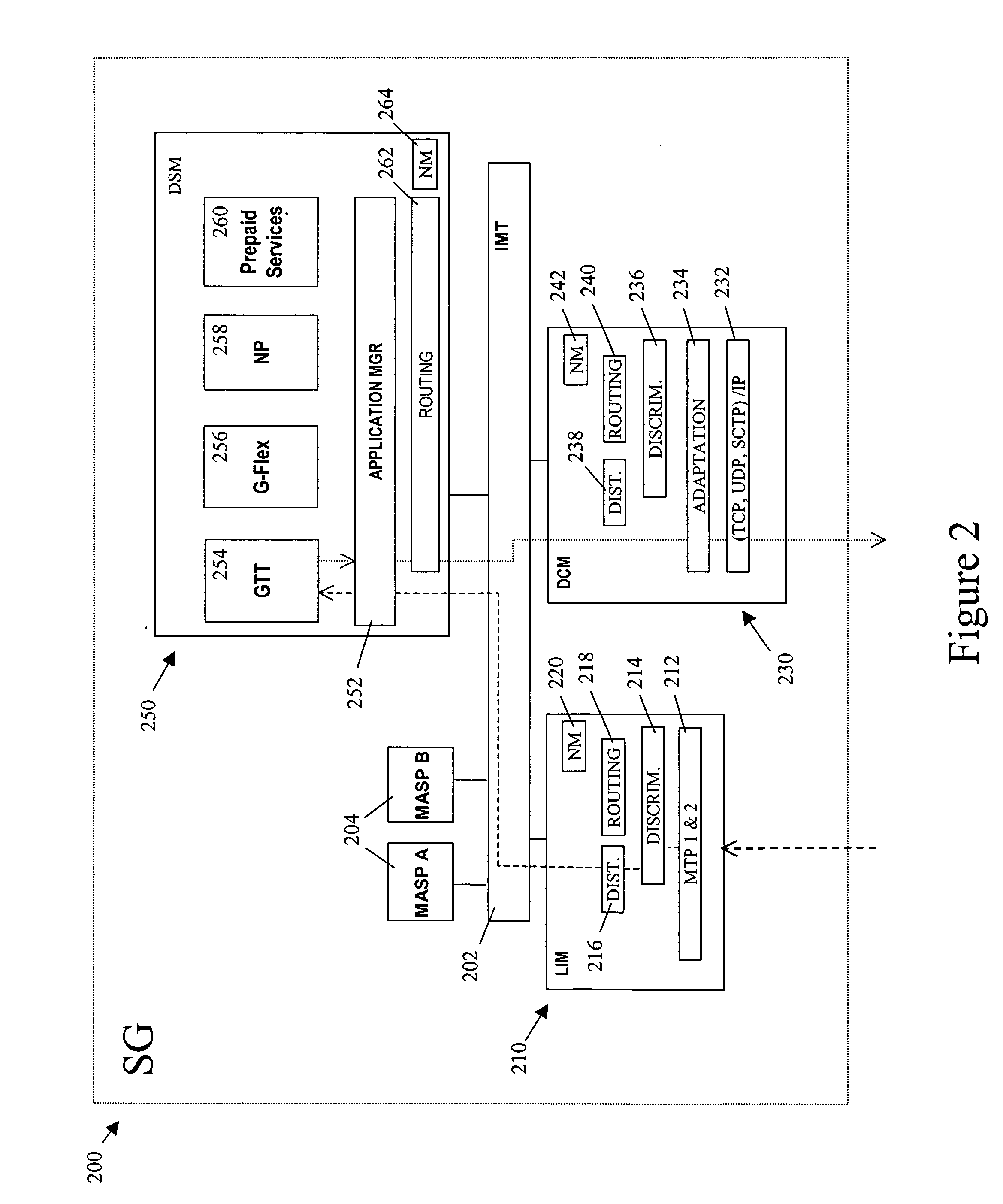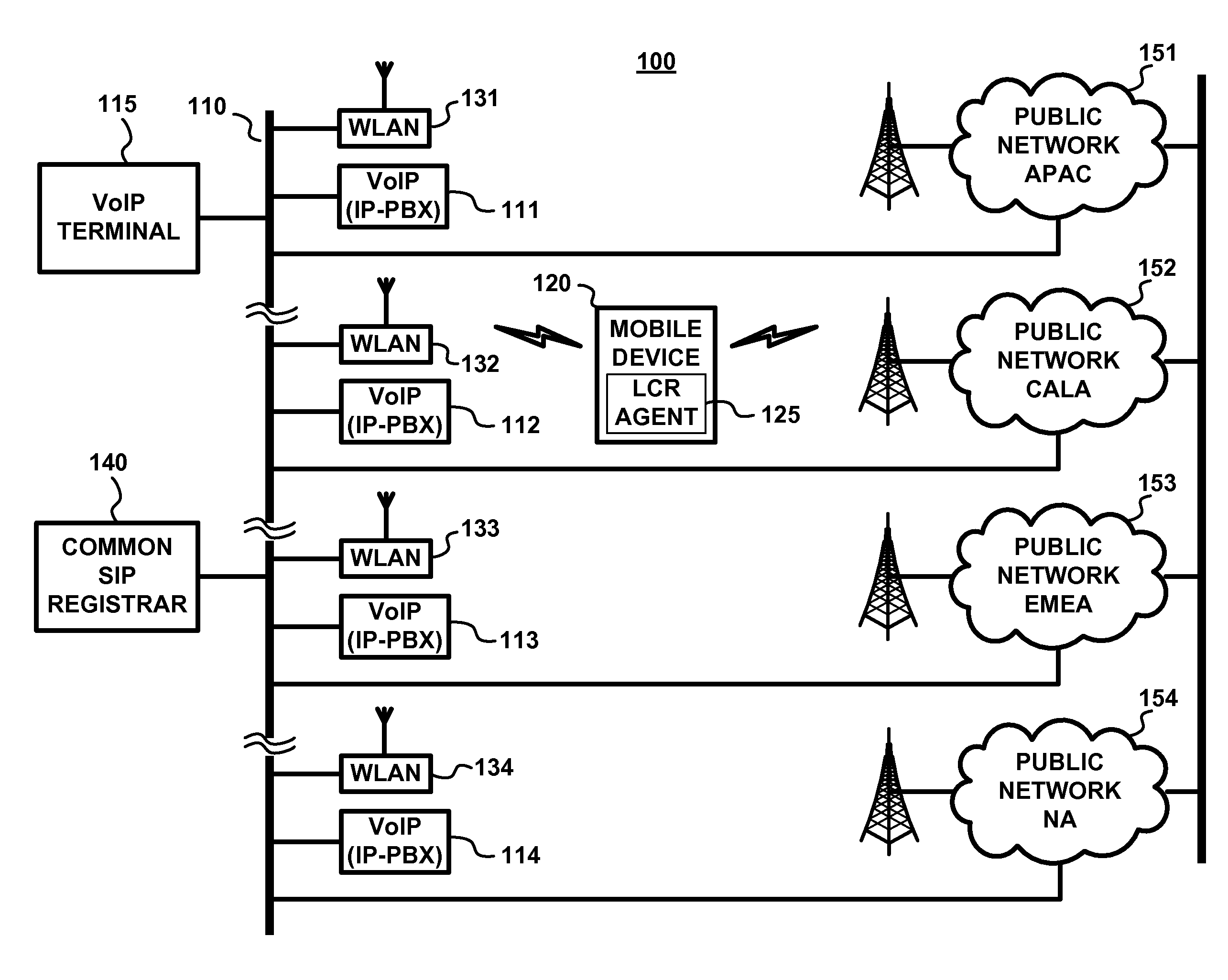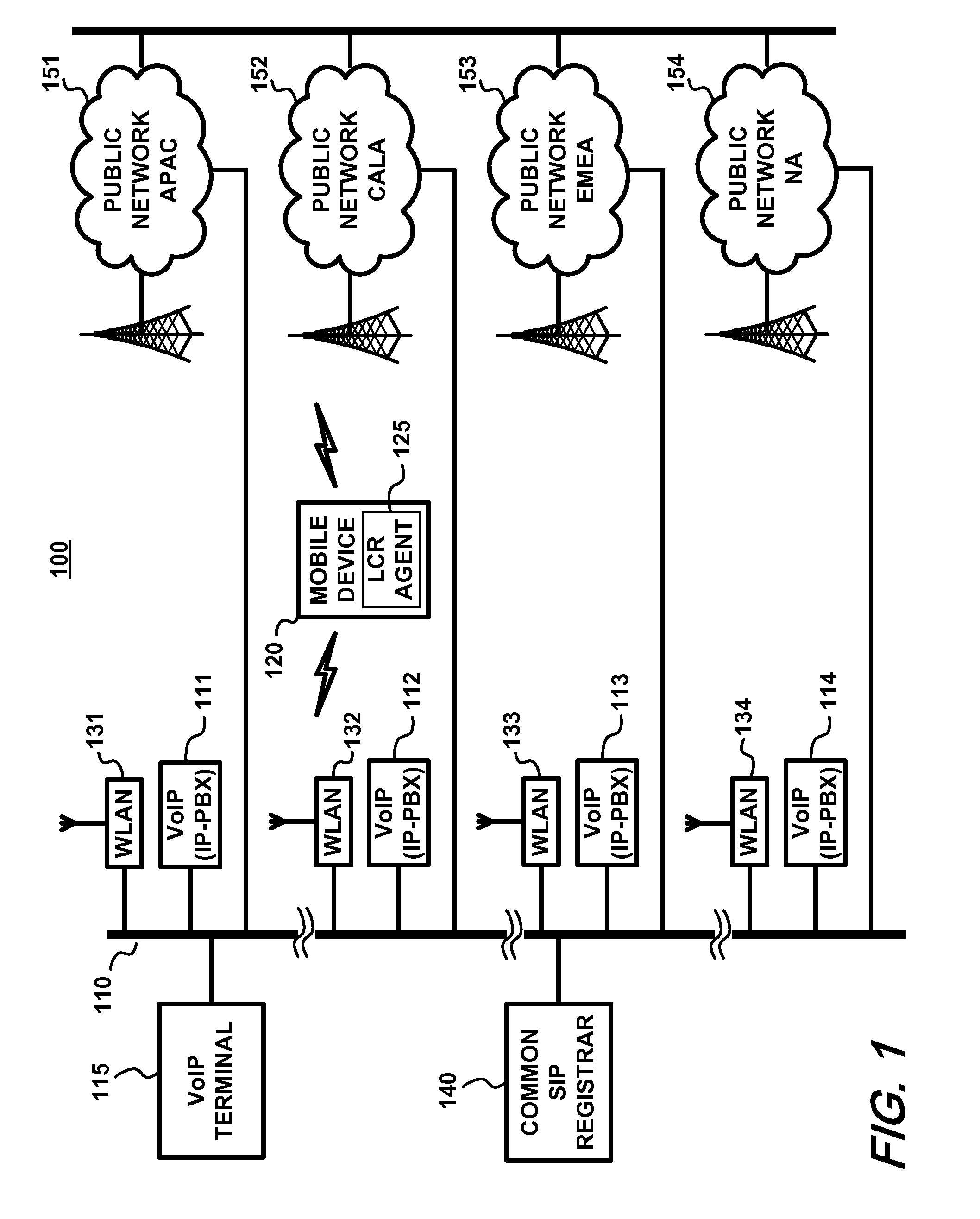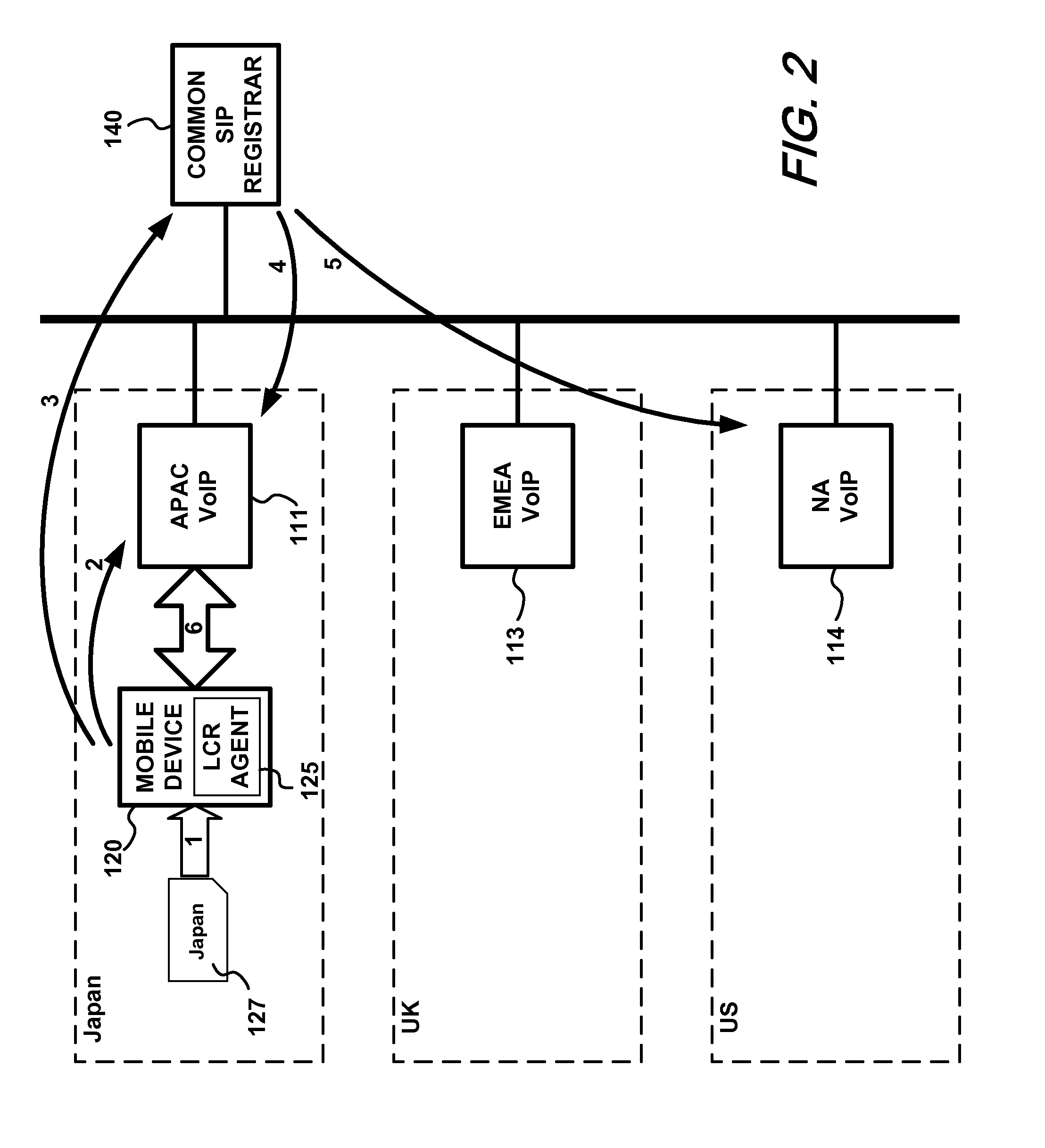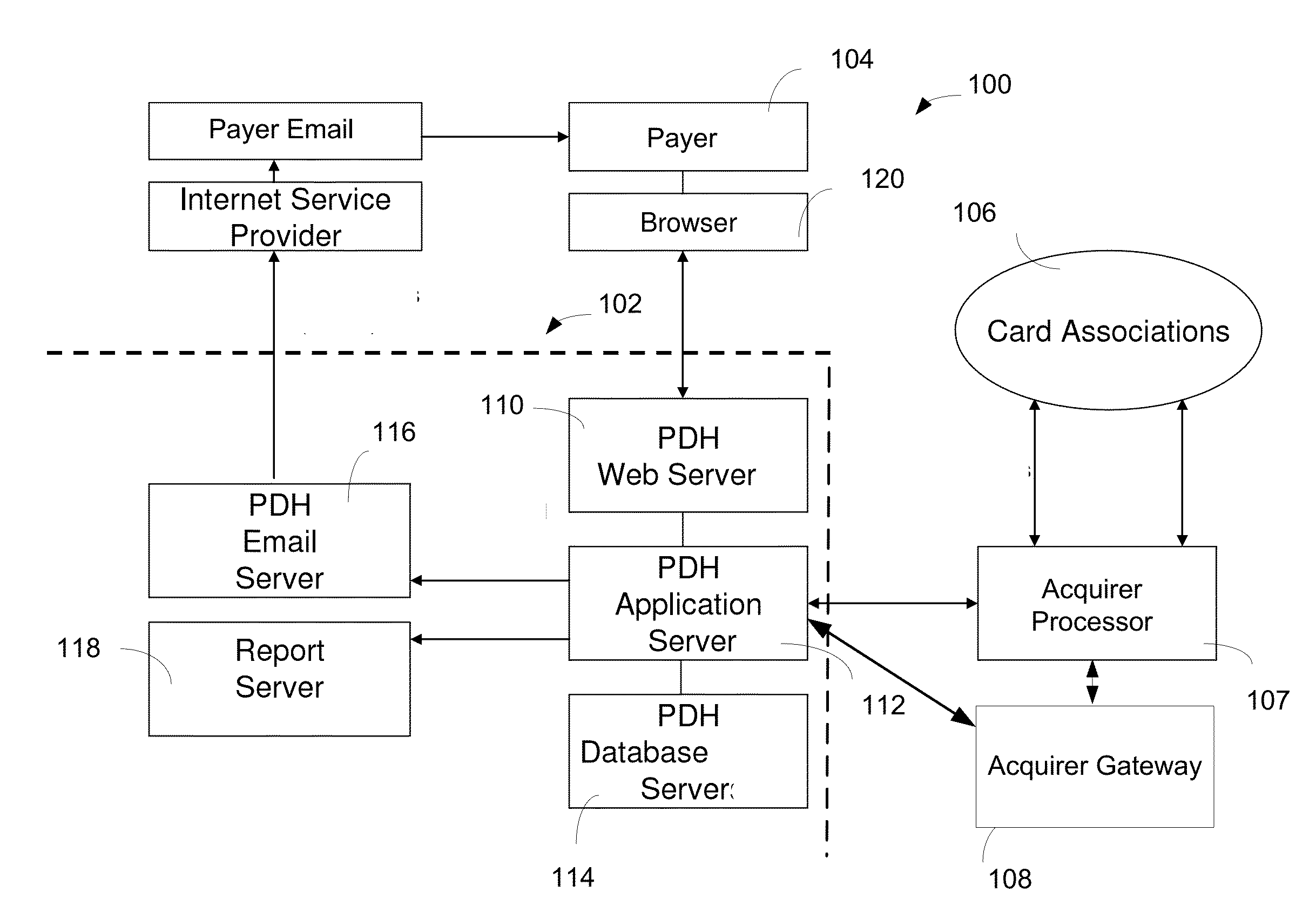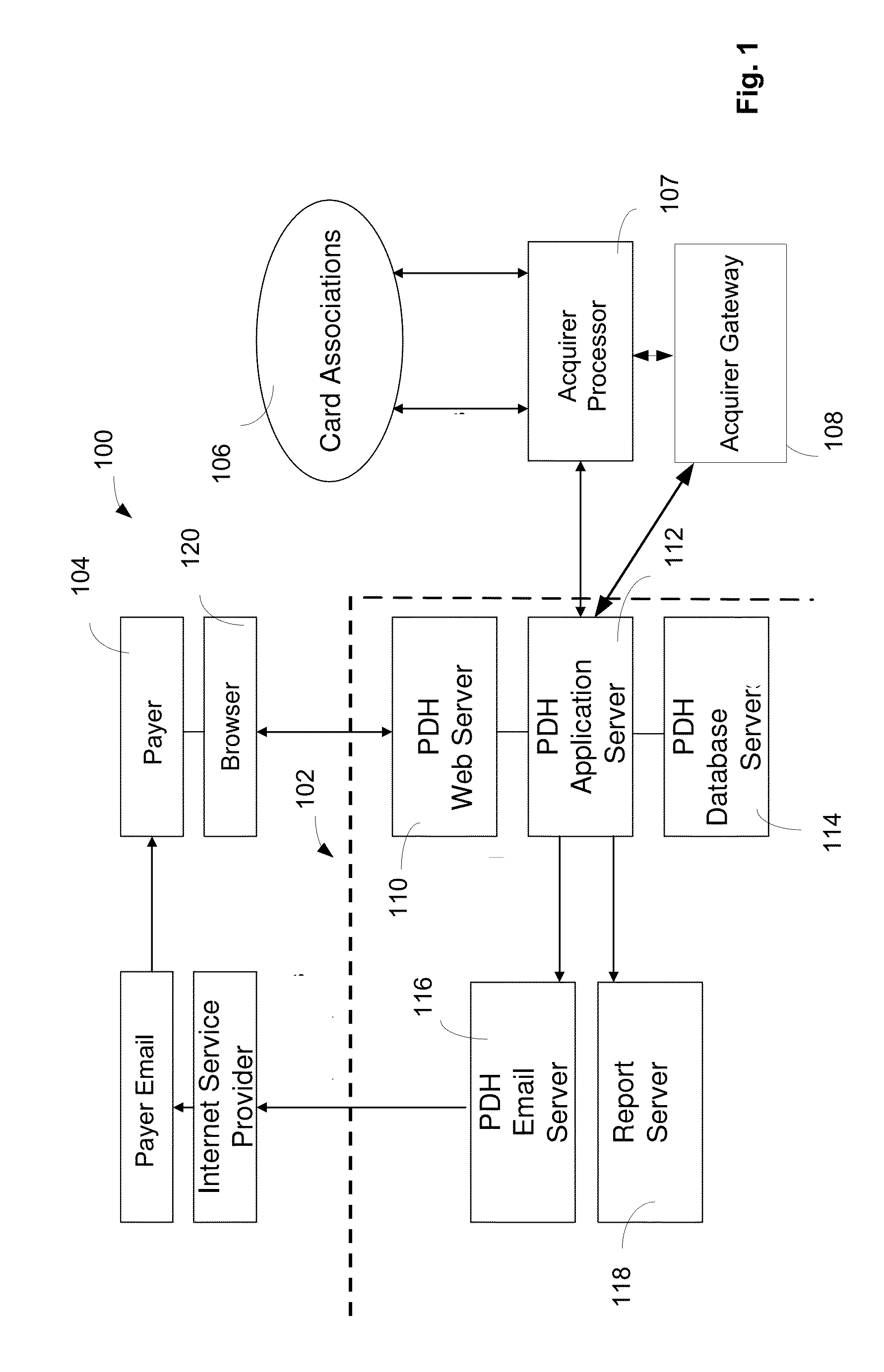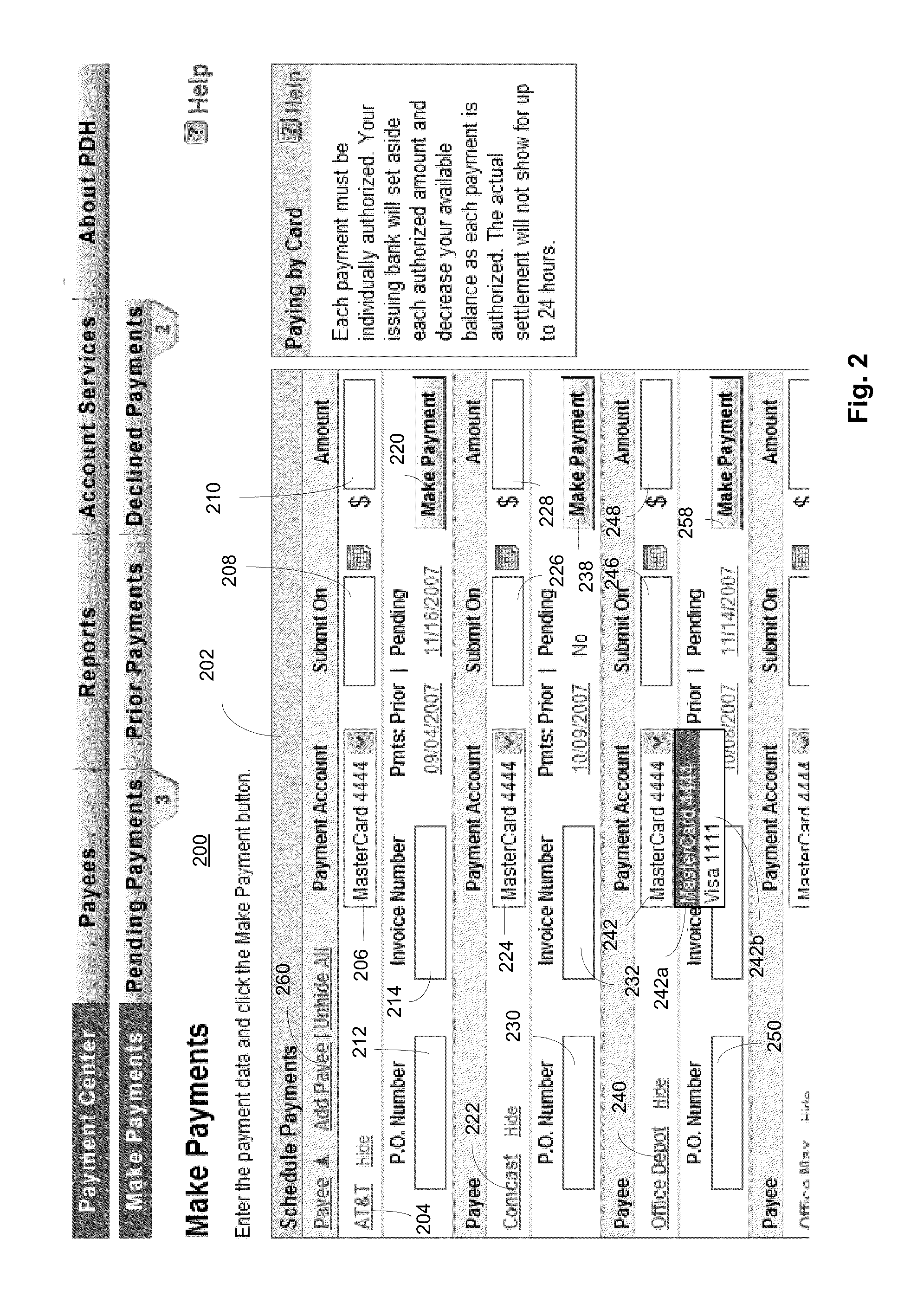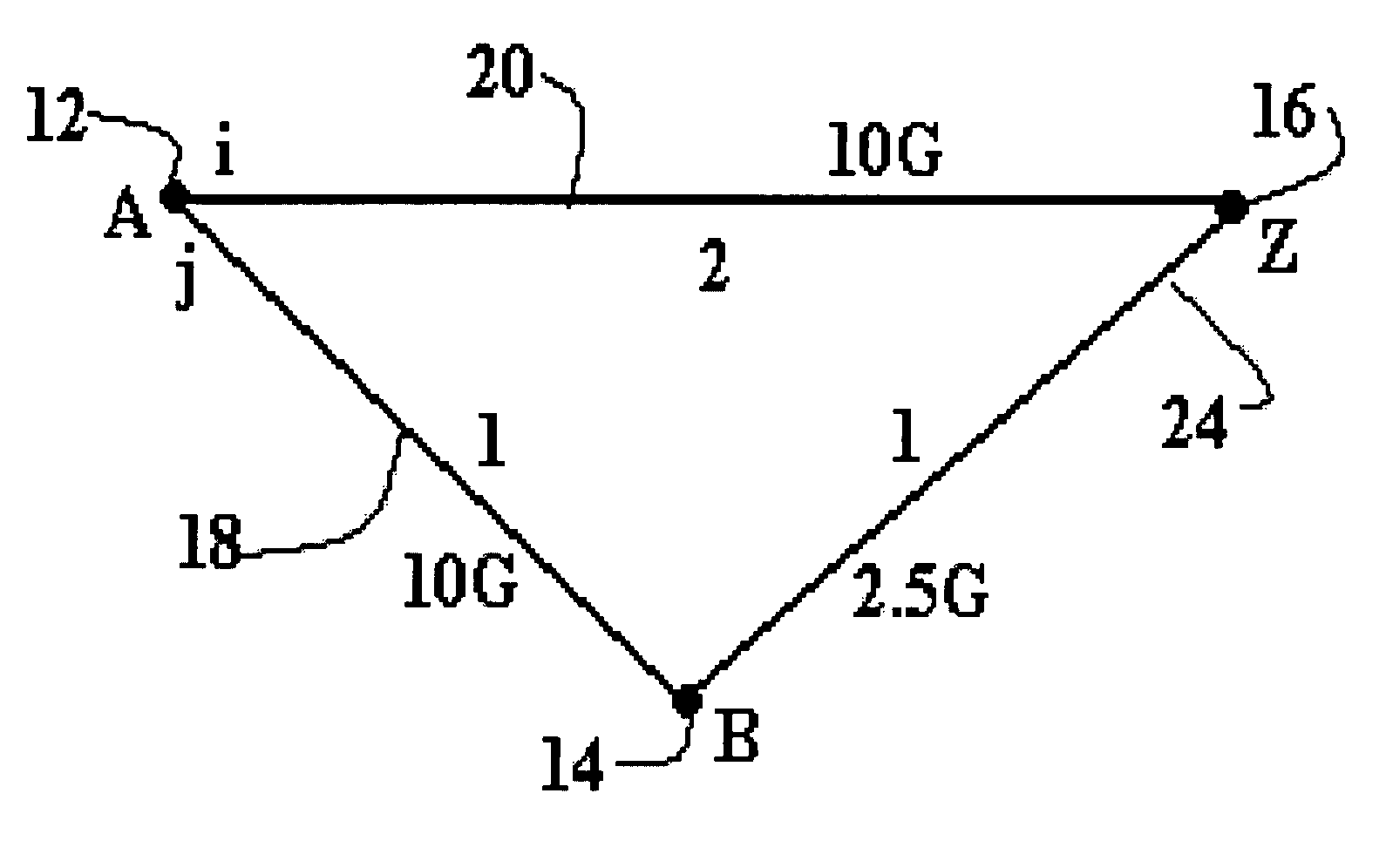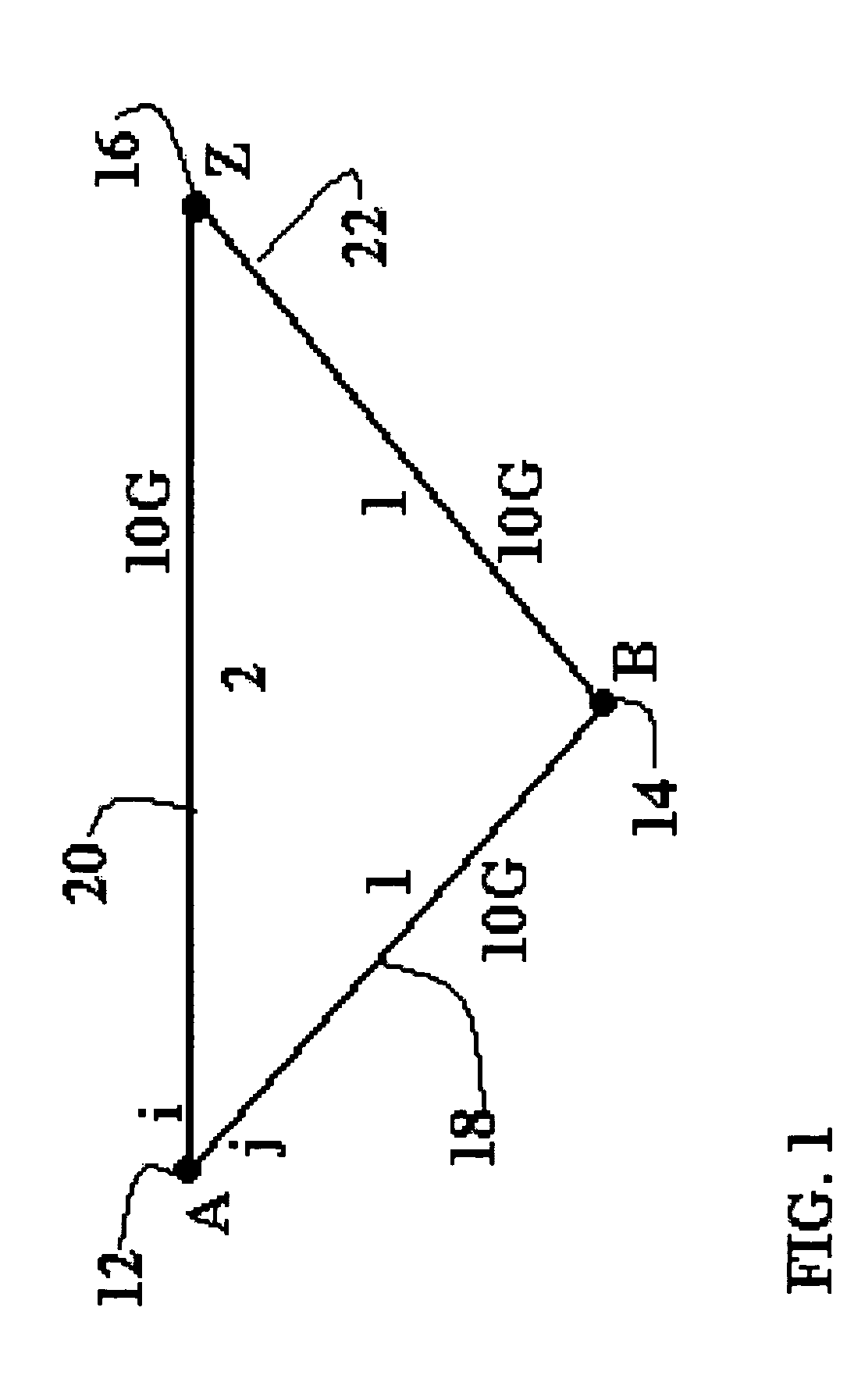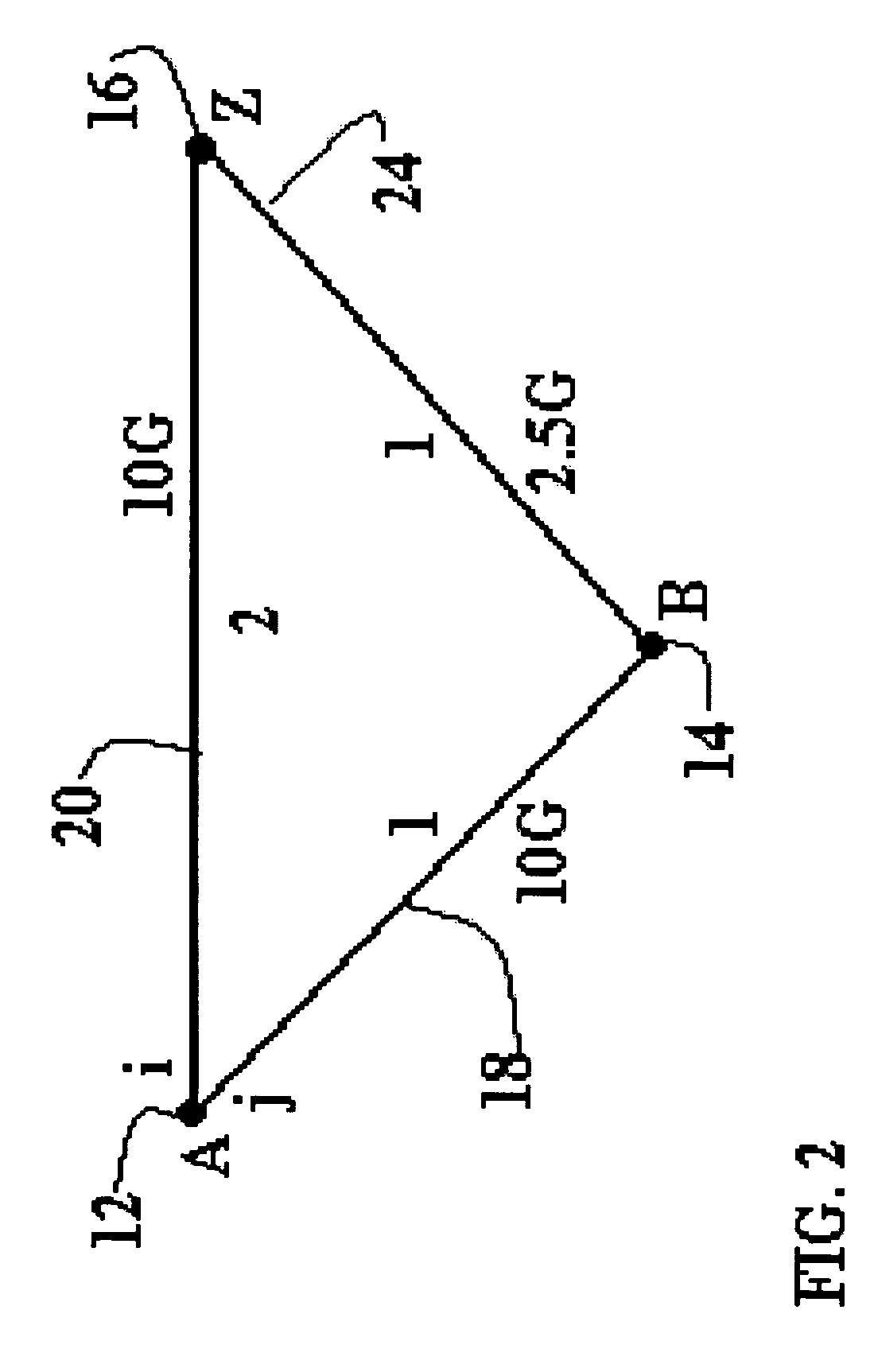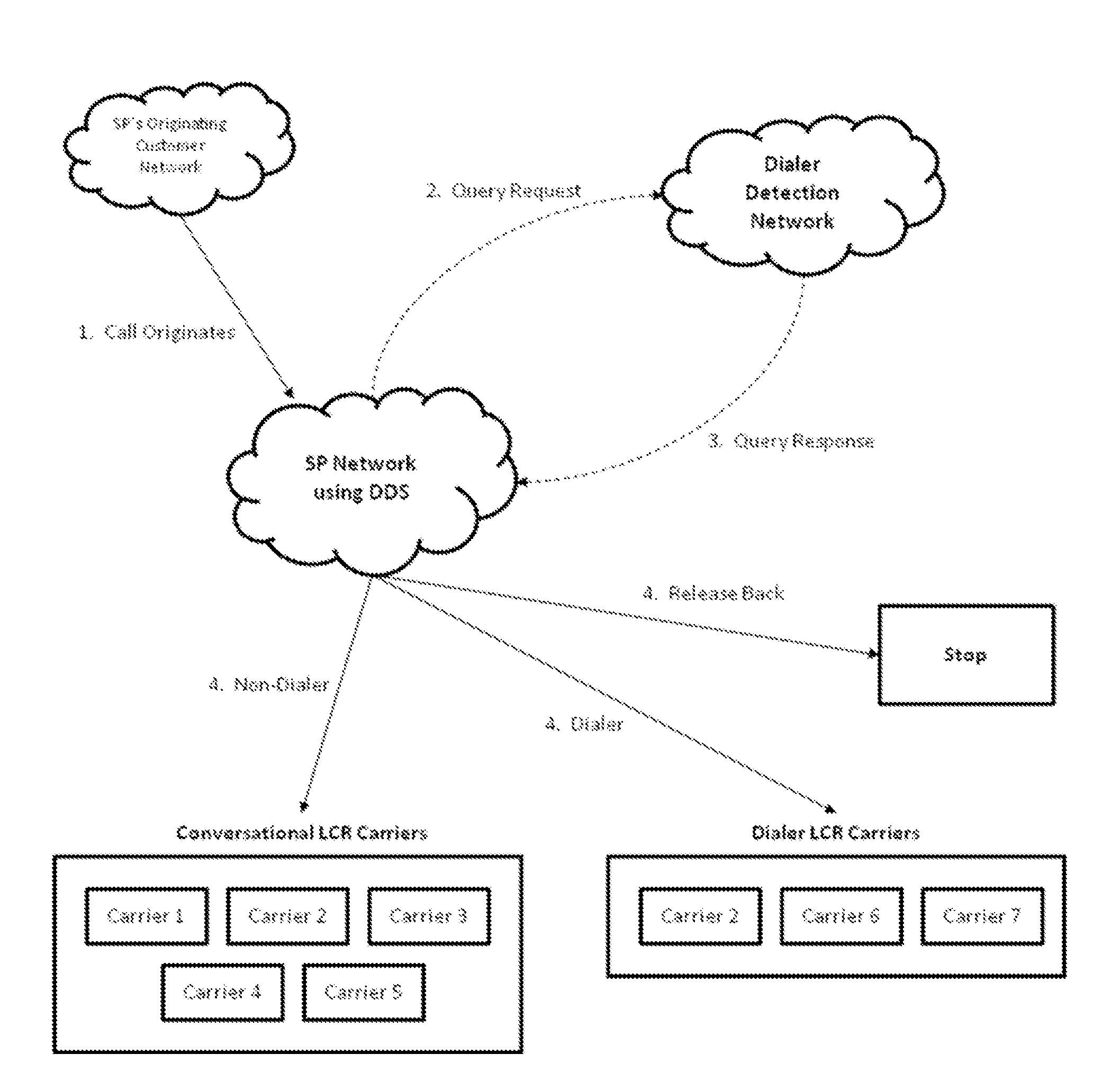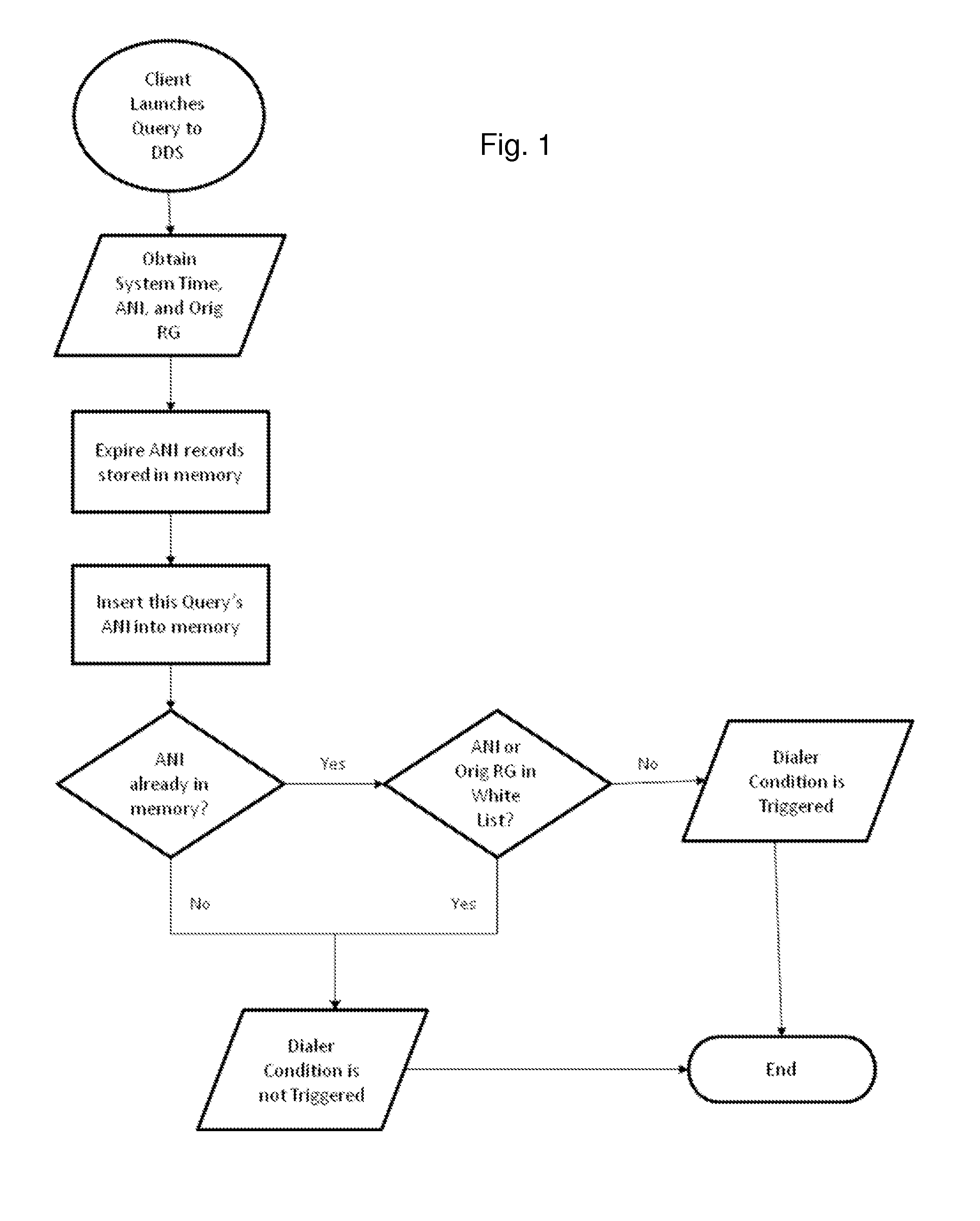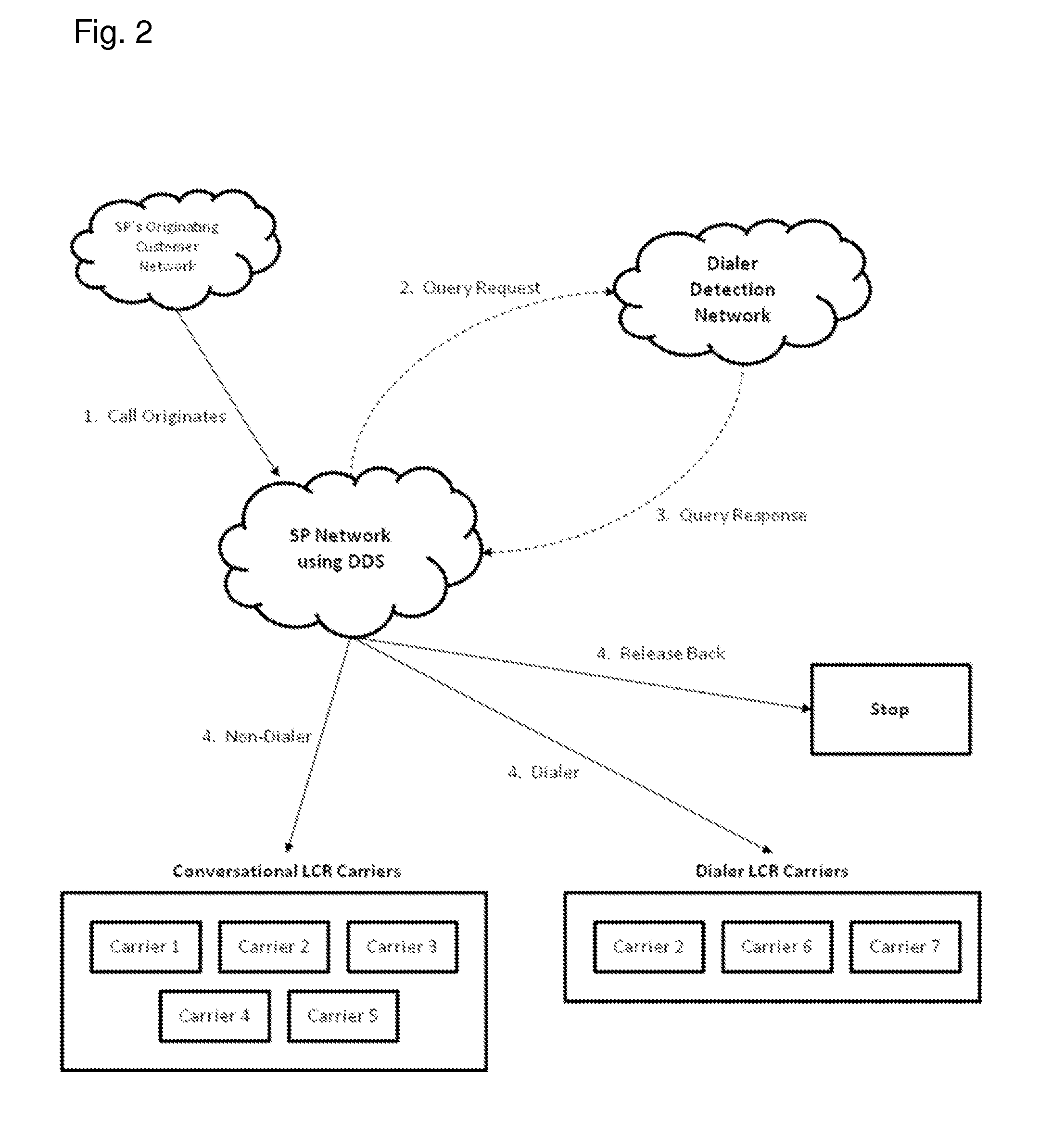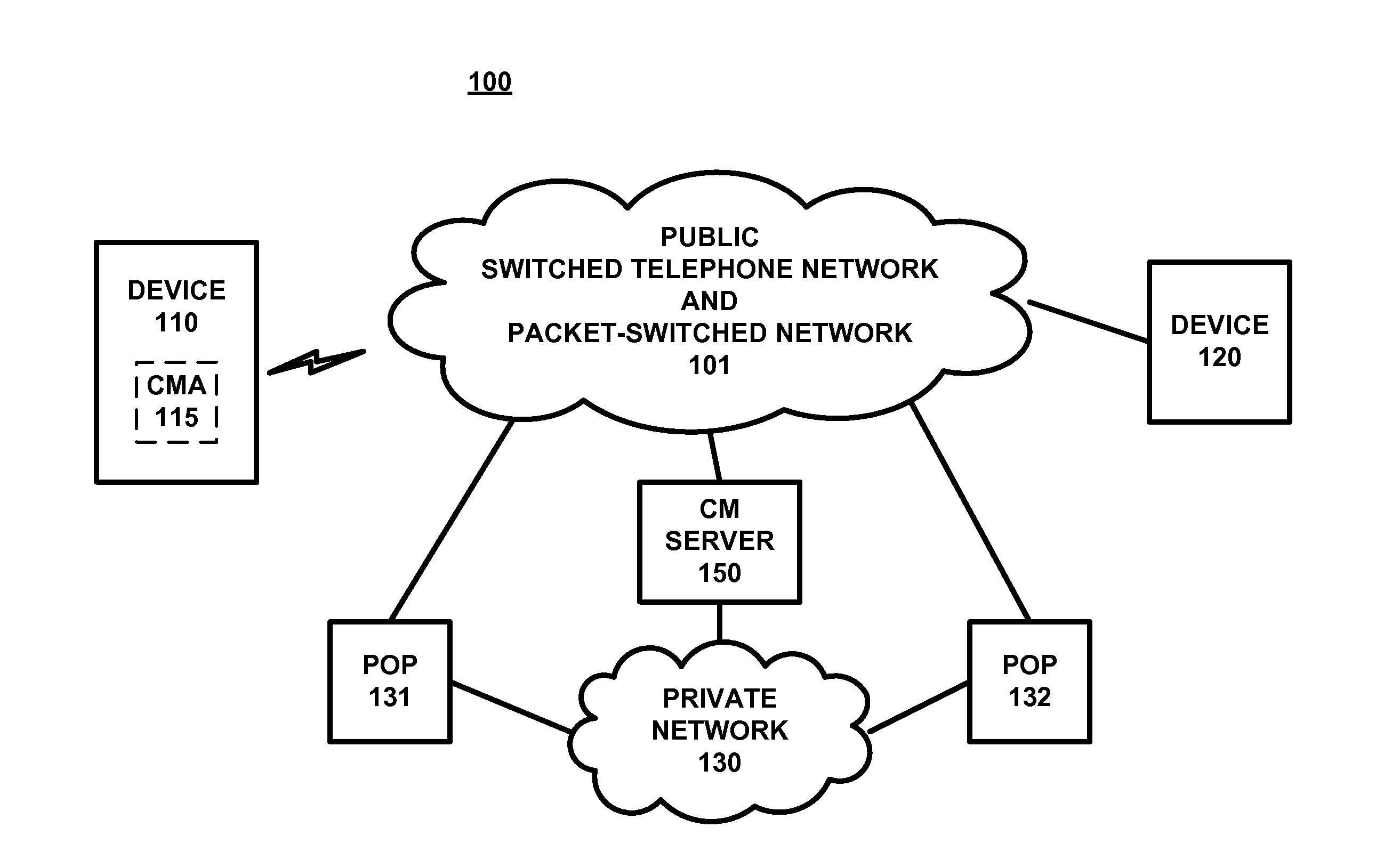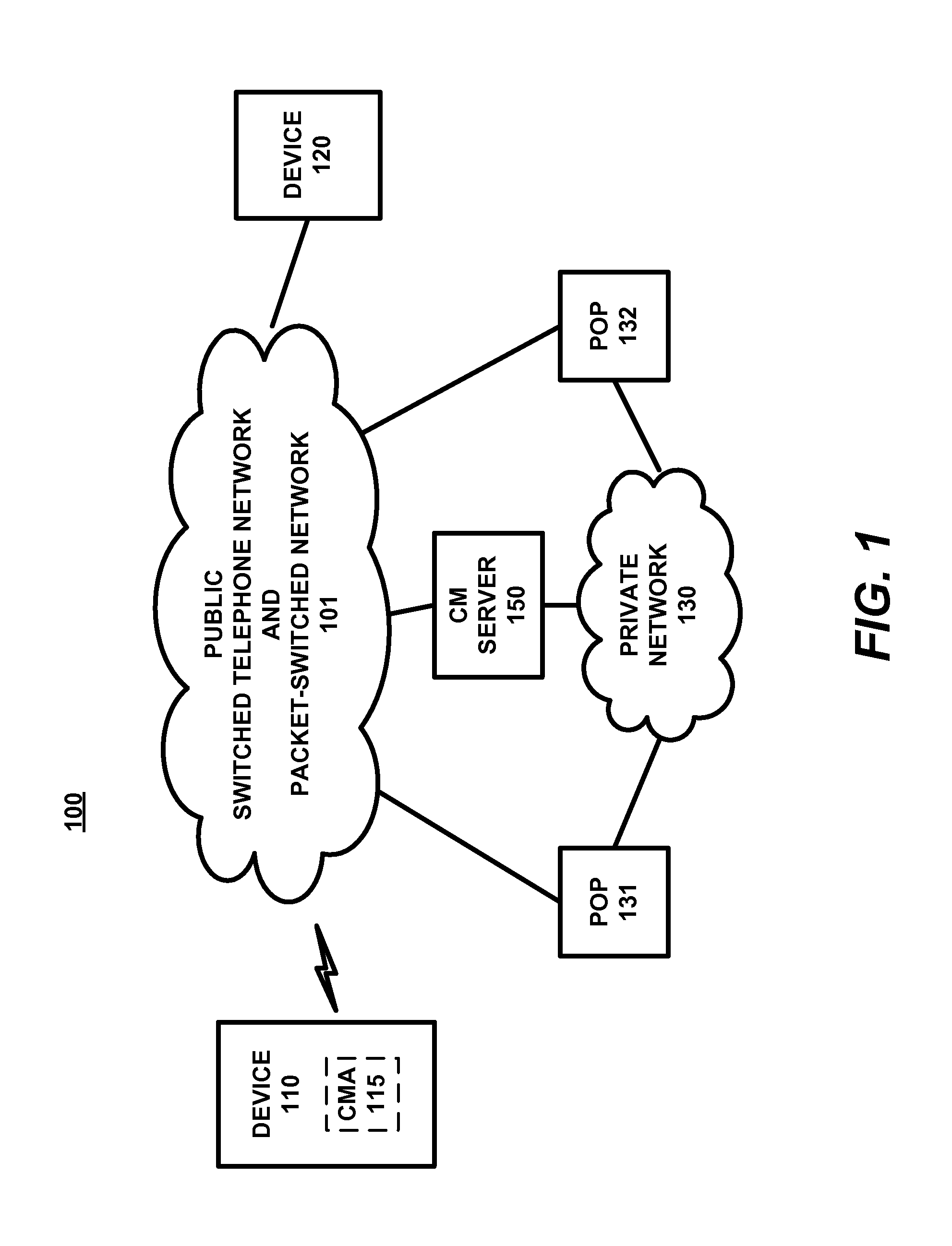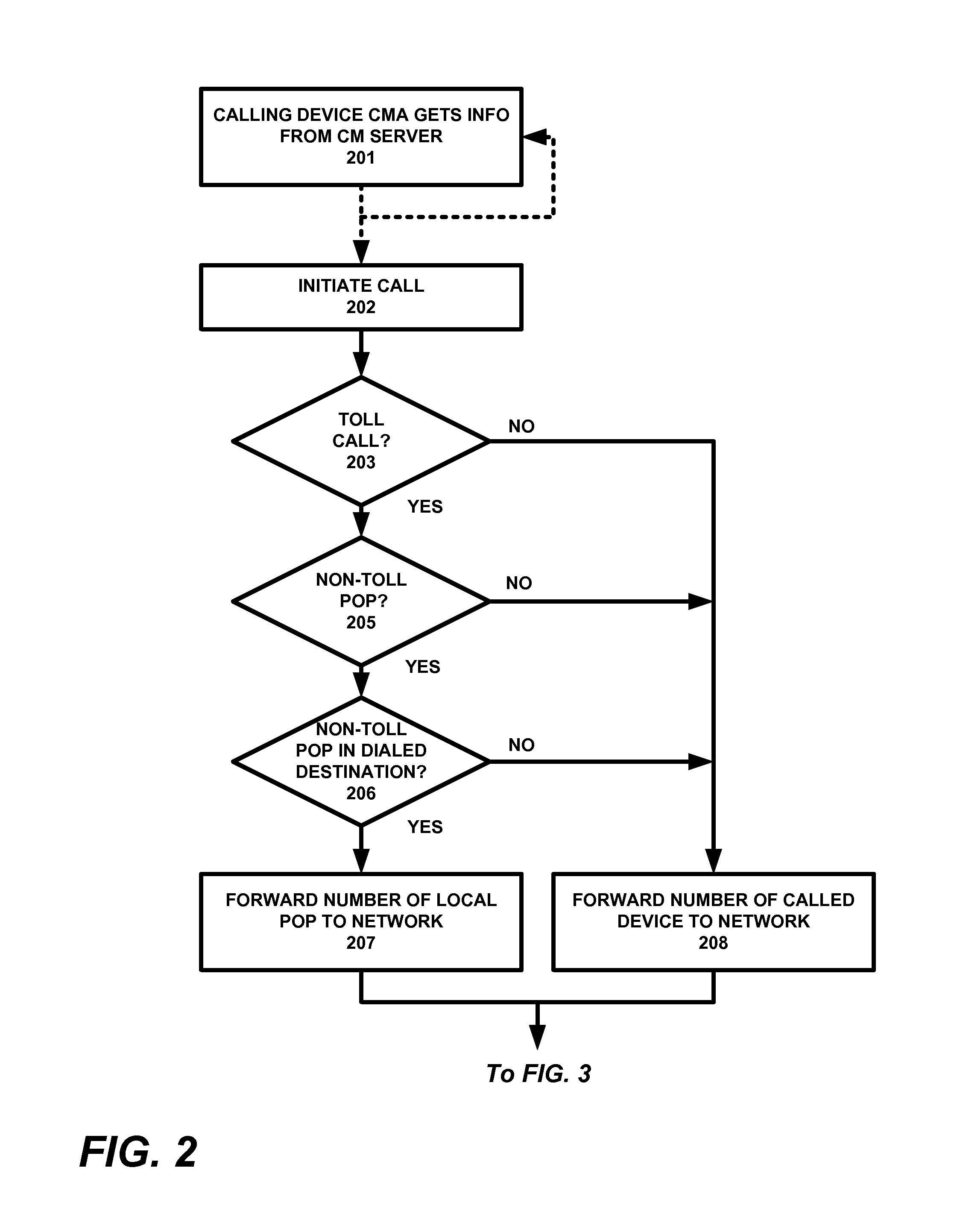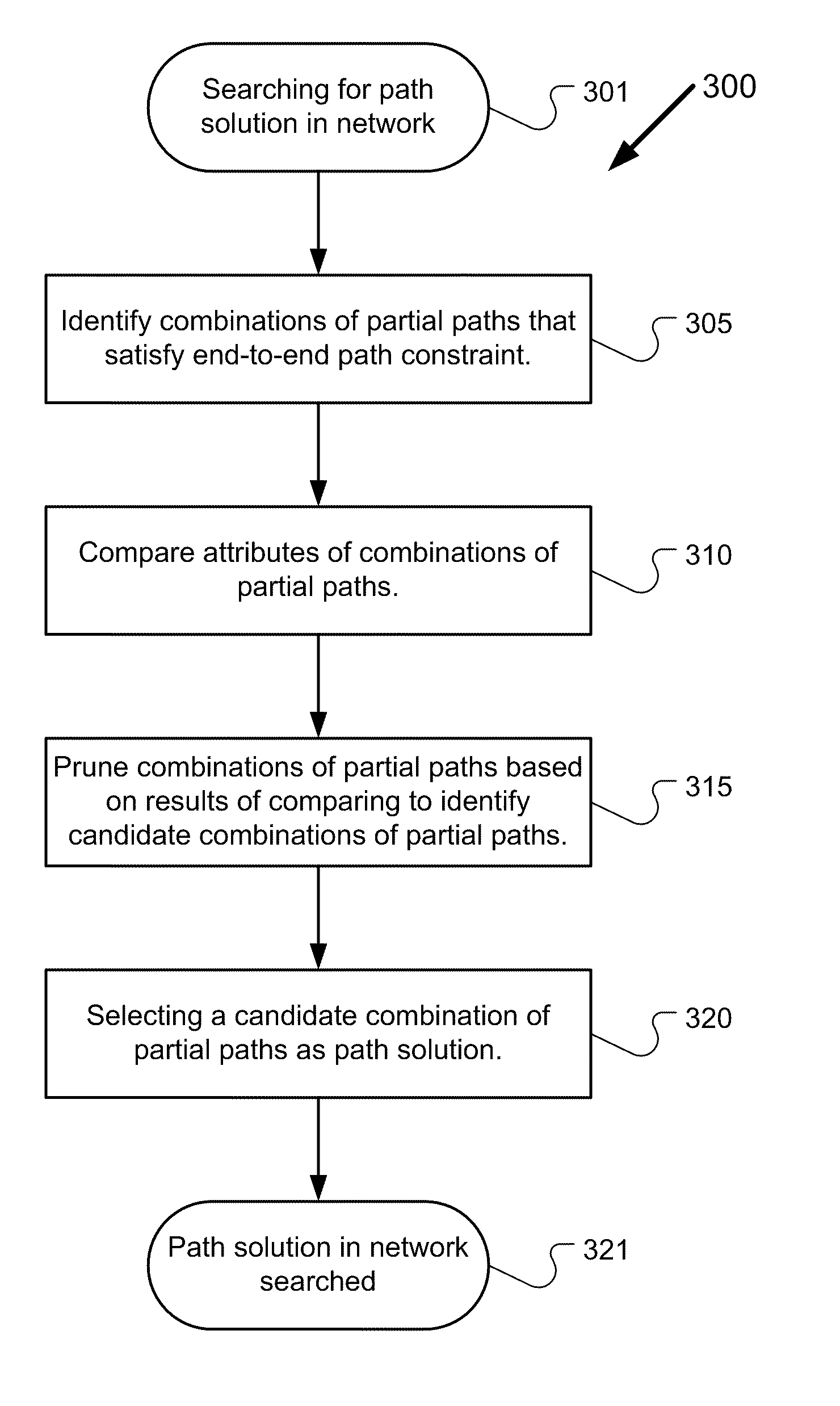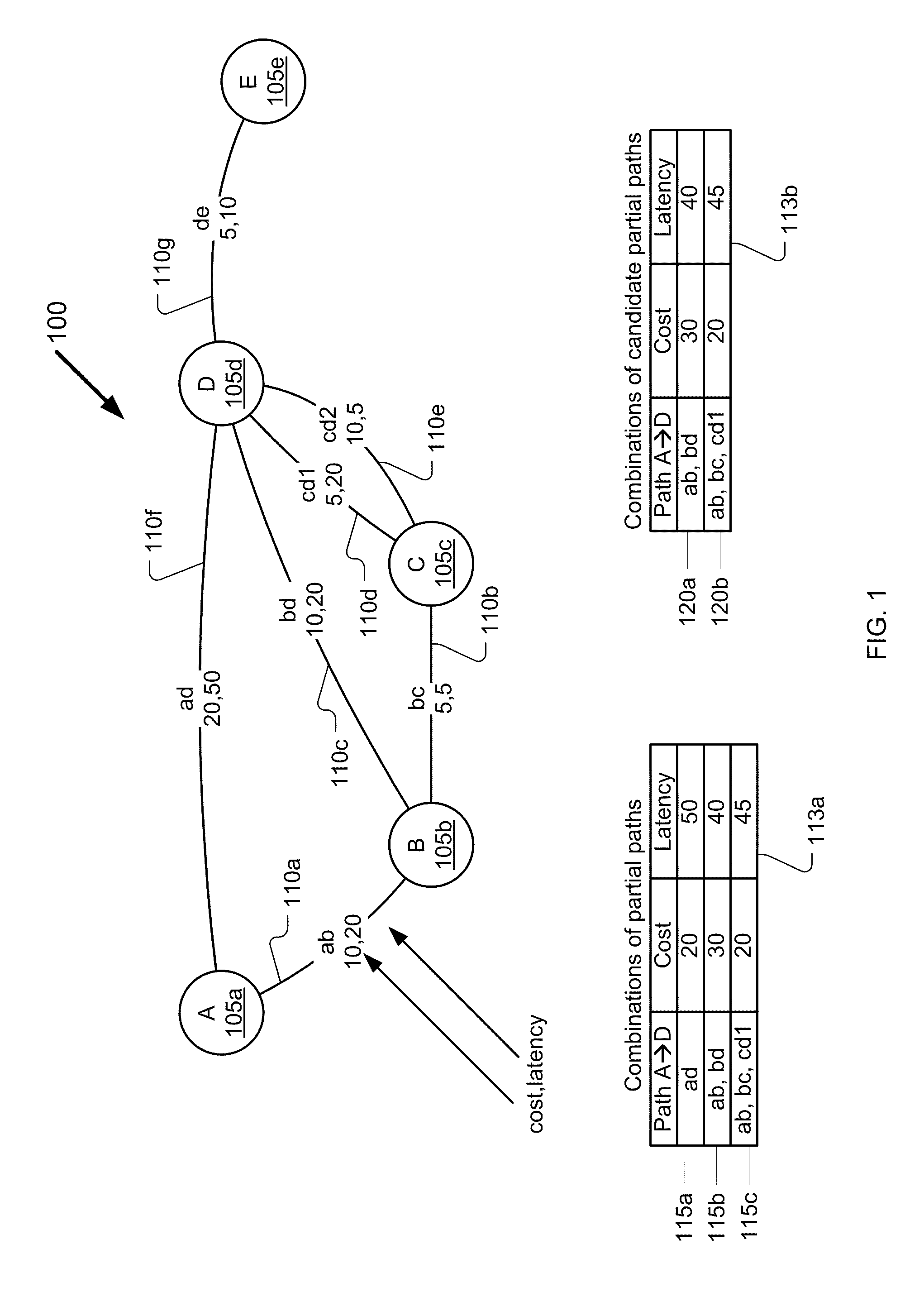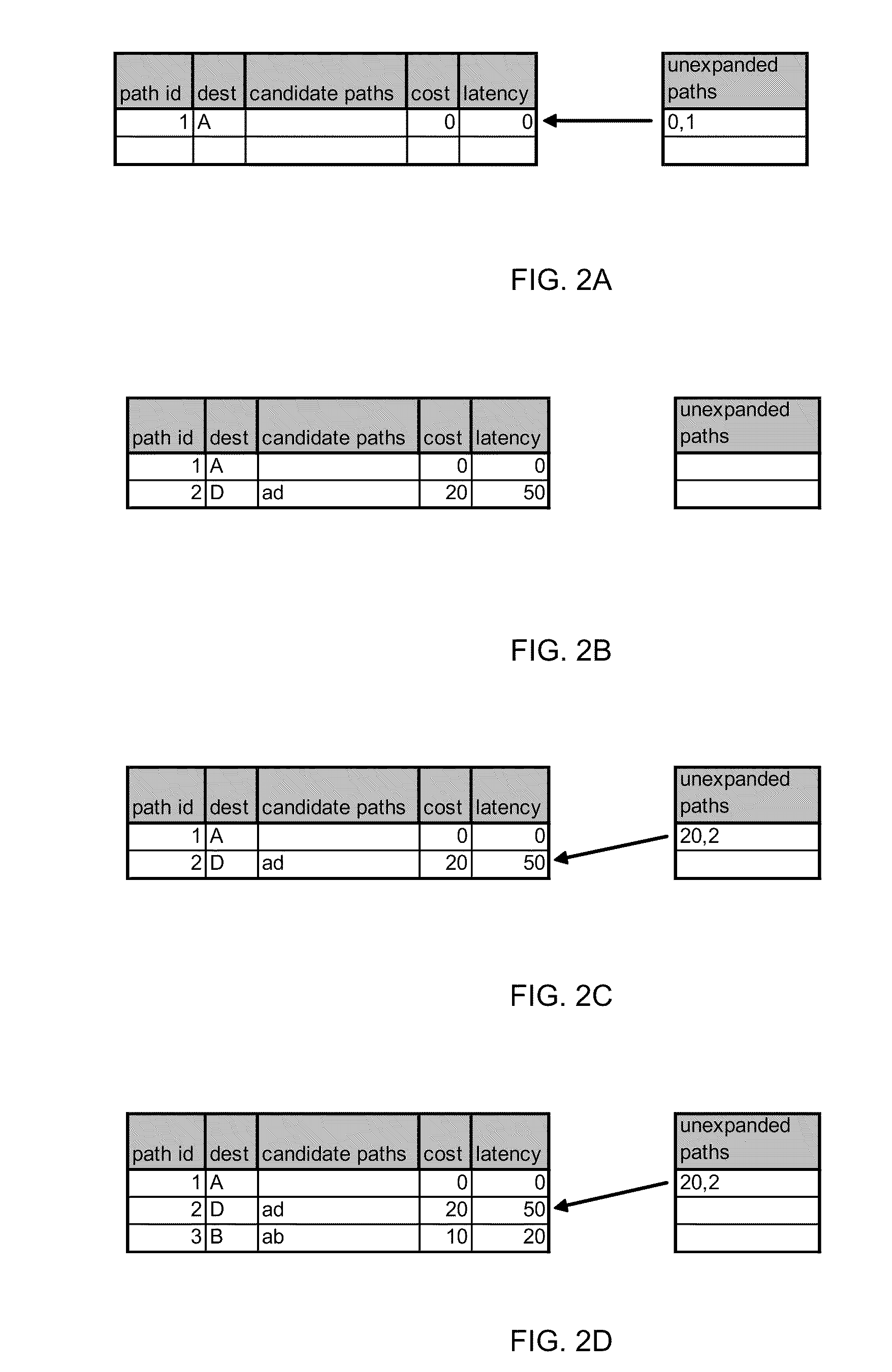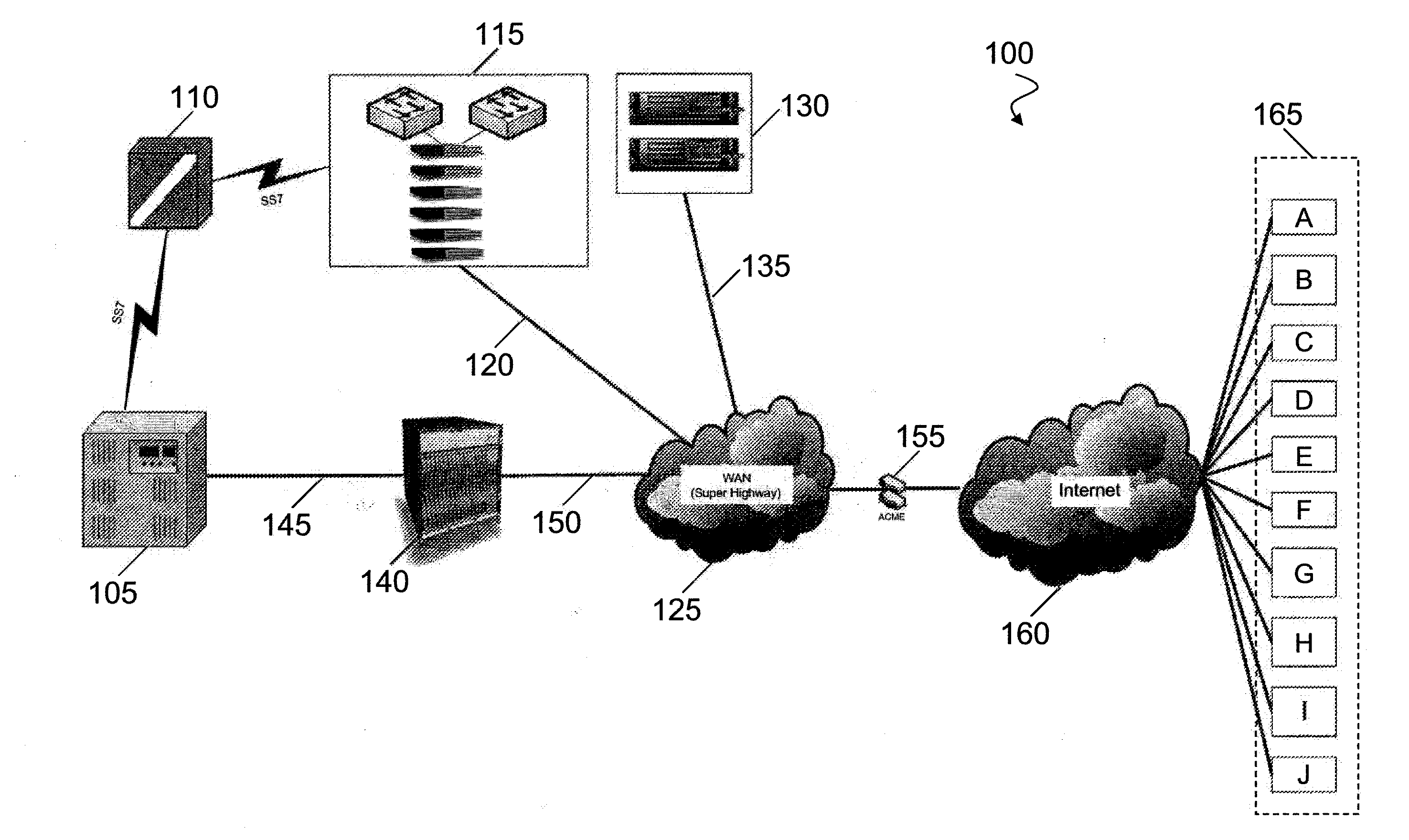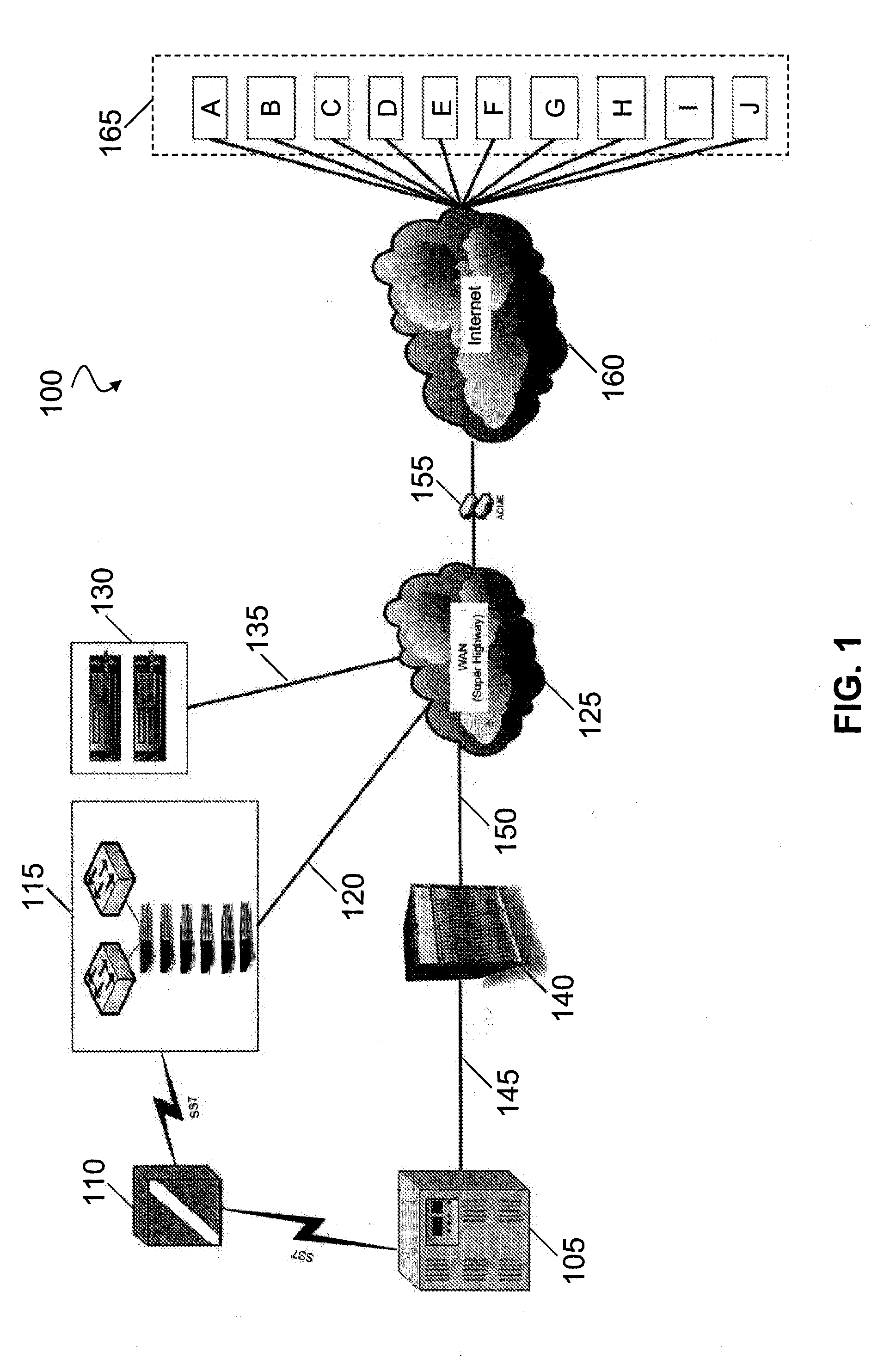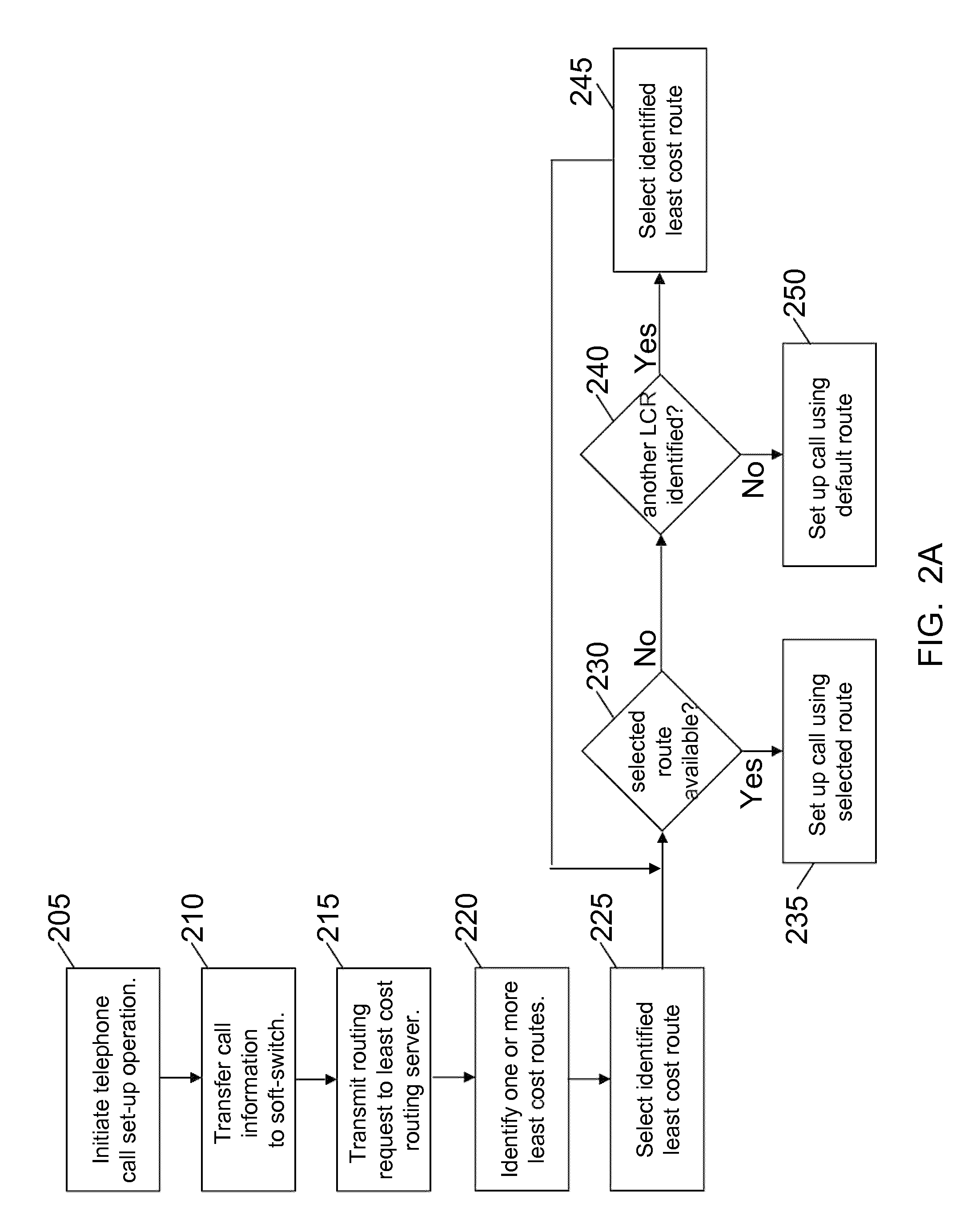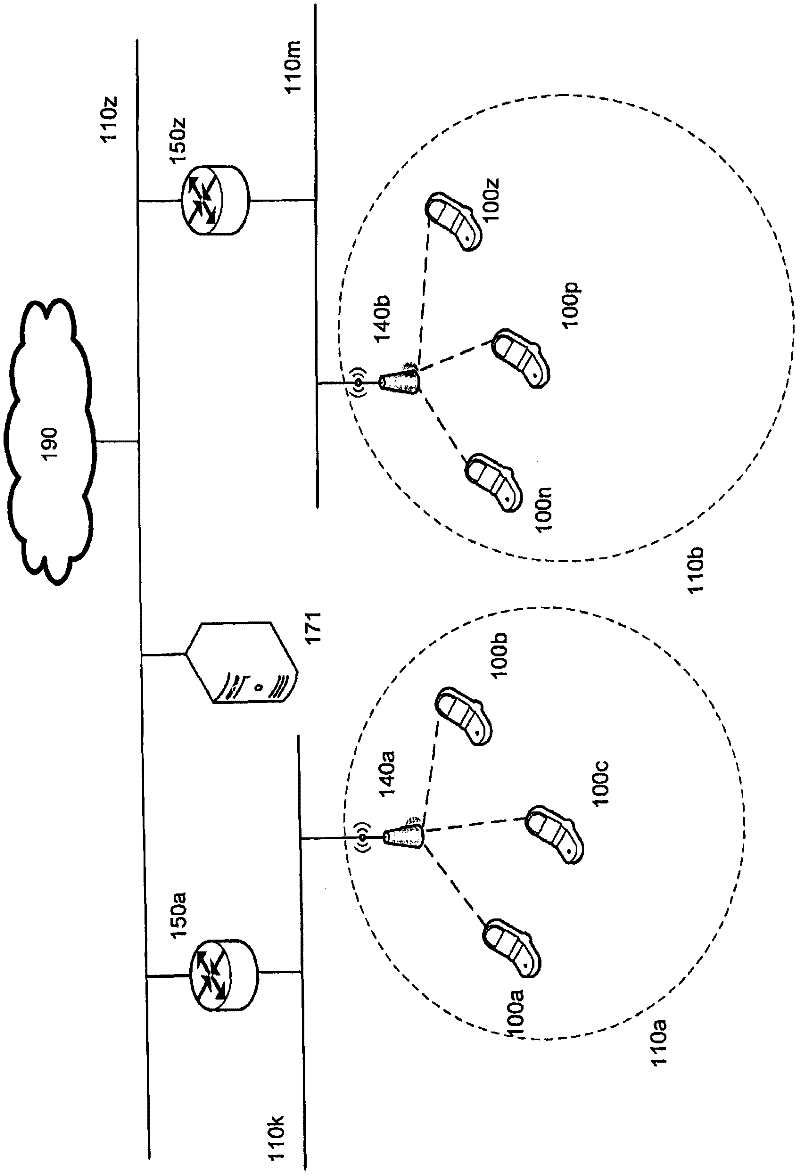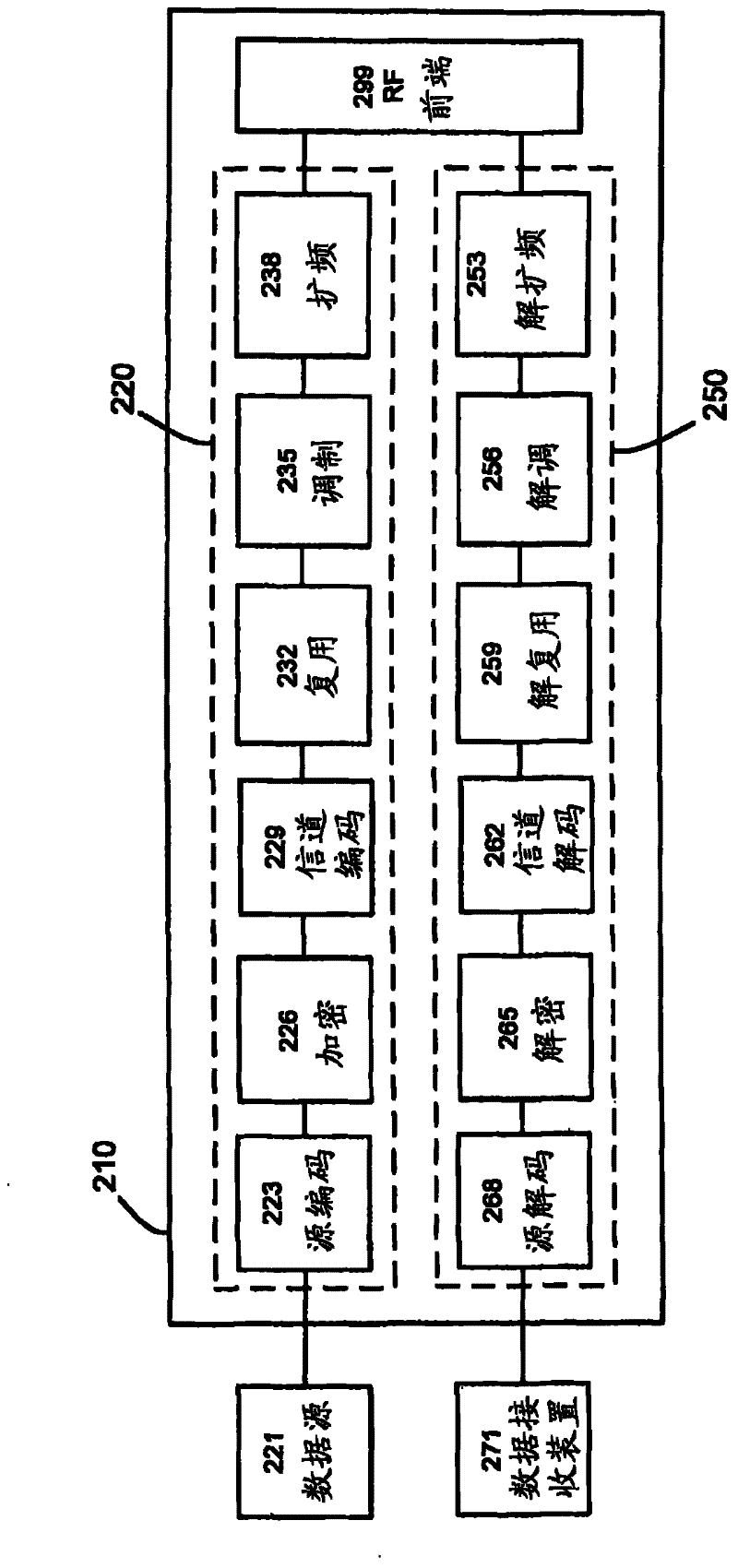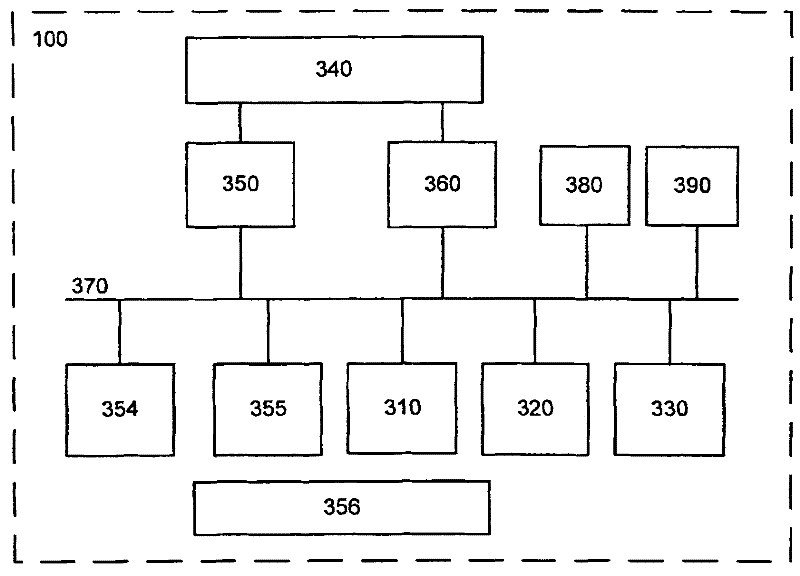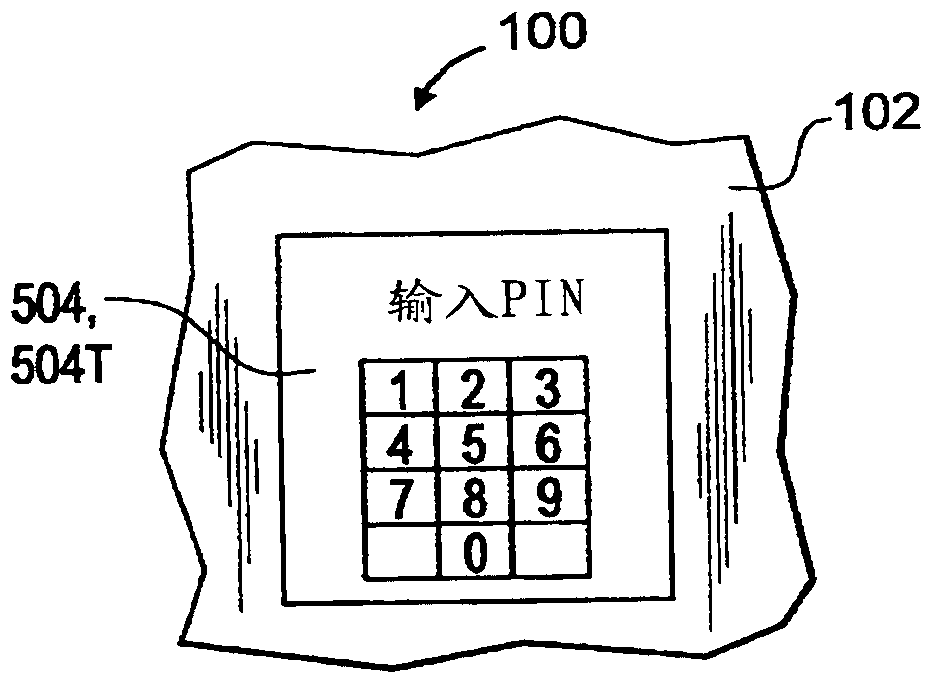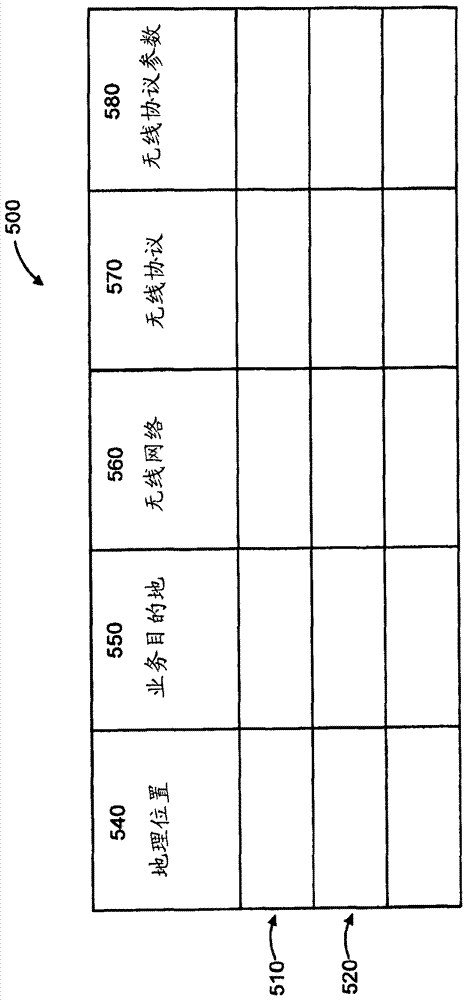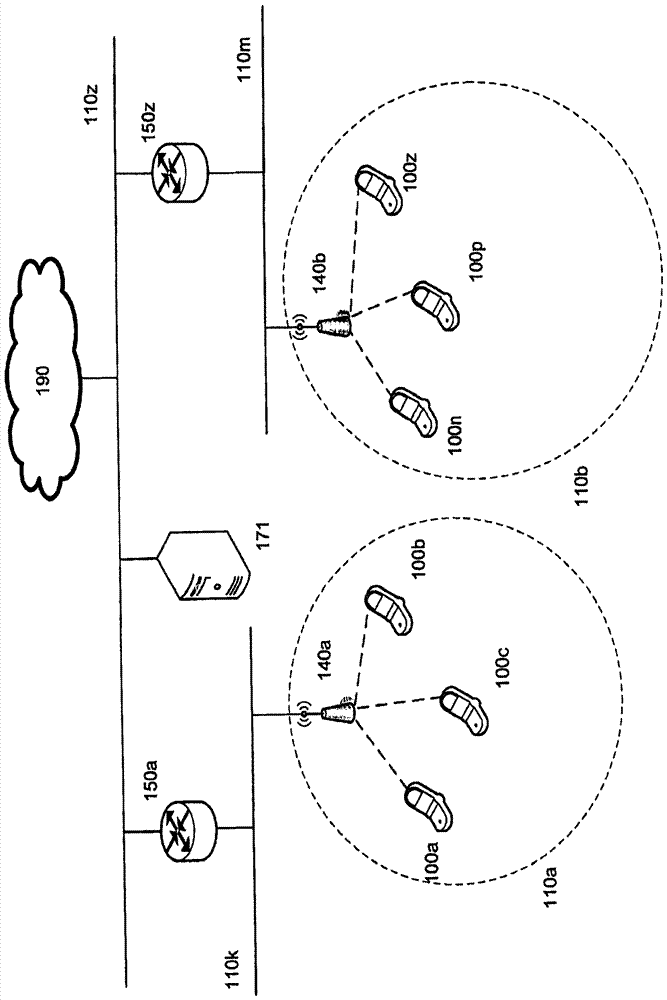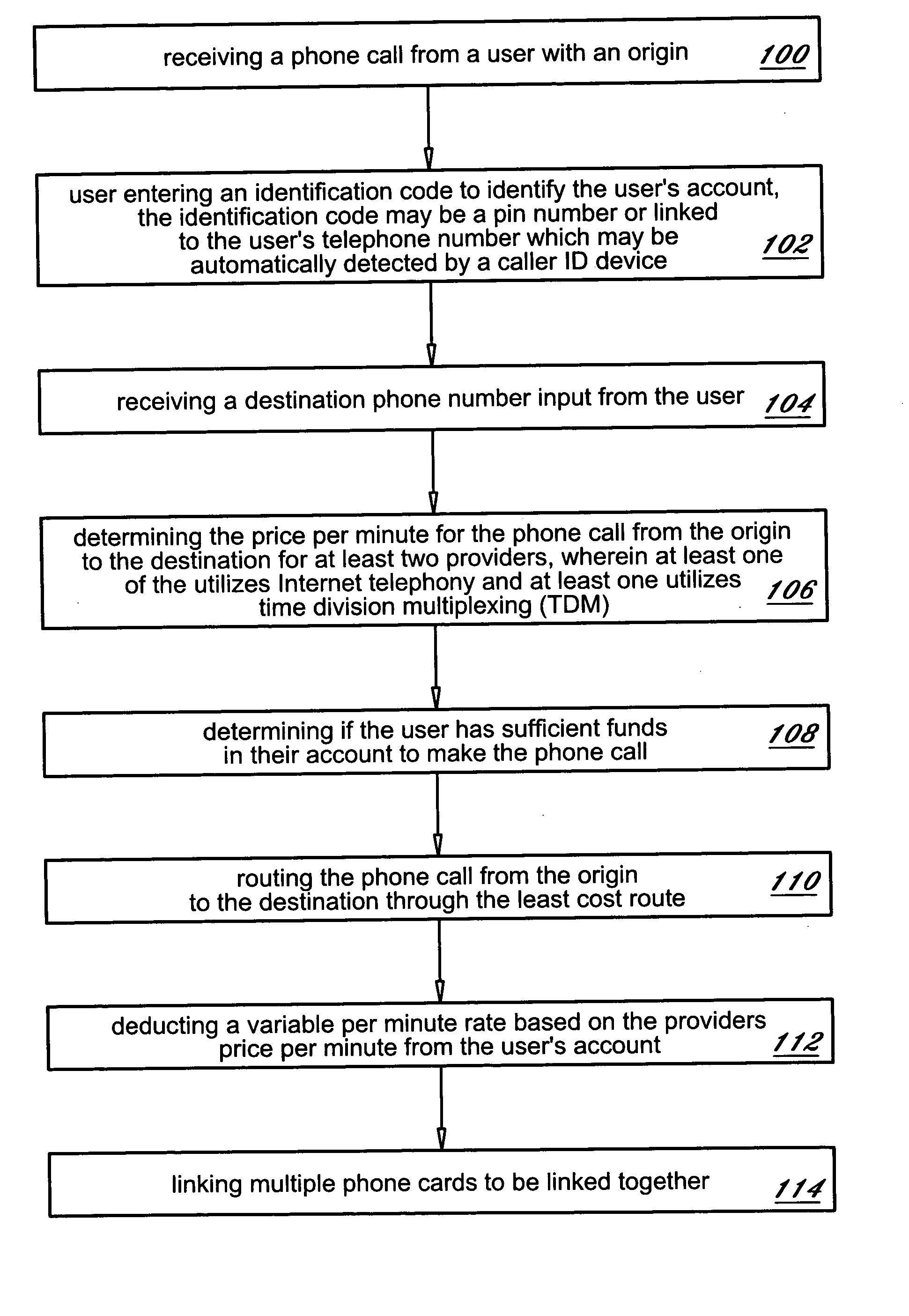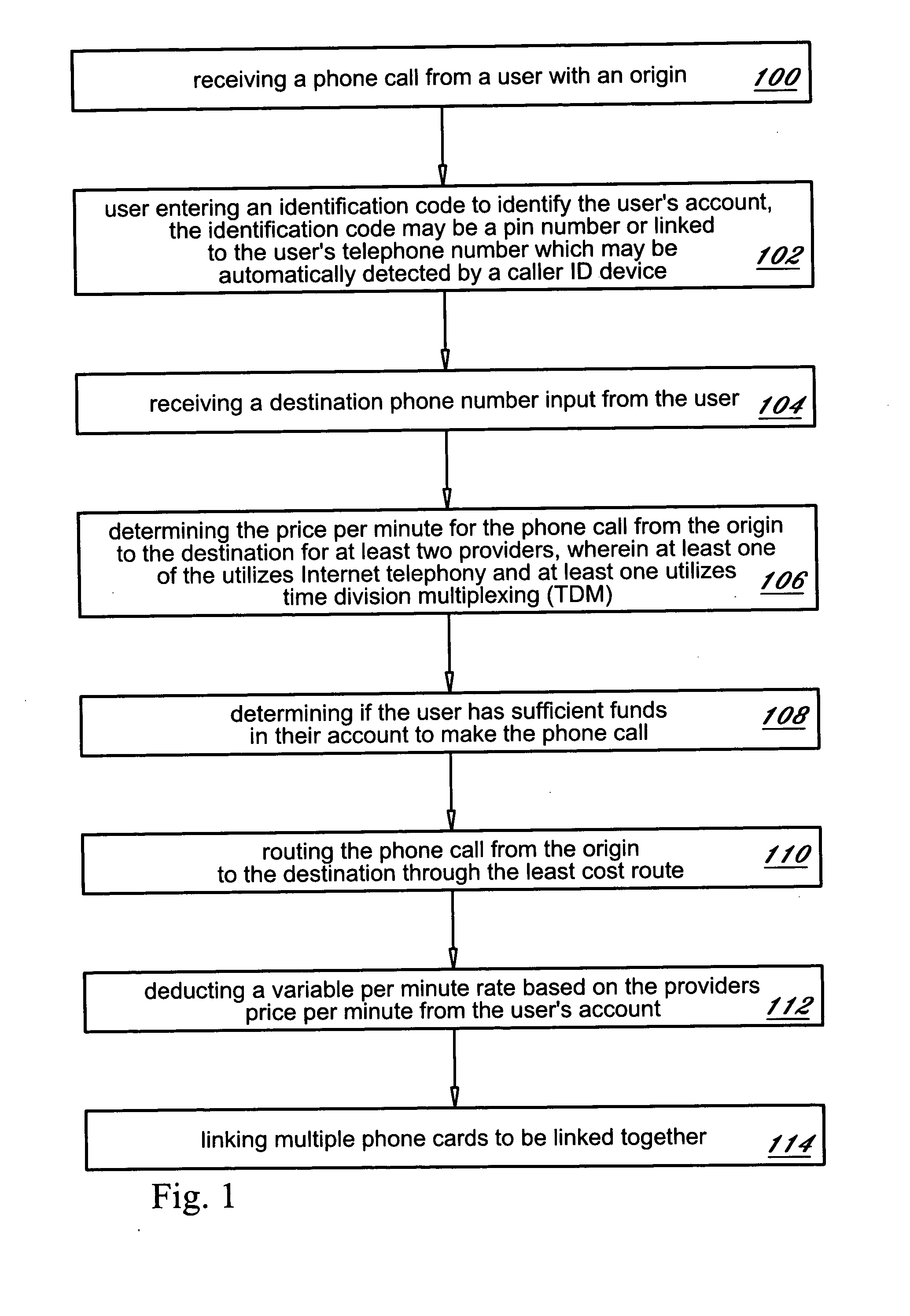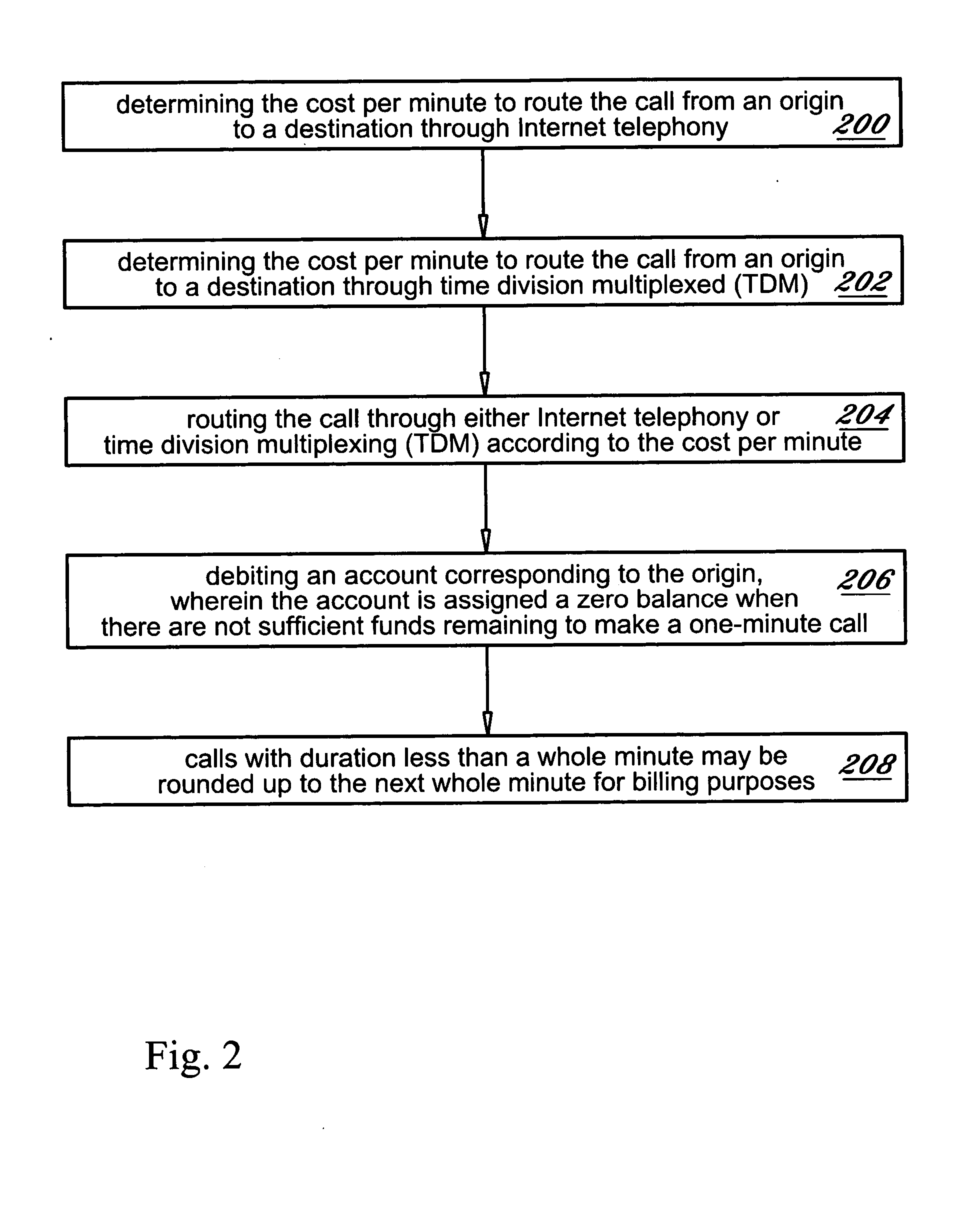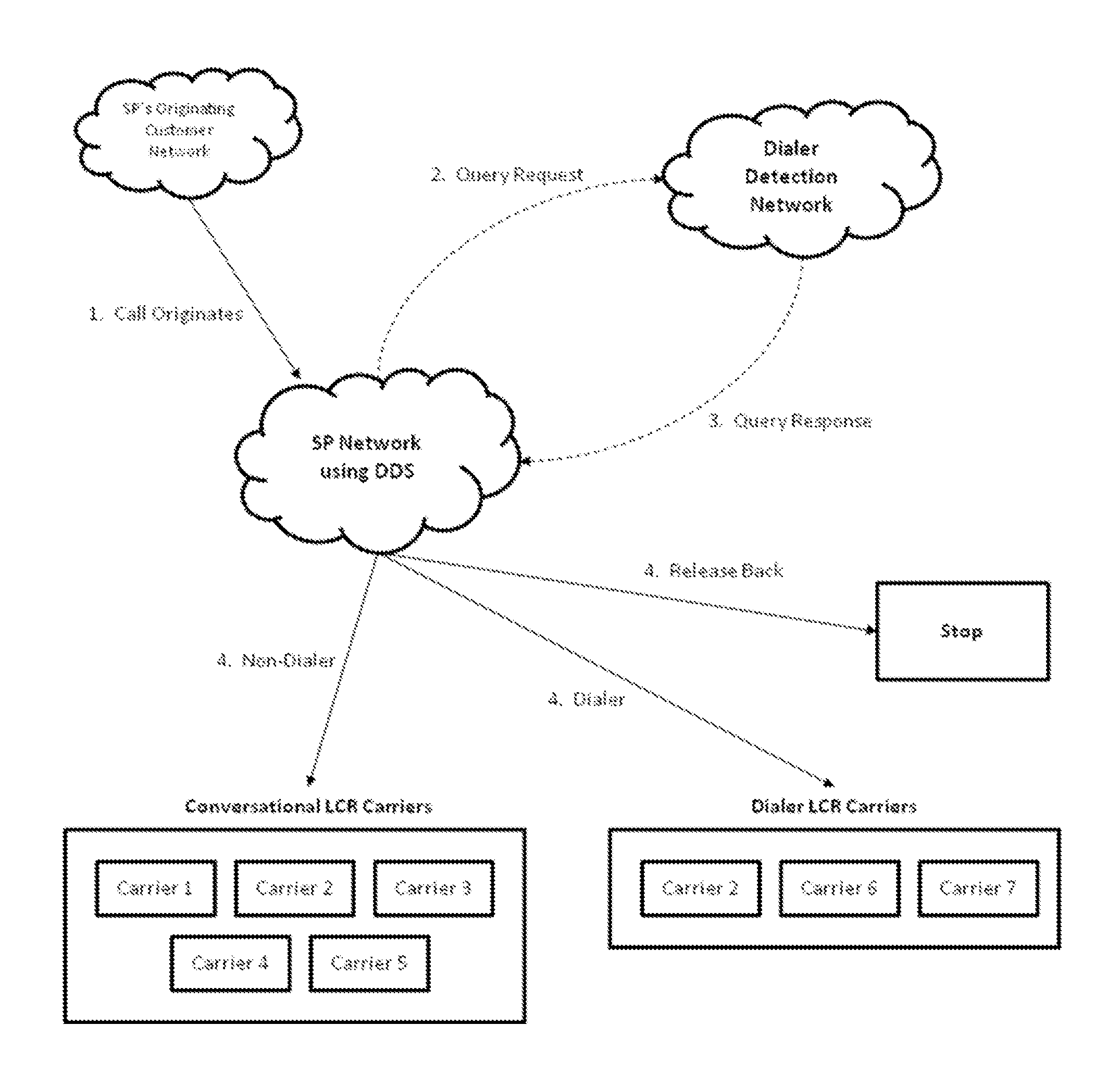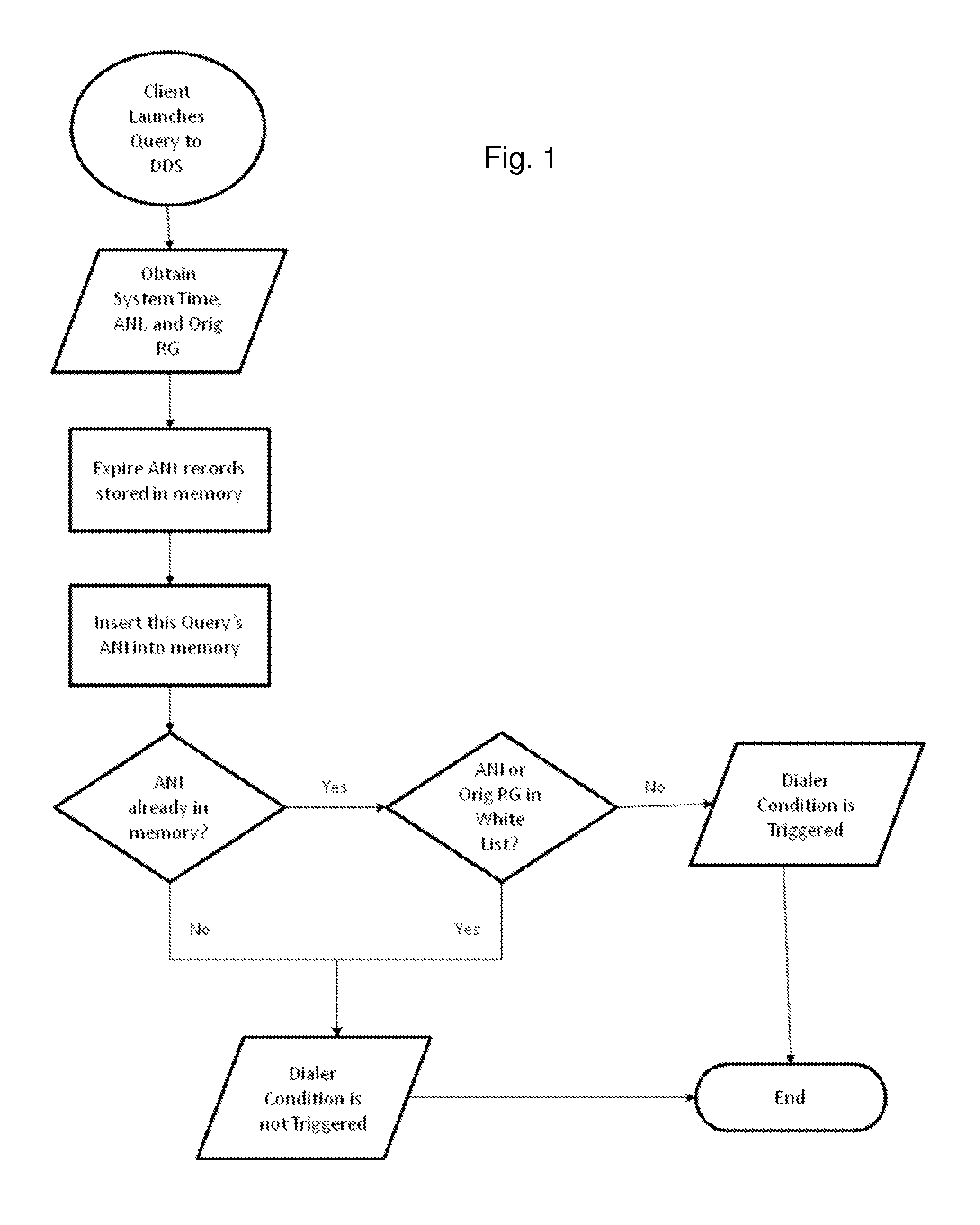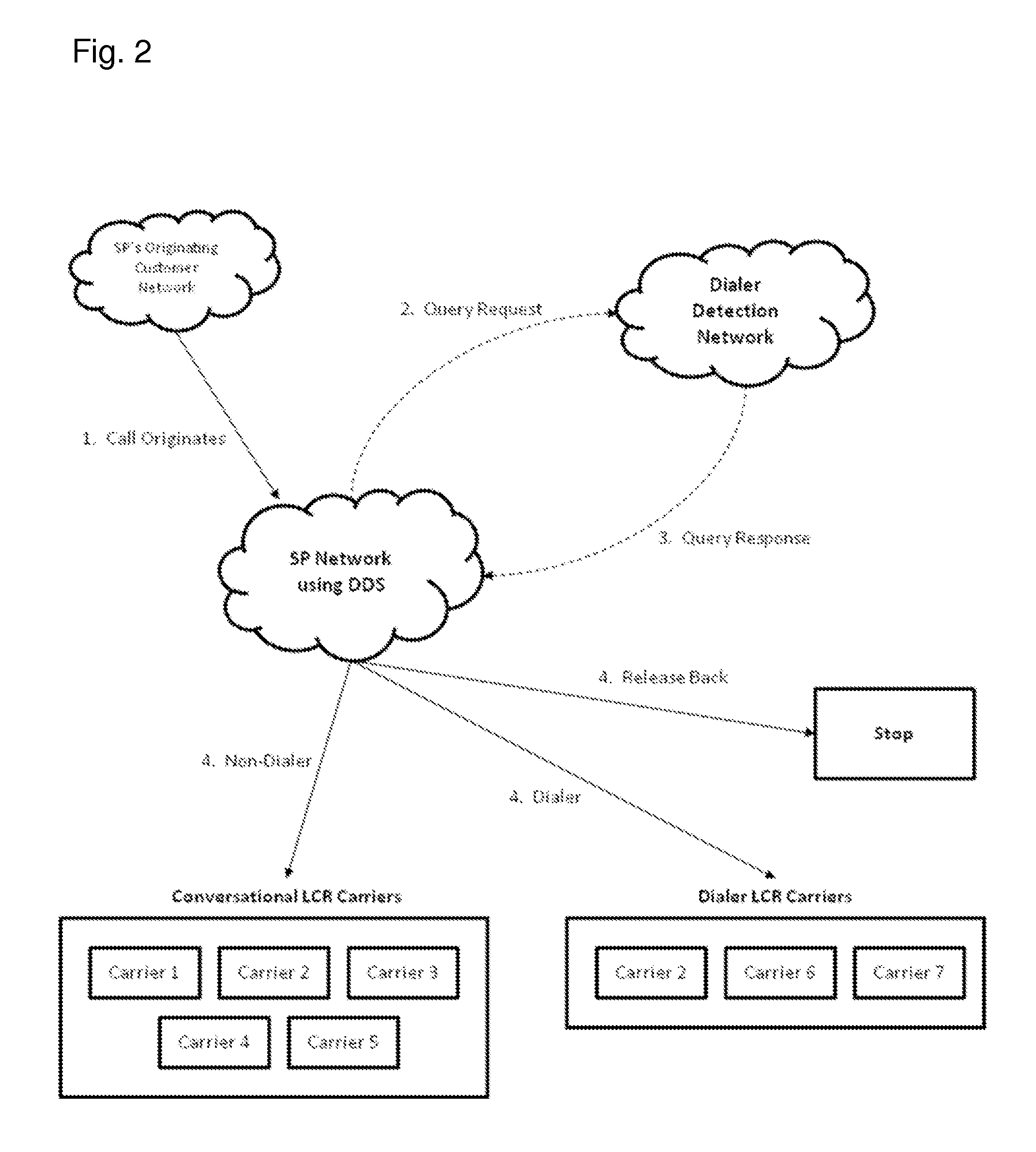Patents
Literature
35 results about "Least-cost routing" patented technology
Efficacy Topic
Property
Owner
Technical Advancement
Application Domain
Technology Topic
Technology Field Word
Patent Country/Region
Patent Type
Patent Status
Application Year
Inventor
In voice telecommunications, least-cost routing (LCR) is the process of selecting the path of outbound communications traffic based on cost. Within a telecoms carrier, an LCR team might periodically (monthly, weekly or even daily) choose between routes from several or even hundreds of carriers for destinations across the world. This function might also be automated by a device or software program known as a "Least Cost Router."
Method and system for performing a least cost routing function for data communications between end users in a multi-network environment
InactiveUS6104701ALow costLeast Cost RoutingInterconnection arrangementsError preventionPrivate networkLeast cost
A method and system for determining the best data path in a communication network is presented. A Least Cost Routing path between end users in a multi-network environment, including both public and private networks, is determined based upon a longest prefix match. At network activation time, the numbers or prefixes of numbers of end users attached to the public network (304, 305) are stored in entry node data bases A and C of the private network (303). Assuming an end user terminal U1 calls a target end user U3, an entry node B first checks for a longest prefix match between the called number and numbers already stored into its memory. If this is the first time U3 is called via node B, no match will occur and node B will then broadcast a Query to all nodes in the private network (i.e. Nodes A and C). Only those nodes providing possible access to U3 answer this Query. Node B then determines the longest prefix match with the called number amongst the various query answers, and sets the data path via that node having the longest prefix match.
Owner:IBM CORP
System and method for managing compliance with service level agreements
InactiveUS6917979B1Complete efficientlyGuaranteed levelMultiple digital computer combinationsData switching networksService-level agreementService level requirement
Compliance with subscriber job delivery requirements is managed and tracked. Job requirements set forth in service level agreements are stored electronically as delivery parameters. A queue manager creates a prioritized list of delivery jobs. A delivery manager delivers the jobs in accordance with the prioritized list. A routing manager determines optimal routes, e.g., least cost route for delivery of each job. Retries of jobs that are not successfully delivered can be performed. delivery job sources include broadcast subscribers, high- and low-priority single address subscribers, free subscribers and off-peak subscribers.
Owner:NET2PHONE
Systems and methods for multipath routing
InactiveUS20060133282A1Provides redundancyError preventionTransmission systemsBalancing networkDatapath
A method and system for directing data packets from an origin node to a destination node in a multipath communication network having a plurality of nodes, where each node is connected to at least one other node by links. The apparatus includes a processor for obtaining cost information relating to each link in the network and for determining the least-cost route between the origin node and the destination node based on the cost information relating to each link. The processor establishes a cost margin representing a range of costs above the cost of the least cost route and identifies one or more alternate routes. A data storage device stores the cost information, and a network interface selectively routes the data packets through one or more of the least cost route and the one or more alternate routes falling within the established cost margin thus balancing the network load and providing alternate data paths in case the least-cost path is unavailable.
Owner:AVAYA INC
Least Cost Routing of Fund Transfer Transactions
InactiveUS20100125514A1Improve efficiencyImprove operationFinanceDistributed computingLeast-cost routing
Owner:BANK OF AMERICA CORP
Pro-active message delivery system and method
A pro-active message delivery system which routes digitally-encoded messages via public-switched telephone networks and wide area networks to most cost-effectively deliver the messages, subject to security, privacy, and availability considerations. In a preferred embodiment of the invention, digitally encoded messages entered into a wide area network, either directly or via a public-switched telephone network, are sent to their destination using the most cost-effective route, by calculating the cost of sending the message via the available routes, and selecting the lowest cost route. Generally, the lowest cost route might use the node on the wide area network closest to the recipient of the message, or might use or node located in an area which charges off-peak rates at the time of transmission.
Owner:NET2PHONE
Dynamic Network Tunnel Endpoint Selection
ActiveUS20110083174A1Digital data processing detailsMultiple digital computer combinationsLeast costEnterprise computing
Dynamically selecting an endpoint for a tunnel into an enterprise computing infrastructure. A client dynamically selects a gateway (which may alternatively be referred to as a boundary device or server) as a tunnel endpoint for connecting over a public network (or, more generally, an untrusted network) into an enterprise computing infrastructure. The selection is made, in preferred embodiments, according to least-cost routing metrics pertaining to paths through the enterprise network from the selected gateway to a destination host. The least-cost routing metrics may be computed using factors such as the proximity of selectable tunnel endpoints to the destination host; stability or redundancy of network resources for this gateway; monetary costs of transmitting data over a path between the selectable tunnel endpoints and destination host; congestion on that path; hop count for that path; and / or latency or transmit time for data on that path.
Owner:A10 NETWORKS
Dynamic network tunnel endpoint selection
ActiveUS7992201B2Facilitate communicationMultiple digital computer combinationsProgram controlLeast costEnterprise computing
Dynamically selecting an endpoint for a tunnel into an enterprise computing infrastructure. A client dynamically selects a gateway (which may alternatively be referred to as a boundary device or server) as a tunnel endpoint for connecting over a public network (or, more generally, an untrusted network) into an enterprise computing infrastructure. The selection is made, in preferred embodiments, according to least-cost routing metrics pertaining to paths through the enterprise network from the selected gateway to a destination host. The least-cost routing metrics may be computed using factors such as the proximity of selectable tunnel endpoints to the destination host; stability or redundancy of network resources for this gateway; monetary costs of transmitting data over a path between the selectable tunnel endpoints and destination host; congestion on that path; hop count for that path; and / or latency or transmit time for data on that path.
Owner:A10 NETWORKS
Method and system for least call routing for one or more telephone calls
InactiveUS20060079237A1Easy to useImproved rateAccounting/billing servicesTelephonic communicationCall routingLeast-cost routing
A method for determining a least cost routing method for a predetermined telephone call. The method includes providing a predetermined telephone number from a handset from a geographic location and identifying more than one service provider from a plurality of service providers in a database having an access number associated geographic location to provide a first set of service providers. The method also includes identifying a destination location associated with the predetermined telephone number and determining more than one of the identified service providers have termination capability for the destination location associated with the predetermined telephone number to form a second set of service providers. The method includes determining at least one of the service providers in the second set of service providers having a selected cost information and a selected quality information associated with the predetermined telephone number from the geographic location. The method includes selecting the service provider and initiating a call based upon the predetermined telephone number using the selected service provider.
Owner:MINO HLDG
Least cost routing and matching
Systems and methods are disclosed for routing a transaction based on an assessment of costs associated with multiple payment processing networks. A transaction broker server determines how to route a received authorization request message for a transaction based on a first cost associated with processing the transaction via a first payment processing network and a second cost associated with processing the transaction via a second payment processing network. If the first cost is less than or equal to the second cost, the authorization request message is routed to the first payment processing network. If the first cost exceeds the second cost, at least one rule is applied to determine whether the first cost is to be reduced. If the at least one rule is satisfied, the first cost is reduced and the authorization request message is routed to the first payment processing network.
Owner:VISA INT SERVICE ASSOC
Method and apparatus for forwarding data in a data communications network
A method is disclosed of forwarding data in a data communications network comprising a plurality of nodes and links therebetween, each link having an associated usage cost and a load capacity. A forwarding node identifies a lowest cost route, comprising one or more links, to a destination node. If a plurality of lowest cost routes is identified, then the forwarding node allocates data for forwarding along each of the lowest cost routes dependent on a relative load capacity of that route.
Owner:CISCO TECH INC
System and method for providing least-cost routing of voice connections between home and foreign networks using voice-over-ip infrastructure
InactiveUS20100080128A1Easy to routeLow costError preventionTransmission systemsDevice registerLeast cost
A system and method are described for providing least-cost call routing for mobile wireless devices having access to voice-over-IP (VoIP) infrastructure, such as may be operated by an enterprise having global presence. Using a local wireless connection, such as a wireless local area network (WLAN), a software agent on the mobile wireless device registers with a common, enterprise-wide registrar, which, in turn, informs a VoIP gateway in the device's home region of the device's new location. The home region VoIP gateway will then re-route incoming calls for the device to a VoIP gateway serving the region in which the device is currently located. The local VoIP gateway will then route the call to the device via the WLAN. Seamless routing occurs even when the wireless device obtains a local phone number in a foreign network. Outgoing calls from the device can be routed via the VoIP infrastructure or the foreign network based on availability of service and / or cost.
Owner:MFORMATION +1
Method and system for communications routing
InactiveUS20050281199A1Increase rangeMultiplex system selection arrangementsError preventionQuality of serviceComputerized system
A method and system for communications routing provides an improved range of service quality and cost options. The method includes receiving at a host computer system an indication that a user has placed a telephone call. Next the host computer system receives from a routing database operatively connected to the host computer system both QoS criteria and cost criteria. The QoS criteria and cost criteria are then matched with empirical QoS data and least-cost routing data, respectively. A call route is then determined based on the matched QoS criteria and cost criteria with empirical QoS data and least-cost routing data, respectively. The routing database is then updated based on whether the determined call route provided an acceptable QoS.
Owner:SIMPSON GRANT M F +1
Method and means for providing scheduling for a videoconferencing network in a manner to ensure bandwidth
InactiveUS7437463B1Least costSufficient quantitySpecial service provision for substationMultiplex system selection arrangementsLeast costDistributed computing
A method and system for scheduling and conducting videoconferences that ensure that the necessary bandwidth for the videoconference will be available and that select the least cost equipment to carry the videoconference. An embodiment of the present invention includes the steps of determining for a schedule request by a user if the necessary bandwidth to conduct a videoconference will be available. Also, the embodiment measures the performance of equipment and systems used to conduct the videoconference and determines if the equipment and systems are performing at a level necessary to conduct the videoconference. Alternative embodiments may include selecting multipoint endpoints to support the videoconference, scheduling videoconferences over two independent networks, emulating routers to ensure that the least cost route for the videoconference is selected, and responding to a scheduling request by informing the user to reschedule the videoconference when the network cannot support the videoconference.
Owner:POLYCOM INC
Method and apparatus for least cost routing using multiple path accumulated constraints
ActiveUS20110170416A1Efficient searchError preventionTransmission systemsPartial pathComputer science
A cost of a path may not be the only factor in searching for a path solution in a network. For example, some applications are delay sensitive and require finding a path that does not exceed a latency constraint for the entire path. Accordingly, a method and corresponding apparatus for searching for a path solution in a network is provided that identifies combinations of partial paths that satisfy an end-to-end path constraint, compares attributes of the combinations of partial paths, prunes the combinations of partial paths based on results of the comparing to identify candidate combinations of partial paths, and selects a candidate combination of partial paths as the path solution. By pruning combinations of partial paths, considerable is saved compared to exhaustive comparing of every possible combination of partial paths and scalability is achieved.
Owner:TELLABS OPERATIONS
Least cost routing and matching
Systems and methods are disclosed for routing a transaction based on an assessment of costs associated with multiple payment processing networks. A transaction broker server determines how to route a received authorization request message for a transaction based on a first cost associated with processing the transaction via a first payment processing network and a second cost associated with processing the transaction via a second payment processing network. If the first cost is less than or equal to the second cost, the authorization request message is routed to the first payment processing network. If the first cost exceeds the second cost, at least one rule is applied to determine whether the first cost is to be reduced. If the at least one rule is satisfied, the first cost is reduced and the authorization request message is routed to the first payment processing network.
Owner:VISA INT SERVICE ASSOC
Least cost routing for mobile satellite systems employing a GPRS network infrastructure
A telecommunications network including sub-telecommunications networks for transferring information including packet data which comprises one or more mobile stations, a first sub-telecommunications network, and a second sub-telecommunications network interconnected with the first sub-telecommunications network. The network further includes a number of gateway GPRS support nodes, and one or more gateway GPRS support nodes corresponding to each of the first sub-telecommunications network and the second sub-telecommunications network. Each of the gateway GPRS support nodes is operable to provide interworking between the first and the second sub-telecommunications networks and external packet data networks. The network also includes a system controlled in accordance with a procedure for transferring packet data within a multi-country telecommunications network. The procedure includes detecting data packets corresponding to a particular mobile station routed through the first sub-telecommunications network, and detecting data packets corresponding to the particular mobile station transferred between the first sub-telecommunications network and the second sub-telecommunications network. The system and process further include determining whether to transfer routing control from the first sub-telecommunications network to the second sub-telecommunications network based on the reported routed data packets and the reported transferred data packets, when the reported transferred data packets exceed a predetermined threshold of the reported routed data packets.
Owner:COMSAT
Enhanced Least Cost Routing of Fund Transfer Transactions
InactiveUS20110246358A1Improve efficiencyImprove operationFinancePayment architectureSpeed factorComputer science
Owner:BANK OF AMERICA CORP
Payment processing system, method and computer program product
InactiveUS20110106695A1Least cost routingCost of processFinancePoint-of-sale network systemsPaymentComputer terminal
Embodiments of the present invention provide a method and computer program product for least cost routing in payment processing. In an embodiment of the invention, a payment processing method can include receiving a transaction profile for a proposed transaction as payment for a purchase by a purchaser from a merchant at a card processing terminal configured to identify a card number for a card. The method further can include computing a cost of processing the proposed transaction for each of multiple different payment processors based upon the received transaction profile. The method yet further can include selecting one of the different payment processors corresponding to a lowest cost of processing computed for the received transaction profile. Finally, the method can include routing the proposed transaction to the selected one of the different payment processors.
Owner:FERNANDEZ JORGE
Methods, systems, and computer program products for reducing signaling link congestion
ActiveUS20070014294A1Reduce congestionLow costData switching by path configurationNetwork connectionsDistributed computingComputer program
Methods, systems, and computer program products for reducing the likelihood of signaling link congestion on a failing or recovering signaling linkset are disclosed. According to one aspect, a method for reducing or eliminating congestion on a recovered link in a previously failed linkset due to the routing of post-global title (GT) translated signaling message traffic is disclosed. When the first link in a previously failed linkset becomes available, routes associated with the recovering linkset are marked as restricted. GT translated messages are directed to the lowest cost route that is marked as allowed. If no routes are marked as allowed, messages are directed to the lowest cost route that is marked as restricted. When a predetermined number or percentage of the links in a linkset become available, routes associated with the recovering linkset are marked as allowed.
Owner:TEKELEC GLOBAL INC
System and method for providing least-cost routing of voice connections between home and foreign networks using voice-over-IP infrastructure
InactiveUS8335212B2Easy to routeLow costNetwork traffic/resource managementNetwork topologiesDevice registerLeast cost
Owner:MFORMATION +1
Least cost routing interchange for b2b purchase card payments
Methods and system for processing credit card payments, comprising receiving a credit card transaction, fabricating line item data to obtain favorable interchange rates for transactions, aggregating or disaggregating payments to obtain favorable interchange rates for transactions, and automatically deciding among various interchange rate options for transactions based on criteria chosen by the payer using these methods or system.
Owner:BORA PAYMENT SYST
Method and apparatus for forwarding data in a data communications network
ActiveUS7848240B2Error preventionFrequency-division multiplex detailsLoad capacityDistributed computing
A method is disclosed of forwarding data in a data communications network comprising a plurality of nodes and links therebetween, each link having an associated usage cost and a load capacity. A forwarding node identifies a lowest cost route, comprising one or more links, to a destination node. If a plurality of lowest cost routes is identified, then the forwarding node allocates data for forwarding along each of the lowest cost routes dependent on a relative load capacity of that route.
Owner:CISCO TECH INC
Dialer Detection and Conversational Traffic Differentiation for the Purpose of Optimal Call Termination
ActiveUS20150038125A1Maximize profitabilityFavorable dialerSpecial service for subscribersCommmunication supplementary servicesCall terminationDialer
The invention is an algorithm that allows a service provider to differentiate dialer traffic from conversational traffic and to divert the dialer traffic and / or to block or release it, enabling the routing of dialer calls only to those carriers that offer favorable rate conditions for dialer traffic and conversational calls to another larger superset of least cost routing carriers. Additionally, the invention allows the service provider to block the dialer type traffic, in which case the algorithm returns a “release-back” code.
Owner:BALDRIDGE GABLE +1
System and method of providing least-cost routing of calls
InactiveUS20160050137A1Eliminate and minimize toll chargeLow costError preventionFrequency-division multiplex detailsPrivate networkThe Internet
A private network associated with an enterprise interconnects multiple points of presence (POPs) located in regions in which communications devices associated with the enterprise operate. In addition, the communications devices and POPs are each connected to the public switched telephone network (PSTN) and / or the Internet, or collectively, public network. Upon origination of a call from a device, a call management agent (CMA) on the device determines, based at least in part on the intended destination of the call, whether to allow the call to proceed conventionally over the public network, or whether to direct the call to a first POP for conveyance over the private network to a second POP, and from the second POP to the called device. The determination made by the CMA as to how to direct the outgoing call is based on minimizing the cost thereof. A call management server may be provided from which the CMA can obtain current cost and network information for use in making the aforementioned determination.
Owner:CALERO SOFTWARE
Method and apparatus for least cost routing using multiple path accumulated constraints
ActiveUS8693340B2Efficient searchError preventionTransmission systemsPartial pathDistributed computing
Owner:TELLABS OPERATIONS
Telecommunications least cost routing system
Methods, systems and apparatus for populating a least cost routing database. In one aspect, a method includes receiving from a carrier a bid for routing a telephone call to a destination; automatically loading the received bid into a least cost routing database to generate an updated least cost routing database; and making the updated least cost routing database accessible for use in determining one or more least cost routes. Further, the received bid can be analyzed to generate a projected business result and the projected business result can be presented to the carrier before loading the received bid into the least cost routing database. Additionally, input can be received from the carrier specifying an historical period and the projected business result can be generated based on data associated with the specified historical period.
Owner:AT&T MOBILITY II LLC
Network-agnostic encoded information reading terminal
InactiveCN102184376AAssess restrictionData switching networksMulti bandWireless communication protocol
A network-agnostic encoded information reading terminal can comprise a microprocessor, a memory communicatively coupled to the microprocessor, an EIR device, a multi-band antenna, and a wireless communication interface. The EIR device can be provided by a bar code reading device, an RFID reading device, and / or a card reading device. The EIR device can be configured to perform outputting raw message data comprising an encoded message and / or outputting decoded message data corresponding to an encoded message. The wireless communication interface can further comprise a radio frequency front end electrically coupled to the multi-band antenna. The wireless communication interface can be configured to support at least two wireless communication protocols. The microprocessor can be configured to execute a wireless communication protocol selector software program, which in turn can be configured to dynamically select a wireless communication network and / or a wireless communication protocol. Selection of a wireless communication network and / or a wireless communication protocol can be performed by optimizing a location-based criterion and / or a least cost routing criterion. The microprocessor can be configured to execute a system software program and / or an application software program in parallel with the wireless communication protocol selector software program switching a wireless communication network and / or a wireless communication protocol.
Owner:HAND HELD PRODS
Network-agnostic encoded information reading terminal
InactiveCN107122689AAssess restrictionData switching networksMulti bandWireless communication protocol
A network-agnostic encoded information reading terminal comprises a microprocessor, a memory communicatively coupled to the microprocessor, an EIR device, a multi-band antenna, and a wireless communication interface. The EIR device is provided by a bar code reading device, an RFID reading device, and / or a card reading device. The EIR device is configured to perform outputting raw message data comprising an encoded message and / or outputting decoded message data corresponding to an encoded message. The wireless communication interface comprises a radio frequency front end electrically coupled to the multi-band antenna. The wireless communication interface is configured to support at least two wireless communication protocols. The microprocessor is configured to execute a wireless communication protocol selector software program, which in turn is configured to dynamically select a wireless communication network and / or a wireless communication protocol. Selection of a wireless communication network and / or a wireless communication protocol is performed by optimizing a location-based criterion and / or a least cost routing criterion. The microprocessor is configured to execute a system software program and / or an application software program in parallel with the wireless communication protocol selector software program switching a wireless communication network and / or a wireless communication protocol.
Owner:HAND HELD PRODS
Methods and systems for least cost routing of communications providing low dollar amount cards
InactiveUS20050030938A1Least costData switching by path configurationPrepayment with prepaid account/card rechargingCost effectivenessRound complexity
The present invention provides systems and methods for routing a communications (such as a telephone call) through the most cost effective route. The method may comprise the steps of: determining the cost per minute and complexity in routing said call from an origin to a destination through Internet telephony; determining the cost per minute and complexity in routing said call from an origin to a destination through time division multiplexed (TDM); routing said call through either said Internet telephony or said time division multiplexing (TDM) according to said cost per minute and said complexity of route.
Owner:BARR HAROLD
Dialer detection and conversational traffic differentiation for the purpose of optimal call termination
ActiveUS9270819B2Maximize profitabilityFavorable dialerInterconnection arrangementsAutomatic exchangesCall terminationDialer
The invention is an algorithm that allows a service provider to differentiate dialer traffic from conversational traffic and to divert the dialer traffic and / or to block or release it, enabling the routing of dialer calls only to those carriers that offer favorable rate conditions for dialer traffic and conversational calls to another larger superset of least cost routing carriers. Additionally, the invention allows the service provider to block the dialer type traffic, in which case the algorithm returns a “release-back” code.
Owner:BALDRIDGE GABLE +1
Features
- R&D
- Intellectual Property
- Life Sciences
- Materials
- Tech Scout
Why Patsnap Eureka
- Unparalleled Data Quality
- Higher Quality Content
- 60% Fewer Hallucinations
Social media
Patsnap Eureka Blog
Learn More Browse by: Latest US Patents, China's latest patents, Technical Efficacy Thesaurus, Application Domain, Technology Topic, Popular Technical Reports.
© 2025 PatSnap. All rights reserved.Legal|Privacy policy|Modern Slavery Act Transparency Statement|Sitemap|About US| Contact US: help@patsnap.com



